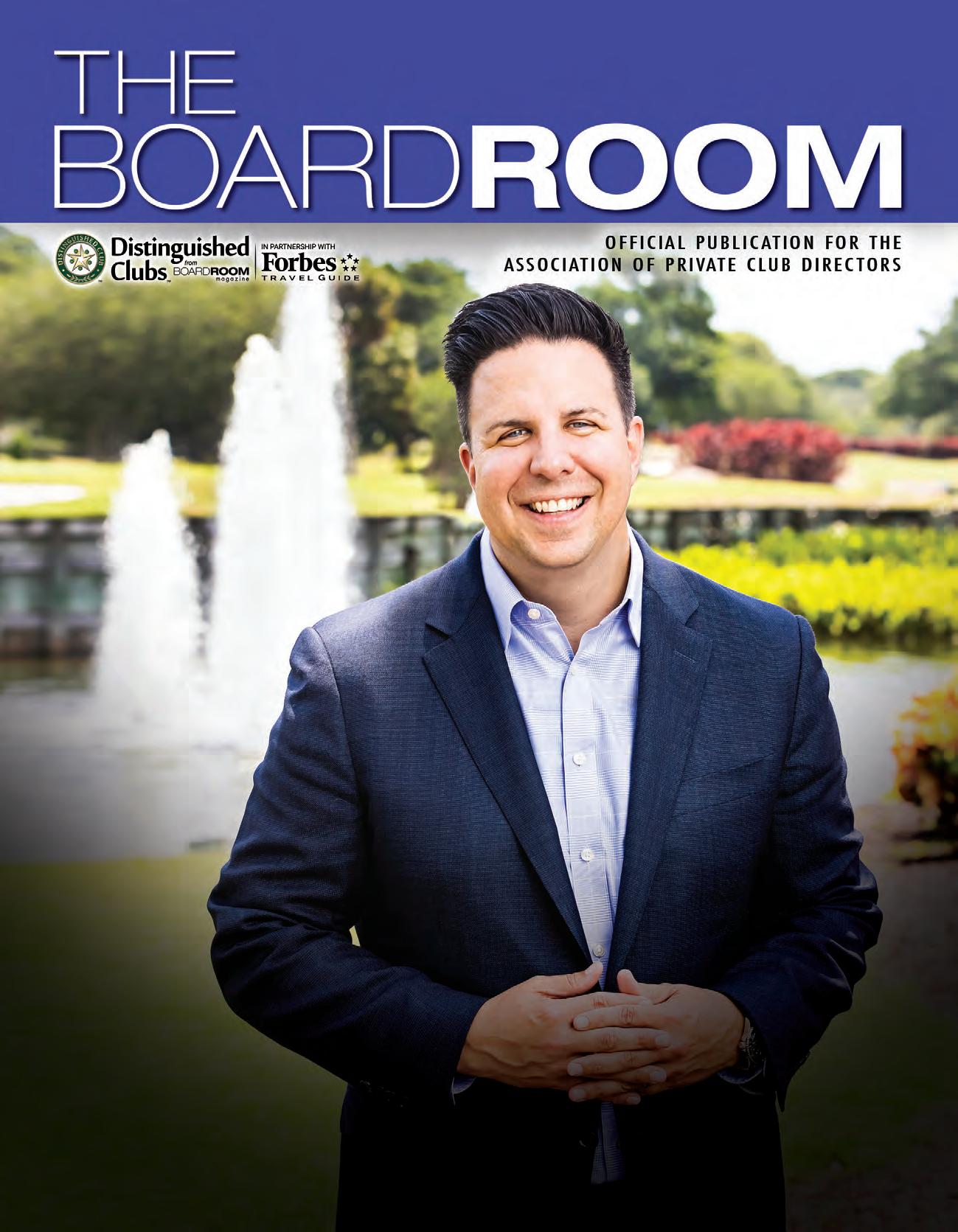


EDITOR’S NOTE

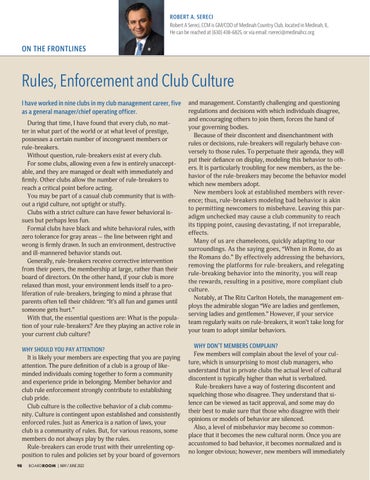




DAVE WHITE
Dave White is the editor of BoardRoom magazine. If you have comments on this article or suggestions for other topics, please send Dave an email to: dave@boardroommag.com.
Many segments or offshoots comprise the hospitality industry, ranging from hotels, resorts, golf clubs and the private club industry. And often hear of people making the transition from one segment to another as they make career changes.
That’s the situation for Greg Devino, now general manager/COO of Broken Sound Club in Boca Raton, FL. And Greg’s experience in making the transition is highlighted in our cover story for this May/June BoardRoom.
As a 40-year-old, Devino has willingly moved back and forth between the hotel and private club industries with an important goal the objective: to be a private club general manager by the time he hit 40.
“Over my 13 years in hospitality, I’ve been fortunate to have many wonderful mentors guiding me, professionals who understand and inspire hospitality in others. So, the transition to the club industry has been a natural progression. Both professions are service based,” said Greg, and his latest move to Broken Sound has also allowed him to relocate to South Florida, where he aspires to raise his family. And along the way, Devino says he has benefited from the outstanding service training programs available through major hotel brands such as The Ritz-Carlton.
And he suggests that while for years hotel managers and club managers have been viewed as separate roles, they are the one and the same.” Both roles share the same core values. I brought my core values– honesty, integrity, trust and creativity – motivation and passion from the hotel industry to the club industry.
But the bottom line remains the same: “I’m thrilled to see many former hoteliers thriving in the club industry. It has allowed board members, presidents and executive teams to think differently. Some of my mentors and peers come from a variety of different backgrounds. However, we all share one common core value – we love taking care of people and creating memories,” Devino shared.
n n n
John Fornaro’s Publisher’s Perspective this issue delves into another facet of club reality...micromanagement.
A private club’s success is tied directly to the quality of the club’s board of directors. Clubs today need an informed, educated, dedicated and focused board of directors, and that starts even before the board sits down for its first meeting after club elections.
But there’s an elephant lurking in the background...the scourge of micromanagement, a subject with which many
in the private club management world are all too familiar. Fornaro poses the question: Really, what does micromanagement mean?
“In a nutshell, it means anyone (board member, committee member or club member) trying to direct management or staff other than the GM/COO or their direct reports/staff,” says Gordon Welch, president of the Association of Private Club Directors.
And “according to Webster’s Dictionary, micromanagement means management or managing especially with excessive control or attention to details or control with excessive attention to minor details,” said Michael McCarthy, CEO of Addison Reserve Country Club, Delray Beach, FL.
Regardless of which definition fits your bill, micromanagement is a prevalent and destructive disease with disastrous effects for private clubs.
But there are solutions and Fornaro’s publisher’s perspective articulates some of the solutions. It’s a must-read for anyone involved in the private club industry.
n n n
“Frank has contributed to our industry through his leadership, research, education and organizational skills and achievements. He stands out from others for his kindness, generosity, keen intelligence and valuable contributions to those he serves.”— John Fornaro, CEO and Publisher, BoardRoom.
And because of this tremendous contribution to the private club industry Frank Vain, president of the McMahon Group, is the recipient of the BoardRoom magazine Lifetime Achievement Award for 2021. And who better to write about Vain’s achievement than the man with whom he has worked for 34 years...William McMahon, Sr. As well, it marks the first time two people from the same company have been selected for their lifetime achievements, with McMahon himself receiving the award in 2013.
n n n
Finally, we continue with our tip president series featuring Charles “Chuck” Cramb, President, Wianno Club, Osterville, MA; Chris D. Crawshaw, President, Westmoreland Country Club, Wilmette, IL; Ron Drapeau, President, Wyndemere Country Club, Naples, FL, and Jaime K. Eaton, President, Atlantic Beach Country Club, Atlantic Beach, FL. BR
Publisher/CEO
John G. Fornaro
Editor
Dave White
Assoc. Editor/VP Creative
Heather Arias de Cordoba
Copy Editor
Chryssoula Filippakopoulos
Innovative Ideas Editor
Heather Arias de Cordoba
APCD Executive Director
Bill Thomas
Editorial & Marketing Director
Dee Kaplan
Business Development
Joshua Nuzzi
Accounting/Subscriptions
Ronni Dana
Contact Information
www.BoardRoomMagazine.com www.apcd.com (949) 376-8889
Featured Columnists
Mary F. Dolan
John G. Fornaro
Steve Graves
Philip J. Harvey
Contributing
Matthew D. Anderson
Heather Arias de Cordoba
Ronald Banaszak
Rita Barreto
Jason Becker
Nancy Berkley
Bill Boothe
Kris Butterfield
Jarrett Chirico
Ronald F. Cichy
Trevor Coughlan
Michael Crandal


Bonnie J. Knutson
Steve Mona
Gregg Patterson
Robert A. Sereci
Whitney Crouse
Paul Dank
Henry DeLozier
Greg Devino
Dave Doherty
Ed Doyle
John R. Embree
Jonathan Gold
Larry Hirsh
Dean Kandle
David W. Lacey
Lynne LaFond DeLuca



Co-Founder/CEO
John G. Fornaro
President
Keith Jarrett
Chief Analyst
Frank Gore
Chief Information Officer
Jeff Briggs
Executive Director
Bill Thomas
Executive Assistant/ Director of Support
Joshua Nuzzi Contact Information www.DistinguishedClubs.com (949) 376-8889

Robyn Stowell
Thomas B. Wallace III
Dave White
Bradley C. Wilks

Christy Latimore
William P. McMahon, Sr.
Pamela Radcliff
Duncan Reno
Ted Robinson
Bill Schwartz
Robin Shelton
Jason Straka
Bryan Webb
Gordon Welch
Dick Yemm
















PUBLISHER’S PERSPECTIVE | 10

BY JOHN G. FORNARO
In a nutshell, it means anyone (board member, committee member or club member) trying to direct management or staff other than the GM/COO or their direct reports/staff. Often, this excessive obsession with the minutest of details causes a direct management failure because of the ability to focus on the major details.
EXECUTIVE COMMITTEE | 16

BY PHILIP J. HARVEY
The Congressional Budget Office forecasts the U.S. labor force will grow by 0.2 percent a year from 2024 to 2031. Attracting and retaining top talent will become more competitive across all industries, but what does it mean for the club industry specifically? The seasonality of golf adds an extra layer of complexity to the staffing crisis.
MEMBERSHIP MUSINGS | 76

BY BONNIE J. KNUTSON
Like many of you, there are certain early childhood memories I remember more vividly than others. In fact, one study suggests that, on average, the earliest memories that people can recall point back to when they were just 2 ½ years old. For me, one of my strongest early recollections is having Sunday night family dinner at Nonno’s (Italian for grandfather) house…

BY ROBYN STOWELL
If you are a 501(c)(7) tax exempt club, you file a Form 990. The questions include: “Did the organization have a written document retention and destruction policy?” These questions address whether the entity has “good corporate hygiene.” Does the IRS think a lack of corporate policies implies you cut corners elsewhere?


BY THOMAS B. WALLACE III AND STEVE GRAVES
We want club leaders to be prepared for changing tides, not sitting just back enjoying the smooth seas. The most respected leaders emerging from the challenges of 2020 were proactive, strategic thinkers who actively planned for and anticipated the future. These traits will remain essential for club leaders going forward.
| 98

BY ROBERT A. SERECI
I have worked in nine clubs in my club management career, five as a general manager/chief operating officer. During that time, I have found that every club, no matter in what part of the world or at what level of prestige, possesses a certain number of incongruent members or rulebreakers. Without question, rule-breakers exist at every club.
EXECUTIVE COMMITTEE | 14

BY STEVE MONA
When was the last time you reviewed your club’s policy on outside events? We’re talking about events like banquets and tournaments that occur on club grounds but are not organized by the club for the members. If that hasn’t been done within the last year or so, it’s probably something you should plan to tackle soon.
CLUB FACTS & FIGURES | 70


KEY MAN POLICIES: LOWERING A CLUB’S RISK PROFILE AND RAISING EMPLOYEE RETENTION
BY BRADLEY C. WILKS AND MARY F. DOLAN
Retaining top talent isn’t usually something that’s talked about in connection with insurance. Yet, if something were to suddenly happen to the general manager or head groundskeeper, a club’s operations and management would be substantially impacted. Protecting the club’s most valuable assets – its core people – becomes a topic for discussion in the context of insurance coverage.
TRIBAL MAGIC | 114

BY GREGG PATTERSON
Lost your job recently or know someone who has? Got the axe in spite of brains, experience and a fluency in numbers, administration and operations? Failed to sell a great idea? Chances are politics had something to do with your victories and defeats. Politics — the art of decision-making within a group or community when there are conflicting opinions about the decision to be made.


TECHNOLOGY
Bill Boothe
EXCELLENCE

Henry DeLozier
F&B SHOWCASE ................ 50-51
Just for Chefs: FOOD-TRAK’s Automated Production Plans by Station By Bill
Schwartz
EXECUTIVE SEARCH SHOWCASE 52-53 Golf Business Network (GBN) University By Dean Kandle
PERSONAL DEVELOPMENT 74
Polish Your Passion for Leadership By Rita Barreto
NANCY’S CORNER ................. 78
Polish Your Passion for Leadership By Nancy Berkley
DISTINGUISHED
CLUBS SHOWCASE ............. 80-89
Desert Mountain Scioto Country Club Innisbrook By Ronald Banaszak
INTELLIGENCE GATHERING AND INVESTIGATIONS AGENCY SHOWCASE 96 Member Vetting and the Duty of Care By Paul Dank
ON THE FRONTLINES 105 Defining the Premier Country Club By Duncan Reno
INNOVATIVE IDEAS ............ 110-113 Champions Run Farmington Country Club
Houston Racquet Club The Country Club at Mirasol By Heather Arias de Cordoba
DISTINGUISHED CLUBS 116 To Give or Not to Give By Robin Shelton




PUBLISHER’S PERSPECTIVE

John G. Fornaro is the publisher/CEO of BoardRoom magazine, co-founder/CEO of Distinguished Clubs and the CEO of the Association of Private Club Directors (APCD). If you have comments on this article or suggestions for other topics, please contact John Fornaro at (949) 376-8889 or via email: johnf@apcd.com
“Let me share a real-life story with you,” pitched Gordon Welch, president of the Association of Private Club Directors.
“A young 26-year-old general manager just started at his first club, working his tail off trying to complete a renovation and prepare a budget for a club he doesn’t know much about. This young GM doesn’t know how to say ‘no’ yet.
“He has a very strong president who controls the board in the boardroom. The house committee chair has just enough restaurant experience to be dangerous and wants to ‘help’ the general manager. The house committee chair has good intentions!
“According to Webster’s Dictionary, micromanagement means management or managing especially with excessive control or attention to details or control with excessive attention to minor details,” said Michael McCarthy, CEO of Addison Reserve Country Club, Delray Beach, FL.
“Often, this excessive obsession with the minutest of details causes a direct management failure because of the ability to focus on the major details. In many clubs, both paid leaders and volunteer leaders fall victim to people that can’t help themselves from being micromanagers. Paying attention to the small details is most important. However, those tasks need to be developed and constantly embedded in the
I started BoardRoom magazine 26 years ago to replace emotion with facts and with the objective of reducing micromanaging. Your board must be informed and updated regularly about the club industry and the many challenges a GM faces in running a successful club. Start by informing your committee members, not just the board members. Some committee members will be on the board one day, and some will become your board president.
“For the next year, the GM receives between two and five calls every day the club is open. ‘Yes, the house chair called me at least two times a day and some days five! What in the world did he want so many times a day? I had a great history of food and beverage, even at that age. Some days he called to tell me about an article he read, some hearsay or something he saw on the Food Network,’ the GM related.
“‘I was so frustrated that I didn’t know what to do! But, as a young professional, I stuck it out and learned things from all his questions. However, a tenured GM probably wouldn’t stay at that club very long. The emotional impact and frustration are just too great,’” Welch explained of his discussion with the young GCM.
So, what does micromanagement mean, really, and what is the cost and loss of productivity because of micromanagement?
“In a nutshell, it means anyone (board member, committee member or club member) trying to direct management or staff other than the GM/COO or their direct reports/staff,” espoused Welch. And in more detail, what does it mean?
team’s philosophy. If those details are being met, and there is still micromanagement happening, my best advice would be to eliminate the micromanager,” McCarthy opined.
There is some consensus about that meaning.
“At a practical level, the term ‘micromanagement’ suggests that supervisors unduly influence the work of subordinates. In private clubs, micromanagement usually applies to directors who become overly involved in operational matters - often forgetting the director’s primary duties,” explained Henry DeLozier, partner with GGA Partners, an international consulting firm.
“Micromanagement is often used as a pejorative description of board members’ behavior that is meddlesome - while well-intended - and counter-productive in many cases,” he added.
“Typically, when we see micromanagement in the private club industry, it’s a case of a club president wanting to engage actively in operational issues that should be in the domain of the general manager and club department heads.



ROBYN STOWELL
Robyn Nordin Stowell is an attorney with Spencer Fane whose practice is focused on the private club industry. She may be reached at (602) 333-5467 or rstowell@spencerfane.com.
Your club should have a document retention policy and you should follow it. Here are compelling reasons why.
Form 990. If you are a 501(c)(7) tax exempt club, you file a Form 990. The questions include: “Did the organization have a written document retention and destruction policy?”
I spoke with an IRS representative involved in updating the Form 990 who said these questions address whether the entity has “good corporate hygiene.” Does the IRS think a lack of corporate policies implies you cut corners elsewhere? Possibly, so why risk it. Answer yes, but first have the policy in place.
Confidentiality. When a club requests my assistance with a member discipline matter or contract dispute with a member, I ask for the entire membership file. Sometimes that includes multiple letters over the years that are immaterial.
I have also seen years-old letters for and against a member candidate, and they have included some juicy details. Do you ever go back and reread letters after a member has been in the club 10 years, or have you ever really needed or used that information?
Personally identifiable information. The club likely obtains “sensitive personally identifiable information” about members and their families. You certainly know their name and birthdate. You might collect their social security number, driver’s license number,
“It’s been said that there are only two pains in life, the pain of discipline or the pain of regret, and that discipline weighs ounces while regret weighs tons.”
― Anthony Robbins
Litigation hold. If you are involved in a dispute, you might receive a demand to “retain all documents in anticipation of litigation.” This litigation hold means that every document in your possession or control that potentially relates to the dispute must be retained, not destroyed.
Here is an example of where this does not play out well. If your club has every single membership application it ever received (letters of support/sponsorship, letters against a candidate, background checks) and there are dozens of boxes full in the basement, and a candidate sues the club alleging that they were wrongly denied membership, you will be told to retain all those files and the plaintiff will work to obtain them all in discovery. Let that sink in.
On the other hand, if you have a document retention policy that says (as an example) we immediately destroy the entire application package except these X items, and you follow that to the letter, you will have very few documents if you are ever sued.
You might retain the application and membership agreement permanently, and only retain the actual support letters for three years (as an example). That is entirely legal, if you are following the policy as you go. However, once you get the litigation hold demand, you cannot shred any documents.
and financial information or banking relationships.
Think carefully about the information you obtain and retain, particularly if you are digitizing your membership files. It would be a legal and PR nightmare if the club was hacked or if an employee disseminated private information. Developing your document retention policy should include considering this aspect of your records and how you store information safely.
Email. Consider how your board and staff communicate by email. When controversial issues arise, be mindful that a litigation hold will often demand that you retain all email and communication among the board, management and others. Think about what should be in writing, and what should be retained, and then train your board about it in advance.
I have added this topic to my board orientation content because I recently sent a litigation hold letter (not for a club) in which we made it clear we intend to read all board and staff emails on the subject at hand. We settled that case within the month.
Legal review. If your lawyer bills by the hour, then every discipline issue, potential dispute and actual litigation will potentially have the cost moderated by the amount of material you retained.
Next steps. If you don’t have a document retention policy, or if you have one and don’t follow it, there is no time like the present. Adopt a policy and start retaining what is important and destroying what should not be retained.
Train your board and staff about email. It might take a bit of effort to get through those dozens of boxes, but doing so might save you significant attorneys’ fees and, worse, embarrassment. BR


Steve Mona is director of governance and leadership for Club Benchmarking. He can be reached at smona@clubbenchmarking.com
When was the last time you reviewed your club’s policy on outside events? We’re talking about events like banquets and tournaments that occur on club grounds but are not organized by the club for the members.
If that hasn’t been done within the last year or so, it’s probably something you should plan to tackle soon.
With midterm elections in November, polarization around political beliefs is sure to amplify in the coming months. Do you know if your current policy allows for political fundraisers to be held at your club? What about candidate speeches or meetings hosted by leaders of a specific political party?
if you allow your local Rotary or Kiwanis Club to meet at your club, do you approve who they invite to speak? You may wish you had if they invite a speaker who attracts controversy, or advocates for positions which offend a significant portion of your membership.
So what’s a club to do?
First, either your bylaws or board policy manual should include language that clearly addresses the club’s policy on the nature of outside events. For example: “Sample Country Club will only host outside events that are sponsored by a member and are congruent with its mission, vision and values.”
Next, your board policy manual should include a thorough, concise and specific approval process that applies to all outside events. For example: “All outside events, including the program and speakers, must be approved in advance by the board of directors.”
Finally, your board policy manual should include an administrative procedure that allows these requests to be handled expeditiously. For example: “The Executive Committee of the Board, including the Club’s Legal Counsel, shall be delegated the authority to make decisions on the eligibility of outside groups to host events at Sample Country Club.”

Your policy should specify whether outside groups are allowed to accept sponsorships for their event. For example, will you allow an outside golf tournament to have signs near tees and greens, the practice putting green, and/or the driving range recognizing sponsors of their event?
If so, are you prepared to accept whatever sponsors the event organizers deem appropriate? Once again, it’s not unreasonable to assume that a sector of your membership may disagree with the decision of an outside group to allow certain sponsors of their event.
Some clubs specifically prohibit outside events. Others actively pursue them. Most are somewhere in between. For those that allow any outside events at all, a sound, up-to-date policy and process, reviewed by your club’s legal counsel, is worth the time and effort. BR













PHILIP J. HARVEY
Philip J. Harvey is principal of PREFERRED CLUB Insurance Program. He can be reached via email: Pharvey@ventureprograms.com | www.preferredclub.com/quote
The end to the labor shortage is nowhere in sight.
In fact, the Congressional Budget Office forecast that the size of the U.S. labor force will grow by just 0.2 percent a year from 2024 to 2031.
The pandemic and demographics have converged to create the perfect staffing storm: the Great Resignation, the Great Retirement of Baby Boomers, Millennials approaching middle age, and the fact that the next generation of workers, Gen Z, is too small to fill those gaps. The demographics are clear: Workers will be favored over employers for the next decade.
Attracting and retaining top talent will become more competitive across all industries, but what does it mean for the club industry specifically? The seasonality of golf adds an extra layer of complexity to the staffing crisis.
Many seasonal positions—outside operations, food and beverage, pool and youth activities, special events—may be left unfilled. That puts courses on their back foot, trying to uphold the seamless customer experience that golf, as a service industry, strives to provide.
Tee up a hiring strategy to align with your business continuity plan
A solid staffing strategy is essential to a club’s business continuity plan and will help you maintain your current staff and hire new employees that will be retained year over year. Here are some considerations when crafting a strategic staffing plan to future-proof your club’s hiring ability: Create a culture that attracts workers
Recruiting top talent today is related to a company’s culture. The integration of morale and job satisfaction is paramount in today’s hiring environment. A wellness program
can be key in recruiting Millennials and Gen Zs who value well-being as an equibalance to benefits and pay, and it benefits the club by reducing work-related illnesses, absenteeism, workers’ compensation claims and sick pay.
Free amenities, such as fitness centers, indoor and outdoor pools, tennis, golf simulators and, of course, championship golf don’t hurt either. Also, there are few seasonal or part-time jobs that rival the networking opportunities, diverse job responsibilities, fun work experience and flexible hours available at a golf club, so be sure to include that information in your recruiting efforts.
Keep pay competitive
With fewer workers to fill more jobs, the issue of competitive compensation cannot be ignored. As minimum wages continue to rise, clubs must rework their budgets to account for higher wages and gauge that against any loss in services or customer experience that a smaller or less qualified staff might cause.
Start an employee referral program
Employee referral programs can be a major cost-saving to your club when the average cost per hire often totals several thousand dollars. Incentivizing your current team with a $200 referral bonus, a day off or a more flexible schedule will be much more economical and may boost employee retention.
While the labor shortage has presented quite a challenge for the golf industry, it can be the perfect opportunity for your club to reevaluate your culture, hiring practices and technology strategies to make sure your business continuity management plan is well-positioned for the coming decade. BR




Start your search with the only team you’ll need! Let us connect you with the most talented and qualified industry professionals.



BOARDROOM BASICS AND BEYOND


If recent years have taught us anything, it’s that circumstances can change quickly. We want club leaders to be prepared for changing tides, not sitting just back enjoying the smooth seas.
The most respected leaders emerging from the challenges of 2020 were proactive, strategic thinkers who actively planned for and anticipated the future. These traits will remain essential for club leaders going forward.
When things are going well, it is easy to start taking things for granted. We may overlook certain deficiencies because member numbers and corresponding revenue streams are at all-time highs.
There’s an old saying: “It’s easier to get to the top, than it is to stay on top.” This is true for many in the golf and country club industry due to the sudden resurgence of golf that the pandemic brought.
• Find ways to overcome the obstacles that limit players’ ability to have fun
• Help golfers get that “great shot euphoria” sooner by building their foundational skills
• Create social opportunities around the game that players care to join.
In addition to golf, most clubs experienced a boost in membership interest during the pandemic, and many are fortunate to have waiting lists of people who want to get into the club.
However, it’s important to recognize whether your club has a true waitlist or if the waitlist is the result of a timing issue. There is a stark difference between having 10 to 15 individuals waiting to join your club versus having a waitlist of 50 or more.
You can determine the strength of your waitlist by using a simple standard of multiplying your annual attrition by 2. For example, based on a 400-member club with an average
While we all would rather sit back and enjoy the smooth seas, now is the time to plan for your club to sustain the potential volatility that will certainly reappear in the future... Commit to frequent and transparent communication with members, employees, and the community at large. Don’t make long-term changes to club rules and bylaws based on short-term circumstances. Adjust programming and marketing initiatives to continuously engage members in all aspects of the club.
This rise in golf has led to the current “golden age” the private club industry thinks it is experiencing. When member rosters are full and club usage patterns are off the charts in every area of the club, it is easy to get caught up in the comfort of perceived smooth sailing.
However, clubs must be planning and programming to maintain the interest and usage. Just because things have been great, doesn’t mean they will stay that way.
During a podcast conversation last year, Kurt Kuebler and Joe Beditz of the National Golf Foundation addressed the influx of golfers and reiterated the importance of identifying tactics to retain golfers beyond the initial surge. Beditz recommended a multi-reach approach to programming/ services and suggested the following to strengthen the connection to the game:
• Get people comfortable with game terminology, staff, course, etiquette, etc.
annual attrition rate of seven percent, a very strong waitlist would have at least 56 names on it (they would typically lose 28 members per year). If the waitlist is only 15 people deep, you can see that one weak recruiting season would quickly diminish this club’s waitlist.
As the world begins to transition to an endemic state of mind, staycations will turn into vacations. Clubs will once again be competing for how members spend their leisure time and recreational dollars.
Over the last two years, recreational and travel opportunities were limited so members flocked to their clubs. Now, clubs must up their game and be prepared to compete with the masses once again. This is the reason we recommend clubs use pre-COVID attrition rates to estimate future attrition rates.
Given current world events, the residual effects from COVID-19, the political unrest, potential natural disasters,



Editor’s note: Recently, 40-year-old Greg Devino transitioned from the hotel-resort industry (which included nine years with the Ritz-Carlton and EDITION) to the private club industry and now is the general manager/chief operating officer of Broken Sound Club in Boca Raton, FL. Before joining Broken Sound, Devino cast his lot with Glen Ridge Country Club in northern New Jersey. However, there are aspects of the hospitality industry, including general manager orientation, staff orientation, staff training and budget allowances for training and customer service that Devino feels can be of value to private clubs.
I’ll never forget my initial Zoom interview at Glen Ridge Country Club. My two-year-old son Hudson was crying in my living room, my wife Brooke was holding our six-month-old daughter Hampton in our kitchen, and I was hiding in our bedroom waiting for the host to let me into the meeting.
Within two minutes, I had a screen filled with a 12-person search committee and various board members asking, “What’s the difference between hotel and club management?”
For years, hotel managers and club managers were seen as two separate roles. I explained to the committee how they are the same. Both roles share the same core values – honesty, integrity, trust and creativity. Hospitality is the bottom line; it is what we thrive on and deliver, whether it is to a guest who stays for a day or two or a member living in the community patronizing them multiple times a day.
As someone still very new to the club industry, I’ve noticed the onboarding process could use some improvement and standardization. Coming from a corporate background, one thing I would love to bring to the club industry is a more in-depth approach to the employee experience.
At The Ritz-Carlton, from the moment you interview until your 365th day, you have a guided experience filled with training, hand-picked mentors and genuine care. At a recent house committee meeting, I explained the importance of Forbes training and development, specifically with our food and beverage division. As a result, this year we’re launching a new clubhouse and a fully revamped training and onboarding program. ➤

My leadership team is recreating all standards, onboarding, digital learning, mock scenario training and creating look books in multiple languages. Our goal is to create visual learning guides for all employees. In my eyes, the constant investment in training and leading by standards is much more important than shiny new silverware.
In my previous resort roles, we budgeted more for employee education and training. Orientation onboarding, e-learning, comp set analysis, research and development, guest speakers and conferences were some of the best tools to build employee engagement and retention. I hope more club managers educate and invest in these programs because it’s crucial in our current labor market.
During my interview process at Broken Sound, I talked with the board and our leadfrom Cover Story | 21
At The Ritz-Carlton, from the moment you interview until your 365th day, you have a guided experience filled with training, hand-picked mentors and genuine care. At a recent house committee meeting, I explained the importance of Forbes training and development, specifically with our food and beverage division. As a result, this year we’re launching a new clubhouse and a fully revamped training and onboarding program.
ership team about the importance of the employee cafeteria in a hotel organization. The food, venue, music, and digital content drive employee satisfaction. At EDITION, we had dedicated front-of-the-house managers running our employee dining program with as much attention to detail as our guest-facing venues.
Along with our new clubhouse, we will launch The Retreat, an interactive employee dining room with an array of fresh, healthy options mixed with the classics. Again, as a team-building exercise, our associates designed and created the space. The attention to detail and positive energy put into the project makes me so proud.
Our employees are invited to relax and enjoy themselves while on a break or at lunch. Digital signage inside will run reels of our core values, member feedback letters, HR news and monthly employee happenings. In addition, the Retreat has indoor and outdoor pods where our associates may dine and log in to finish up some homework or connect with family.
The outdoor space overlooks our new Garnish Garden and 18th hole island green. We have added cornhole and a few other lawn games to make our staff feel even more at home during their breaks. Broken Sound Club has the reputation of being the friendliest club and in keeping with our motto, we are committed to extending this to our valued associates. ➤


from Cover Story | 21
Using data and technology at our resorts allowed for better communication and anticipation of guest needs. Advanced custom-built technology allows the hotel managers to operate based on preferences and track guest satisfaction with immediate feedback surveys.
The ability of mobile guest check-in, online spa, sports, room and restaurant reservations allows for speed to service. The ability to have all systems roll into one dashboard is something the hotel industry has a leg up on clubs. As our club members ask for more digital member experiences, I hope our technology partners can provide us with even more advanced tools.
We are now using an advanced feature with our operating system to track member preferences, dietary restrictions, allergies, special life moments and previous service defects.
Our plan at Broken Sound Club is to continue to innovate both on and off the golf course. My personal goal is to visit 30 clubs in my area by the end of summer. (I’m on my ninth in 65 days). When talking with my peers in the club industry, I hope we can develop an onboarding/training roadmap to success for future club leaders. Further, I hope to create
more
universal services standards that can be implemented at any club.
These are a few of the items we lived by when working in hotels.
These tools are now on hand for our new employees to gear up for high season. I firmly believe if you take care of your employees, they will take even better care of your members.
Our plan at Broken Sound Club is to continue to innovate both on and off the golf course. As a leader in sustainability, we are working on a companywide initiative with Vivid Leaf. Creating a cloud-based library for onboarding and training will reduce our paper footprint drastically.
According to data from DataReportal, the average American spends seven hours and four minutes looking at a screen every day. As a result, our associates will now have access and daily service tips directly on their iPhones.
My personal goal is to visit 30 clubs in my area by the end of summer. (I’m on my ninth in 65 days). When talking with my peers in the club industry, I hope we can develop an onboarding/training roadmap to success for future club leaders. Further, I hope to create more universal services standards that can be implemented at any club.
As I mentioned earlier, if luxury hotels follow Forbes, we in the club industry have access to adapt these best principles too. It’s universal and set up for service excellence. As always, our goal in hospitality is to help one another and create the best member experience. BR



RESPONSIVE US-BASED SUPPORT WITH HOSPITALITY EXPERIENCE
• Accounting (AR, AP, GL)
• Membership
• Golf Tee Times and Lottery
• Dining Reservations
• Racquets Management
• Fitness and Spa Booking
• Mobile App
• Food and Beverage POS
• Table Management
• Retail POS & Inventory
• And more

Cobalt has been an outstanding partner to Boca West since 2016. The quality of both their software and their support is exceptional. Cobalt's people are responsive and listen to our needs. Our members LOVE our mobile app, and staff learn the operations software quickly. Cobalt Software truly has what it takes to become a leading technology partner to the private club industry.
Matthew Linderman President, Chief Operating Officer



Being a leader is not easy. It is challenging. That is why we have so few real leaders in our world today.
It is much easier to get rich and powerful by focusing on yourself (like a manager) than it is to contribute to the greater good and be of service to others (like a leader).
Managers are important and play critical roles in private clubs. There is no diminishing that fact. But that does not mean that all managers are leaders. They are not. They can be, but they are not natural leaders.
Management is about managing people, processes, goals, and achieving results. These are important. They are also basic and typical functions that we expect to see in any management-level position description.
Leadership, on the other hand, is about motivating, inspiring, and empowering those we are charged with serving. Achieving these goals looks and feels differently based on each individual. Anyone can do this if they behave in such a way as to make it possible. Quite simply, being a leader is a choice.
Management is a job. Leadership is a choice.
Emotional intelligence separates the two. Giving respect, demonstrating empathy, being of service, showing appreciation, and building trust are ways that we communicate to those we serve that we care about them. When we do, we are also demonstrating emotional intelligence. When we do, we are choosing to behave as a leader.
Think of your favorite boss or mentor. They almost certainly have one of two qualities: an advanced skill set that you admire or emotional intelligence. If that person was senior in their role, they likely had both. Few people rise in the ranks and become more successful without strong competence and emotional intelligence.
You are better today because of the people who you look up to and respect. They are leaders who motivated, inspired, and empowered you. You remember and emulate them because they left their mark on you.
One of the ways that we can leave our mark on others is by choosing to be vulnerable with them. You have made countless mistakes throughout your career. Being honest and sharing lessons that you learned through your mistakes shows those you serve that you, too, are a fallible human.
This helps them feel better about their mistakes and helps them see mistakes as learning opportunities. They feel that you are more real, accessible, and supportive.
We cannot be leaders for others if we cannot lead ourselves. We must first have mastery over our ego, emotions, demeanor, words, actions, behaviors, and intentions. All of this takes time, effort, and trial and error, all with the focus of making ourselves into the absolute best that we can be. Leadership must start with ourselves so that we can ultimately make it about others.
The pandemic and the Great Resignation have taught us that the people to our left and right at our clubs will not always be there. Someday your team, friends, and family will no longer have you present. They will not remember you for achieving some arbitrary goal in some arbitrary time period. Rather, they will remember the impact you made on others. They will remember how you helped others become the leaders that they need and want to be. When you give respect to those you engage with, demonstrate empathy in their time of need, act with a servant leader’s heart, and build trust with those around you, you will motivate, inspire, and empower countless people throughout your journey. You will leave your mark on them, just like someone did on you.
Leadership is not a role or title. Leadership is actions and behaviors. Leadership is a choice. Today and every day remember to choose to be a leader. Because it is all about you making it not about you. BR
Matthew D. Anderson, MS, MBA is chief executive officer, Leadership Coaching for Results.
Dr. Ronald F. Cichy, O.M. is professor emeritus, Michigan State University


MICHAEL CRANDAL, CNG
Michael Crandal, CNG is co-author with Gabriel Aluisy of the groundbreaking book
“The ABCs of Plutonium Private Club Leadership.” www.plutonium.club
He can be reached directly at (760) 464-6103.
At a healthy club, the board, the most senior manager on staff, and the membership are able to balance and enjoy their lives. The following is a broad-brush summation of key factors in balancing the equation.
To the most senior manager in the club: Four things no one owes their career.
1. Marriage/family: Routinely being unavailable is not something you are doing for them. At the club, you’re treated with respect, in a dignified environment, and you get paid well. Yet at home, there can be “needy” kids and a spouse longing for your presence. Think about it. Get your priorities straight.
2. Hobbies/outside interests/health: A healthy personal life contributes greatly to a successful professional life. No degree of success in the marketplace can offset failure in our own homes. Career alone cannot define you. Family, friends, hobbies, outside interests and your relationship with God do.
3. Friends: Never diminish the joy of friendships that have nothing to do with career. These folks will never cease being your friends. Do them the same favor.
4. Discretionary time: Do not rationalize, “Nobody at the club can criticize the time I’m putting in!” C’mon, are you self-impressed by the time you think necessary to be at the club? Really.
What you do owe: Consistent member and staff experiences that balance leadership with strong family commitments, outside interests, friendships and the dedicated time it takes to make it happen in both career and personal life. Never neglect the following reasonable expectations of the board of directors – you owe them nothing less. Also take note that “member-experience” focused is a constant.
To the volunteer board of directors for the club: Four areas of reasonable expectations of top management.
Expectations of their general manager/chief operating officer
Member-experience focused
Productive board meetings – professional guidance and leadership
Personal character and integrity – membership confidence and support
Expectations of fiduciary responsibility
Member-experience focused
Zero-based operating budgets – capital reserve study/ funding depreciation – strategic plan constantly monitored for progress and relevancy – master plans: golf course consistency/clubhouse aesthetics – reliable executive summaries and proactive mindset
Expectations of exemplary club operations
Member-experience focused
Standard operating procedures throughout – an undeniable palpable positive energy prevails – a dedicated highly qualified professional staff – consistent/reliable food and beverage experiences – renowned for the best creative and over-the-top club events
Expectations of membership retention and recruitment
Member-experience focused
Make sure the club remains relevant to the lives of all ages – operating a club where members are proud to bring guests – represent the club favorably in the local community (church/chamber/rotary/etc.) – renowned for the best creative and over-the-top club events (Not a duplicate typo. It’s that important.)
While the board of directors should have no active role in day-to-day club operations, it still retains the greatest responsibility and sole authority necessary to be exercised toward the club’s success. Specifically, hiring a highly capable executive to serve as general manager/chief operating officer with just the right balance of professional management, leadership and personal life skills to serve the members and staff well.
Hold that individual accountable for what they were hired for in the first place while allowing zero micromanagement. Focus on long-range planning and vision. And –enjoy your club.
A wonderful professional career at the club and a fulfilling life at home can be challenging in isolated times when each can require time and focus away from the other. However, if all do their respective jobs, life is indeed good and to be enjoyed at the club and home. BR

























WHITNEY CROUSE
Whitney Crouse is a founding partner of Bobby Jones Links and can be reached at (770) 294-3709 or whitney.crouse@bobbyjoneslinks.com
More private clubs are engaging management companies. It’s a force multiplier. Here’s why.
Within the last decade, more and more private clubs, many of them now upper-tier clubs, are hiring a professional management firm to assist them, enhance members’ experiences, and provide solutions to their problems.
This is a seismic shift as for years a management company was considered anathema to a private club’s exclusivity and reputation. It was certainly inconsistent with a sentiment shared by many boards: “We know how to run a club, thank you.”
As Robert Sereci, the general manager/chief operating officer of Medinah Country Club, recently wrote, “Like many of us, board members suffer from the curse of perceived knowledge. They typically have personal expertise only in their field. Unfortunately, it is often this expertise that prevents them from fully understanding the club business.”
However, golf and country clubs are now becoming aware of this flawed thinking and discovering the many resources and solutions an experienced club management firm can bring to the table – and that running a club like a business is critical to its long-term success.
As Bob Dedman, founder of ClubCorp, said years ago, “The club business is nobody’s business because it’s nobody’s business.”
You would think the audience of BoardRoom magazine, with so many Distinguished Clubs, would be the wrong place to advocate engaging a management company. Before you dismiss this idea, consider the following benefits:
1. Significant experience
A professional management company brings substantial experience to the table. Its clients include member-owned clubs, developers, private equity groups, and wealthy individuals, so the professional management company will have been exposed to every situation and type of club imaginable. This broad experience will bring new ideas and a host of best practices to the club.
2. Economies of scale
The larger professional management companies receive the lowest pricing from industry vendors and much better than any club can do on its own. Whether it is maintenance equipment, golf carts, merchandise, food and beverage, IT services, supplies, health or property insurance, etc., the savings can amount to over $100,000 per year or more.
3. Depth of expertise
The larger management companies have principals and managers who are experts in every area of club and amenity management. This is a wealth of specialists – a whole team –who assist the board, the general manager, and the staff.
4. Proven management systems
The best companies have developed proprietary management systems – a franchise, so to speak – that can be tailored to each specific property. These platforms include accounting, employee training, software platforms, human resources, sophisticated financial models and budgets, agronomic standards, technology, market analytics, inventory management, membership sales and retention, etc.
5. A business mentality
Many member- and developer-owned private clubs overspend and operate inefficiently. What industry professionals have learned is to operate a club like a business and in most cases, profitably, without any diminution in the member or guest experience, service levels, or course conditions. Actually, they improve these. These club business skills can improve the bottom line and financial health of a club substantially.
6. Happier boards
While the professional management group and the general manager are operating the property according to members’ wishes, the board can focus on the important high-level issues and long-term goals of the club. They can work “on” the club, not “in” it. It also frees them up to enjoy their club, which is why they joined in the first place.
7. Innovation and change
Good companies are innovating, staying on top of recent trends, and making clubs relevant to younger generations. This can be everything from progressive membership structures, to greatly expanded lifestyles and activities, embracing new technologies, training and education, etc. Because most companies have experience on the for-profit side of the business, too, they have learned to think like entrepreneurs and owners as well.
It’s important to note that boards never lose control of their clubs and that the management company can operate largely in the background, two concerns we often hear.
An experienced management company supporting an excellent general manager/chief operating officer and the board can outperform a club working without one. It’s a force multiplier. A better bottom line and happier employees and members. Imagine that. BR




CHRISTY LATIMORE
Christy Latimore is client manager at Creative Golf Marketing. She can be reached at (800) 526-8794 or via email: Christy@creativegolfmarketing.com
The idea of managing work-life balance seems to have the same bearing as climbing Mount Everest – a handful of folks have done it, but most folks wouldn’t know how or where to begin.
At present, where we are connected to devices at every moment of our day, this topic becomes daunting.
While a club may serve as an excellent place to unwind, unplug and take your mind off of work, the boundaries between leisure time and work time have become blurry at best. Technology enables connectivity 24/7. It has played a key role in the meteoric rise of remote working (because of COVID-19) and from every indication, it is here to stay.
In fact, the National Club Association recently shared a study that stated over 60 percent of remote employees would consider new employment should their employer force them back into a designated office.
We’ve always considered the club to be an extension of your home, but now that home includes “home office,” clubs have become an extension of your office, too. Most clubs are not set up to accommodate members’ business needs. Because again, a club is a place for fun, not work. But it’s now time for clubs to take the appropriate steps to meet their membership where they are.

One of the biggest obstacles of remote working remains the need for keeping home and work life separate and a “change of scenery.” Repurposing underused club areas can provide work spaces that would allow your members to conduct business affairs without impacting other members and their enjoyment of their club. And an even bigger bonus –the ability to encourage club usage which can turn into club spending (beverages, lunch options and networking, too).
Here are a few key thoughts to consider to make your club “work friendly” for your members:
1. Designated areas of the club where members can Zoom or sit on a call – While this may raise a few eyebrows, working involves talking, so take that into consideration. A dedicated business or meeting room that would allow members to use their time efficiently to conduct various business affairs without having to go back to the office and interrupt their ability to enjoy the club. This may take some proper planning to make sure that sound interference isn’t an issue, but it’s an important part of remote working. Having onetime use headphones on hand, similar to those that airlines provide, can also be helpful.
2. Available workspace for collaboration – Team collaboration and small meetings still happen offline, and having spaces available at the club alleviates meeting at the local coffee shop instead. This can include business meetings and retreats. Added bonus – this becomes a way to introduce the club to potential members as well. This type of exposure to local business professionals is invaluable.
3. Readily available Wi-Fi access – We all know it’s next to impossible to do anything without internet access anymore. Simple signage or posting within the club app with login credentials is recommended.
4. Productivity and comfort – Separating home and work can be difficult when both are in the same space. Providing rooms and tables with ample spaces, a coffee bar and snack options to create a comfortable remote environment are key.
Technology can be used to our advantage if it allows us to be in two places at once, thus reducing the stress of having to pick one or the other. People are so busy running from one place to the other, with barely enough time to stop and smell the roses. If used properly, independent work spaces will allow your members to strike a better balance between choosing one or the other.
Whether designed for the full-time remote worker or the busy professional who may be able to enjoy the club more frequently if the person is able to conduct certain business tasks at the club, this is another opportunity to help enhance the significant role your club can play in the lives of your members. BR







DICK YEMM
Dick Yemm, CFP® is president, First Asset Managers, Inc. He can be reached at (772) 205-9285. He is also the author of a newly released ebook for club managers, Your Financial Future. It’s available at rileyspress.com.
Employer-provided benefits are a valuable consideration of any compensation package.
A critical, substantive benefit not offered by most clubs is personal financial planning education.
The lack of time to manage their personal affairs after meeting their job requirements is a challenge for managers. This impacts the success of their financial future.
A challenge to a club’s board of directors is developing an education policy that addresses management personal financial needs. Board support is necessary for this benefit adoption.
Most club boards have member representatives who have benefitted handsomely through their career compensation opportunities. They need to share their personal sophistication of compensation options available especially for the higher income managers.
Richard Straughn, former board president, and Eric Dietz, chief operating officer at Mountain Lake, in a recent joint conversation agreed that “financial education would be a terrific benefit for managers.”
Personal financial planning education can be rewarding for both the club and manager. The club’s reward is more focus on the job by the manager. The manager profits through learning a comprehensive approach that balances risk management and asset management.
According to The Standards of Professional Conduct (Standards) as declared by the CFP (Certified Financial Planning) Board®, financial planning is “the process of determining whether and how an individual can meet life goals through the proper management of financial resources.”
A “best practice” plan adjusts goals and objectives while providing protection for known as well as unknown events as one’s career changes and the person ages. It addresses disability, multiple employer changes, portability impact on benefits, the integration of employer-provided benefits with employee-provided supplements, retirement-income distribution, end-of-life planning and more.
A plan’s emphasis shifts from an overweight risk allocation to overweight asset accumulation through time.
According to Dietz, most managers “play catch-up in benefit accumulation due to multiple employer change(s) to facilitate career growth.”
Risk management is the driving force behind any plan decision whether it be insurance or asset accumulation. It provides security protection for an individual and their dependents while the manager accumulates the necessary capital to be self-sustaining.
Currently it appears that a manager’s personal financial literacy is self-generated, provided by vendors selling products or services, or by “tips” from members, other managers in their network, etc. Professional training provided by national associations typically focuses on club management issues, not the individual.
Managers can create financial plans themselves or through consultation with professional financial advisors. Planning for the future is more involved than just investing in stocks, bonds, and other assets.
Formal education to create a plan assures coverage of necessary essentials, such as health, shelter and income, which contribute to asset accumulation, retirement and post-retirement strategies.
Managers are skeptical of benefit presentations sponsored by HR departments using the club’s benefit vendors to conduct seminars or furnish communication tools for little or no charge. Savings achieved by using what might be slanted information from these vendors can be illusionary, encouraging participants to make inappropriate decisions. Sharks are constantly circling.
Instead, participants need clear, purely unbiased, unequivocal personal financial education.
Does this mean a club should take on the additional expense to provide individual financial planning? Probably not.
Here are some proven financial planning education options:
• Group seminars. Either held at or away from the club. If away, attendees are isolated from their everyday work concerns.
A seminar leader must have the ability to:
• communicate financial concepts clearly and concretely
• be able to generate informed discussions
• respond effectively to complex questions, particularly about taxes and benefits.


Clean aesthetics with the slimmest profiles available and minimal exposed hardware.
Unique floating panel sets can stack either to the left or right.
Drawing from four decades of innovation, NanaWall once again creates the most advanced family of folding glass walls.
nanawall.com/generation4

Visit NanaWall.com 800 873 5673
Only ADA-compliant sill with a water rating and a high heel resistant feature.
Smoothest and easiest operation of any folding glass wall.
Air, water, structural, and forced entry tested. Swing door tested to 500,000 and bi-fold panels to 20,000 open/close cycles.
inquiries@nanawall.com

LARRY HIRSH
Larry Hirsh, CRE, MAI, SGA, FRICS is the president of Golf Property Analysts (www.golfprop.com), a leading golf and club property consulting, appraisal and brokerage firm based in Philadelphia. He blogs on variety of club and appraisal issues at http://blog.golfprop.com
Among the characteristics prospective members try to assess when joining a private golf or country club is the club’s culture.
Among the definitions of culture found in Merriam-Webster’s online dictionary are the following: “the customary beliefs, social forms, and material traits of a racial, religious, or social group” and “the set of shared attitudes, values, goals, and practices that characterizes an institution or organization.”
In other words, is this club a place where members would be comfortable with the attitudes, values and customs unique to the club?
Sometimes lost in the shuffle, especially to those leading or managing the club, is the impact on economics that a club’s culture can have.
Many elements contribute to formulating each club’s unique culture. Is the atmosphere formal or casual? Is the club perceived as warm and welcoming to new members, guests, and do older members still find the familiarity they seek?
members frequent the club and others are “second” or destination clubs used as getaways and visited less frequently.
Residential clubs are often the center of a community and serve as the main attraction for purchasing real estate.
These are often combined with a resort and serve the dual purpose of getaway and resort lifestyle. Even within these segments, club culture can vary.
One reason it’s important to understand a private club’s culture is that the culture largely determines the level of activity. An active, primary, family-oriented club is likely to produce more rounds of golf and other activity per membership than a club with primarily business-oriented members or a secondary club.
Accordingly, its capacity for members is less to ensure a quality experience and access for the membership. Likewise, a club that has a culture emphasizing social and dining activities over golf and sports is likely to have a greater capacity for members who use the golf course and sports facilities less intensively and frequently.
It doesn’t take rocket science to see that a club’s culture can impact its economics. While no-ownership culture clubs can (and often do) overspend and get into a financial hole, the customer culture can avoid even the most necessary investments to a point where (like the old “pay me now or pay me later” commercial) the club declines past the point of no return. This is often how clubs become housing developments.
Some clubs are busy with a constant buzz and lots of activity, often dominated by couples and families using the club heavily as the center of their sporting and social lives.
Others are more subdued, with an emphasis on business networking and entertainment, and some focus primarily on golf and are often the venue for buddies to gather and guys to hang out.
The culture can also be influenced by the physical atmosphere. Is the club bright and open or dark and reclusive?
Sometimes clubs are defined as primary clubs where the
Among the metrics we often consider is the number of golf rounds per membership (including all rounds). This gives us a clear snapshot of how many golf members a club can accommodate.
If you work backward from the desired number of golf rounds in a given year and divide that by the average number of rounds per membership, you can calculate an estimate of the desired number of golf members. It’s also


TREVOR COUGHLAN
Trevor Coughlan is vice president of marketing at Jonas Club Software. He can be reached at (800) 352-6647 Ext. 2278, or via email: Trevor.Coughlan@jonasclub.com
In 2019, the Netflix documentary “The Great Hack” made the statement that data had surpassed oil as the world’s most valuable asset.
Well, if they could have seen what is happening in the world’s energy sector, they may have softened that statement a little.
Even still, the statement doesn’t mean any less today than it did in 2019. Data truly is one of the most valuable modern commodities, both in terms of what our personal data is worth to each of us as well as how individuals and organizations intend to use our data for their own gain.
There seems to be a battle for ownership of personal data. Corporations want more of it, often to provide better and more personalized service, and others to capitalize on the sale of anonymized data. Individuals want more control over what personal information is made available to third parties. Governments and regulators are fighting back with programs like the General Data Protection Regulation and the California Consumer Privacy Act to protect more consumer data, and all the while, scammers are attacking from every angle trying to exploit us.

Every day, I receive multiple attempts by scam artists to drain my bank accounts. It has become so commonplace that my wife often comments after a glance at her phone, “Oh look, there is crime on my phone again.”
Whether they send their messages via text message or email, scam artists are using widely available personal data to try to fill their pockets. The problem is so rampant, that the Federal Trade Commission released information in Feb-
ruary stating that Americans were defrauded of over $5.8 billion in 2021, a 70 percent increase from 2020.
Unfortunately, bad actors will always exist, and they’re getting cleverer every day. Fraudulent phishing scammers often disguise themselves as coworkers or use topical events to appeal to our better nature, asking us to help those in need during times of crisis or natural disasters.
As unfortunate as it is to say, many businesses only treat data security and recovery with the seriousness it deserves after the unthinkable happens. But with a few best practices, every club in our industry can enhance its security standards.
• Increase the minimum complexity of staff passwords by enforcing the use of special characters. Even an 11-character password can be hacked almost instantly if it is created using only numbers.
• Never allow staff to share login credentials. We see this commonly at food and beverage, and retail workstations where many users are inputting orders for members. If anything were entered wrong, or if fraud was suspected, it would be impossible to pinpoint a specific user.
• Educate your staff on cybersecurity standards regularly. It is estimated that up to 95 percent of all cybersecurity breaches occur due to human error. This can happen by falling prey to a phishing scam, opening an attachment on a not so suspicious email, or even plugging a USB drive from an unknown source into a club computer. Cybersecurity training options are available everywhere and can make all the difference when it comes to eliminating mistakes.
• Ensure your club is backing up data to a secure off-site location. This is an essential practice in the event of a natural disaster and can make a massive difference if your club is ever hit by ransomware.
• Ensure that sensitive information is only stored in known locations with the appropriate safeguards. Too often we see copies of important records located in local drives with minimal protection.
• Work closely with your club’s IT vendor to ensure your network infrastructure is as secure as possible.
Managing data security is an ever-evolving art form. Those who wish to exploit data insecurities are constantly working to fine-tune their approaches, and so, too, must our own data security standards improve.
“Kurt, on behalf of the Search Committee and Board of Directors, I want to thank you and your firm for the excellent service you provided us during our GM/COO search. The professionalism, leadership and guidance from your team helped us immensely during this process. I am impressed by not only your expertise in securing us a candidate that we voted on unanimously, but also in the timely manner that was taken. I will certainly recommend your services to fellow colleagues!”
Mr. Tracy Conner, President
The Dunes Golf and Beach Club, Myrtle Beach, SC






















BILL BOOTHE
Bill Boothe is president and owner of The Boothe Group, LLC, an independent consulting firm that helps clubs understand computer technology, make good decisions and receive the highest value from their technology investment. During his more than 30 years in the club industry, Bill has helped more than 400 private clubs and communities plan, evaluate, select and implement computer technology in all facets of their operations. Bill can be reached at bboothe@boothegroup.com.
During this year’s CMAA World Conference, and at several recent HFTP conferences, I spoke with a number of club managers and financial executives about their satisfaction with their management software (POS, accounting, reservations, website, etc.).
While I was expecting their comments to focus on software features and capabilities, I was surprised to find their interests to be more about the reliability of the software and the customer support they receive from their software vendors.
In a word, they are disappointed. Some are quite angry. Virtually all those I spoke with said the vendors are not performing at an acceptable level. However, defining what is “acceptable” can be a bit tricky. Let’s start by reviewing the feedback gathered from the managers and financial executives.
Software reliability: Complaints here were wide-ranging and included the following:
1. Ongoing unresolved performance issues, such as frequent software freezes and lockups, performance sluggishness, kitchen printer failures, and a variety of other issues that slow down or interrupt the use of the software
2. Ongoing transactions errors, such as duplicate charges, incorrect charge amounts, and missing charges or payments
3. Software updates that create performance problems, such as existing features that stop working, new features that do not work as promised, and reporting anomalies and errors.
Interestingly, the major frustration voiced was not that these errors occur, but that “they never seem to be resolved.” Comments such as “We have the same problems over and over again” and “They don’t seem to know how to permanently fix problems” were common.
Customer support: Complaints here were primarily focused on response times and follow-up and included:
1. Long delays (often several days or even weeks) in responding to support requests
2. Lack of follow-up on how/when issues will be resolved
3. Confusion as to which vendor staff person is responsible for handling each support request.
This is the area that produced most of the anger. Mention customer support and tempers start to flare.
Industry norms: Unfortunately, this type of poor vendor performance is not unusual within small vertical markets with just a few sources available to provide specialized software and support.
With just a few thousand customers and only three vendors supplying more than 90 percent of the core management software, the club management industry is without much leverage when it comes to resolving dissatisfaction.
Vendors know that changing club management systems is a major endeavor, from a business interruption and cost perspective. As a result, vendors are not particularly worried about losing customers due to poor reliability or support. So, what can be done to improve this situation?
The squeaky wheel approach: During our decades of assisting clubs with their core management software challenges, we’ve learned an important lesson: The squeaky wheel gets the oil.
Since the vendors aren’t held to any sort of performance or support standards, the only recourse a club has to improve its service is to move to the front of the line of complainers. Here are some proven methods for doing just that:
1. Keep a detailed list of reported issues and support requests. Date the issue was first reported, description of the issue, person(s) in support assigned to address the issue, current status. You may think the vendor is already doing this but don’t count on it.
2. Stay on it. Send the issues list to the support supervisor every month and schedule a monthly call to review the status of open items.
3. Escalate to the director of support the items that remain open for a lengthy period.
4. Change your support and maintenance contract from an annual to a quarterly payment frequency. Withhold payment if significant issues are not resolved to your satisfaction. Money talks and you know what walks.
You may be thinking, “This doesn’t really do anything to resolve my vendor’s overall software performance or support responsiveness to their customer base. It just helps my club.”












Excellence in governance is key to success for private clubs. BoardRoom magazine is featuring a series of articles written by Henry DeLozier, a partner with GGA Partners, an international consulting firm and trusted advisor to private clubs, golf clubs and residential communities around the world.
This issue features Keeping Strategy Relevant... Most clubs need to refresh and refine their strategic plans in the wake of the COVID pandemic. Strategic priorities have shifted and, most importantly, members’ wants, needs, and expectations have changed. Here are keys to updating your club’s strategic plan and putting it to work after the COVID. Read more on page 44.
Henry also addresses Organizing the Nominating Committee… The nominating committee is the kingmaker – or queenmaker, as it were – in most clubs. The trustworthiness of the nominating committee often dictates members’ support of the nominees brought forward for service on the board of directors. Here is “how-to” guidance for making your club’s nominating committee more respected and reliable in four steps. Read more on page 46.





That's not a slogan. It's a promise.
Club -
“Club Benchmarking offered us tools, professional analysis, proven process and education for our members that were essential to getting our plan across the finish line.”
Frank Ford - President
“Throughout the process, advice and counsel from Club Benchmarking gave our Board the confidence and buy-in they needed to bring the project to a vote that was overwhelmingly approved by the membership.”
Eric Allain - General Manager
“Club Benchmarking was there to guide our Board through every step of the process and the result was a master plan that received an 86-percent approval rating from the Club’s proprietary members.”
Brett Draper, CCM - General Manager
“In approximately one year, we went from a very disturbed membership to gaining a clear endorsement for the changes of the future. I can say unequivocally that this would not have happened without the involvement of Club Benchmarking.”
Tom
O’Shane - Treasurer


HENRY DELOZIER
Henry DeLozier is a partner at GGA Partners. He can be reached via at henry.delozier@ggapartners.com
Most clubs need to refresh and refine their strategic plans in the wake of the COVID pandemic.
Strategic priorities have shifted and, most importantly, members’ wants, needs, and expectations have changed. Here are keys to updating your club’s strategic plan and putting it to work after the COVID.
First, most clubs have experienced transformative demand for memberships, usage, and members’ expectations for innovative programs and events. Whatever your club’s strategy may have been before March 2020, three factors in clubs have changed significantly:
1. Utilization. Participation for golf and sports in clubs has grown by margins of 25 percent to 35 percent in most clubs. Club members – and unprepared club leaders –are overreacting with the notion that limiting a maximum number of memberships (“membership cap”) is an attractive solution. Membership caps are a blunt instrument that lacks the agility to change as demand and participation change. Stopping the inflow of new members is a poor long-term strategy.
Wait-lists and doorstep membership options are better choices for keeping the club’s membership pipeline flowing. Doorstep memberships are entry-level membership categories that enable new members to participate in underutilized categories, such as social or sports with little or no golf access.

These options sustain membership enrollment in a time when demand for new memberships diminishes. The day will come when many clubs will be seeking new members. Sound strategy is to keep adding to the membership pipeline.
2. Expectations. Members who have been locked down or isolated to one extent or another have enthusiastically returned to their clubs. This new enthusiasm seeks three key features in clubs: (a) a robust platform for socialization; (b) new and engaging special events, programs, and amenities; and (c) improved or expanded amenities.
There is no going back to old standards and programs. Members want new, different, and more.
3. Discipline. Like bears emerging from hibernation, some members are returning to their clubs grumpy and stubborn, wanting clubs to change to meet their expectations and needs. Forgetting that a private club is a community of shared behavioral norms, some members are acting out with inconsiderate or selfish behaviors that require disciplinary attention from boards and managers.
Rules and their enforcement are under pressure. And clubs that do not honor their own rules will find that members do not honor them either. Growing pressure to discipline members is evident in many clubs. From a strategic standpoint, rules enforcement is about preserving the club’s brand promise through the enactment and enforcement of its core values.
Club boards need to restart and update their strategic plans. Doing so is a five-step process:
1. Update market knowledge. Understand how migration patterns and people’s lifestyles changed during the pandemic and refine the club’s market reach and footprint.
2. Refresh the club’s operating model. Services have changed in most clubs and will take time to revert to old practices – if at all. Silver linings – like take-out food services and reduced reliance on outside parties and events – proved that some clubs are better served with a more deliberate and self-supporting approach.
3. Update club governance. Most clubs are limping along with outdated bylaws and governing practices in matters such as diversity, access, and board service.
4. Fund for the future. Few clubs fund capital reserve accounts and fewer still fund depreciation. Now is the time to reset your club’s capital funding approach to ensure the club remains vibrant and attractive. There is power in saving a little at a time.
5. Empower more members. Expand the audience of participants in your club’s governance. Engage new voices through committee assignments and plan for leadership succession.
Pandemic impacts continue to ripple through clubs. Those clubs with refreshed strategies will prosper more and longer than those without. BR





HENRY DELOZIER
Henry DeLozier is a partner at GGA Partners. He can be reached via at henry.delozier@ggapartners.com
The nominating committee is the kingmaker –or queenmaker, as it were – in most clubs. The trustworthiness of the nominating committee often dictates members’ support of the nominees brought forward for service on the board of directors.
Here is “how-to” guidance for making your club’s nominating committee more respected and reliable in four steps:
1. Establish the qualifications criteria for the nominators first. Who should serve on the committee? On what bases are they selected?
Before even the first name is identified, such qualifications as respect and trust of fellow members, leadership experience, and an understanding of what capabilities the club needs should be considered. Then, members of this critical committee must be known for their good judgment and personal character and integrity. The trustworthiness of the nominators will influence members’ trust in the outcome – the nominees.
In skeptical times, it is wise to add business expertise representing the legal profession, banking, public accounting, and other categories of expertise which function within the disciplines of fiduciary duty.
Three important questions for those establishing the qualifications of the nominators:
a. Is this candidate known and respected by the club’s members?
b. Does this nominator candidate have an agenda other than doing the best job possible?
c. Is this nominator respected and trusted by most club members?
“No” answers to these questions should disqualify prospective nominators.
2. Establish board service criteria. Develop the qualifications matrix that will guide the nominators in evaluating prospective board members. The qualification should be clearly and simply stated to ensure broad-based understanding and use.
Examples of board qualifications criteria should include:
• Proven success in non-profit governance where mutual respect, trust, and collaboration were required
• Understanding of the fiduciary duties of non-managing directors
• Understanding of the club’s governing documents and financial information.
Often, private clubs need certain skill sets present in the boardroom. For example, directors with expertise in law, public accounting, finance, and risk management/insurance are valuable in their service to the club. For clubs preparing to undertake important construction projects, professionals experienced in project management and construction bring valuable insight to the board.
3. Develop, test, and distribute the process model the nominating committee will use to discharge its duties. Again, before any names are considered, advise the club’s members of the process to be used answering questions and concerns in an open and transparent manner.
a. Organize a board service application format and process before any candidates are identified
b. Convert the qualification criteria into an application format and process
c. Request a self-evaluation, which is completed by candidates, against the qualifications criteria
d. Evaluate applications for potential nominees.
4. Conduct post-review interviews of potential nominees. This is the interview after the interview. Ask the potential – and probable – nominees for their views regarding the club’s most pressing needs and concerns. Watch for (a) reasoning, (b) a broad understanding of the club and its members, and (c) an absence of a dedicated “agenda.”
Board members whose primary agenda is to serve the club well and who desire a legacy of excellence in governance are usually the best-qualified candidates. Candidates walking into the boardroom with a preset viewpoint and program priorities too often act out narrow and self-serving interests.
This is a job for servant leaders.
Your club will find greater success in its governance when a dedicated and disciplined process is brought to the nominations process. Choosing trustworthy nominators is the most reliable starting point. BR





LYNNE LAFOND DELUCA
Lynne LaFond DeLuca is the executive director of the Association of Club Catering & Event Professionals and a private club industry consultant. In 2016 and 2019, Boardroom magazine awarded her the Gary Player Educator of the Year Award. You can reach her at Lynne@TheACCP.com, or visit the website at www.TheACCP. com. www.facebook.com/AsociationofClubCateringProfessionals, on our LinkedIn Group and Instagram at www.instagram.com/clubcateringpro
Did you know that for the past 10 years, event planner/catering director has consistently made the top 10 list of most stressful jobs? Many years it was ranked at number 5.
Right up there with firefighter, military personnel, police officer and airline pilot.
That’s right, it’s just slightly less stressful than running into a burning building. Plus, the added strain that the past two years have put forth – events that have been rescheduled two to three times leading to a backlog of events plus new events being added.
Yikes! Think about that – you have one of the most stressful jobs right there in your club. This puts a huge responsibility on general managers/chief executive officers and board presidents to try and lighten the load, empathize and at least recognize and acknowledge the huge responsibility put upon this position. When not putting out fires, event planners do their fair share of sidelining potential disasters. There are countless (hundreds) of things that can and do go wrong with planning and executing an event and a true professional knows how to minimize and or eliminate them and not impact the outcome of the event.
So, what are the main “stressors” of the job? How can you as a manager help to minimize them? How can the person in this position still maintain a work-life balance in order to avoid burnout?
Your event planner is the liaison between your event host and the club, vendors and guests. This person tries to meet and exceed everyone’s expectations. Make sure your event planner has the proper tools and technology – an easy-to-use catering software program and room diagram software at least. Communicating proactively will alleviate some stress. Set timelines and expectations for each person and department you are working with so no one is caught off guard by a request. As a manager, you can encourage your staff to respond quickly and accurately.
With some jobs, deadlines are a moving target. You can adjust by a day or two if there are delays. With events, this is not the case. Reach out to and coordinate with other vendors who are involved and with your own department heads.
Waiting on menus from a chef or trying to coordinate a setup with your maintenance crew can cause unnecessary delays. Lend a helping hand by offering to help delegate some responsibility when possible. Event planners feel such a great responsibility in controlling many details and this sometimes makes it difficult to delegate.
Very few jobs challenge both your left brain and right brain at the same time. This job does it in spades.
Event planners create safe, well-organized events that reflect the event host’s vision, creativity and emotion. It engages your left brain with analytics, logic, planning and order, but the right brain must kick in with creativity, emotional engagement and intuition, anticipating the needs of the guests.
The devil is in the details … and with events, there are a million of them. This can cause “overload.”
The physical demands of event day also take their toll as your event planners might be on their feet for 12 hours or more, sometimes not taking time to sit or eat. Encouraging breaks and allowing an extra person to be added to the payroll on those days would be invaluable. An extra set of hands goes a long way … and, can you imagine how your event planner would feel if gifted a foot massage after an especially long day?
Understanding the role of your event planner and the stress the person feels every day is a huge step in helping you to provide your event planner with a work-life balance. Also, understand that your event planner is in this job because the person feels a passion and excitement for the job.
On top of the tips provided above, show your appreciation regularly with simple, thoughtful acts of kindness. Take the time to find out how each of your staff members likes to be rewarded. Some like monetary gifts, others prefer flowers, a massage, recognition in front of their peers, or a gift card to their favorite store.
Event planners are a very special breed of people. They are givers and joy and memory makers. They are not afraid of long hours and hard work. They are usually on the “giving end” of joy, so now and then, let them be on the “receiving end.” You will ensure a loyal, happy and balanced employee. BR


BILL SCHWARTZ
Bill Schwartz is the founder and CEO of System Concepts, Inc. (SCI). Based in Scottsdale AZ, SCI is a food and beverage procurement and inventory management consulting firm and the developer of the FOOD-TRAK System, which is widely used in club operations around the country. Bill can be reached at (480)951-8011 or bills@foodtrak.com
One of the more time-consuming jobs a chef has to perform is laying out production plans for the kitchen staff on a daily basis.
While this is normally fairly straightforward since many of the same items are prepped in advance every day, there are occasions where it is necessary to create plans specific to individual events. Catered events and buffets are two good examples of activities requiring significant preparation planning and scheduling.
Components of these events are typically produced by different stations in the same kitchen or even multiple kitchens.
A large kitchen may have a hot line, cold prep, pastry, salad prep, pizza and other stations. Production plans would be needed for each station identifying what and how much to prepare. In some cases, items for the same event are prepared in more than one kitchen. These plans need to break prep down into individual components as well as batch or finished recipes.


Developing these plans can be quite time consuming for chefs, especially if they do a number of events in the same day and need to combine ingredients from multiple recipes. For example, if two catered events are happening in the same day and both have recipes that require chopped onions, the chef would need to determine how many onions need to be chopped to satisfy both recipes. This requires knowing the recipes, the yields of the raw components and the number or size of recipes that need to be produced.
The FOOD-TRAK® System provides an automated approach to creation of these station specific production plans. Chefs can simply build a production plan listing all the recipes they need and the quantities of each required. The system then produces production plans based on individual production locations breaking down all the components and calculating the correct quantities. The plan document includes the procedures associated with each recipe for quick reference.
If a catered event for 100 people is planned for tomorrow, the chef simply enters the recipes (split pea soup, rolls and butter, airline chicken breast, creamed spinach, wedge salad, Crème Brulee, etc.) and the number of covers. The system would then break down all the components into production locations and produce a prep sheet for each location.
Each recipe and subrecipe is assigned a production location (station) which could even be in different kitchens if that happens to be the case. This catered event would obviously require many kitchen stations. Each station would have a production plan, with the lowest level components showing first. In this way, a station building a composed recipe would have the required mise en place completed before they reached the next stage.
This type of automation not only saves valuable chef’s time, but also reduces the potential for over-prep and subsequent waste. In addition, since the recipes are in the system for these dishes and components, costs are current and instantly available. General managers, purchasers and controllers use the FOODTRAK System to automate procurement, inventory and transfer valuation and control, but automation of production planning is strictly for chefs. The recipe side of the FOOD-TRAK System is one of its many award-winning, industry leading features. Using the recipe functions for costing is valuable, but using them for automated production planning can be a great way to take pressure off the chef. And for those chefs who could use a hand getting their recipes entered, we offer recipe building as a service! BR
THE KEY TO A SUCCESSFUL FOOD AND BEVERAGE MANAGEMENT SYSTEM IS NOT THE SOFTWARE. IT’S THE PEOPLE AND THE EXPERTISE BEHIND IT.
FOOD-TRAK’s implementation and training team has a combined 116 years of experience having implemented thousands of systems across the globe. Our understanding of how to best implement a F&B system is based on your club’s needs and nuances. If you were hiring a surgeon, you would want the best. Experience can be the difference between life and death, or in our case, success and failure. SCI, the developers of FOOD-TRAK, have built successful databases with the same staff for 42 years.


• Cloud-based hosted system provides full access from anywhere while eliminating the need for IT to maintain your servers
• Monitor and react to price fluctuations with preselected reports that are automatically emailed to you

• Be notified when prices have impacted your recipe margins
• Know exactly how your inventory items are managed and where the opportunities are to reduce spend
“Since we implemented FOOD-TRAK at Cherokee Town & Country Club, the information needed to better manage our food costs has been more accessible not only to the Purchasing Agent but to the Business office. Cherokee has always had an accurate perpetual inventory system of our vast wine, liquor and food, but FOOD-TRAK has made the information more accessible to the Business office and has aided Cherokee in its processes for forecasting. We have more accurate pricing for inventories, transfers, recipe and event costing.”
— Michael Wheeler, CCM, COO, Cherokee Town & Country Club

Dean Kandle has been a Class A PGA of America Professional since 2006 and is currently the vice president of professional development and education with Golf Business Network. Prior to GBN, Dean served as the head golf professional at St. Davids Golf Club from 2011-2021. He was the 2020 Philadelphia PGA Golf Professional of the Year, the 2019 & 2020 PGA Professional Development Award winner and the 2018 Bill Strausbaugh Award winner. Dean Kandle can be reached at dkandle@golfbusinessnetwork.com
Talk to any PGA Golf Professional and you’re likely to hear something similar to…
“I don’t have enough time to teach more, to play more, to practice more.”
“I wish I could spend more time with my family.”
“I’d love to work on that new program idea, but I have too many other things to do.”
“I think I could earn another $1,000 a month if I had the time.”
“I’d save a lot of money if I could pay my vendors on time.”
“I think my spouse would be happier if I were more available, but I have too much going on at work.”
“Hopefully I can make it to a few more of my kids’ games next season.”
The reality is that golf professionals spend a lot of hours at work and that’s not likely to change in the near future. There’s no remote or hybrid option for the golf pro. But the other reality is that many struggle at utilizing those hours to complete the important tasks and projects that actually move them and their facilities forward.
Golf professionals are trained to serve. Whether it’s their customers, members or students, the best professionals put others first. And often that means getting bogged down in the minutia of the daytime after time, which wears on your mind, robs you of energy and makes you sometimes just want to lock the doors and run the other way.
Until you can manage your time, you can manage nothing else.
— Peter Drucker
The demands on golf professionals’ time are more extensive than ever. However while the demands have increased, the industry hasn’t evolved with it. The education, training and focus remain on the ‘what’ (teaching, tournaments, merchandising, growing the game, player development, golf car fleet management) without any help on how to actually do all of it.
Ask any new head golf professional what their biggest challenge is, and they won’t tell you it’s running the member guest or fixing someone’s slice. They’ll tell you it’s juggling all of their responsibilities and the demands on their time.
“If my to-do list were shorter, I could hang out by the first tee and talk to the golfers.”
“If my inbox wasn’t full, I could have played with that group.”
“I probably could’ve squeezed in that lesson if I didn’t have to get ready for that meeting.”
There are plenty of people out there with busier and more stressful jobs that are operating at a high-level day in and day out. They’re organized, confident, not worried about things
slipping through the cracks and aren’t continually playing catch up. They accomplish goals and then set new ones. They’re not just checking tasks off their list, they’re searching for projects to make improvements, and keeping an eye on the big picture.
Because of their schedules, golf professionals sacrifice a lot already. Weekends with family or friends, long summer vacations, coaching the little league team…not happening. What makes it worse is when even the amount of time spent at our work doesn’t seem like enough. Your attention drifts at home and your relationships suffer because of it.
When your workdays turn into evenings that bleed right into the next morning, there’s no way to feel a sense of accomplishment or to have time to pause and catch your breath. Otherwise known as the golf season hamster wheel. This has been the way of our golf business forever.
Is there a better way?
At Golf Business Network (GBN), we believe there is. We recently launched “GBN University,” which strives to serve the critical needs of today’s PGA Professionals by promoting professional development in the areas of leadership, organization, and communication.
Our first course, Work Smarter provides solutions to the time management, productivity, and organizational challenges for PGA Professionals. We coach students to get a clear focus on their priorities and to put their attention on producing the results that truly matter to their facility and to themselves.
Each student understands how to build an effective and trustworthy system so they can manage all of their tasks, their email, and their responsibilities. The result is a calmer, less stressed, and more capable golf professional that is ready, willing and able to serve the people around them.
After all, isn’t that how it’s supposed to be? BR



By Heather Arias de Cordoba
Now in its 14th year, BoardRoom magazine annually recognizes the world’s top private club presidents, captains and chairs as Private Club Presidents of the Year, for their outstanding work, their understanding of the industry, and role and responsibilities of the club’s board of directors. In this continuing series, BoardRoom introduces four more of its top 21 presidents for 2021. The Distinguished Club President was featured in the January/February issue. Private club board presidents play a huge role in professional operations of their clubs as a volunteer working diligently with their board of directors and general managers, striving for well informed, but not emotional decisions. This recognition by BoardRoom magazine has attracted board president nominations from clubs and other nominators around the world.
These outstanding presidents exemplify the focus on the leadership responsibilities, the accountability and the management of the board providing a healthy respect for the club’s macro management. They are cognizant of the importance of working, effectively and efficiently, with their volunteer boards and the dedication required from everyone with whom they work. Key elements of a “good” board include commitment, competence, diversity, collective decision making, openness, transparency, effective communication with the management and the membership, fiscal responsibility, development and establishment of the clubs’ mission, vision and policy direction, especially through establishment of a strategic plan. A successful board president draws upon the expertise of other board members, the club’s institutional memory and stewardship of the club’s resources. As well the board president provides new board members and future board presidents with information they need to perform effectively as board members.
Congratulations to these outstanding private club board presidents. See pages 58 & 59.





Forbes Travel Guide is the authority on hospitality excellence. We work with the best luxury hotel brands globally. Let us help you elevate your service to improve member satisfaction and retention.



Forbes Travel Guide worked with our leadership team to create custom standards and tailored training which have been implemented throughout the club. We value our partnership with Forbes Travel Guide.
Jeffrey P. McFadden Chief Executive Officer/General Manager The




President Cramb, a visionary leader who builds consensus, also has a keen eye for details. And during his tenure at the Wianno Club, he and the board have set the policy, vision and overall direction for the club’s future, then stepped out of the way to let the club’s management run the operations.
“Success comes when board and management focus on increasing the membership engagement and access to current amenities while always looking for opportunities to improve and expand membership benefits,” explained Charles “Chuck” Cramb, president at the Wianno Club, Osterville, MA.
“He’s fair and firm and always has the best interest in mind for the club, employees and mem-
bership. He is supportive and challenges us to push boundaries with creativity,” said Mark Krebs, the club’s GM. “Along with the board, President Cramb supports and relies on me to lead the staff and manage the operation. The board provides guidance on new initiatives and weighs in on certain decisions, but board members do not micromanage.”
After having spent 15 years as the club’s treasurer, Cramb took on the role of president in part to focus on recruiting and developing young managers who not only contribute to the running and growth of the club, but also who will grow personally and have the opportunity to move beyond the Wianno Club in their professional pursuits.
He has also empowered, challenged and supported the management team to create additional opportunities for members to access the club via significantly expanded dining opportunities and a revamped golf program that increases course accessibility.
“This is important because the club is at full membership with families that are more active than before COVID,” stated Krebs. “And so we encourage the staff to experiment and learn from both successes and failures.”
“Aside from expanding dining opportunities and increasing access to the golf course, President Cramb led an initiative to address the needs of our aging campus, taking on the infrastructure projects to get the foundation right and getting the membership support for same. We have aligned our financial model for a successful future of maintaining the physical, as well as future expansions of amenities,” Krebs concluded.
In addition to serving as president at the Wianno Club, Cramb also serves on the John’s Island Club board, where he currently is treasurer. His professional career includes 35 years at the Gillette Company, where he was CFO and seven years with Avon, where he was vice-chairman. Cramb has been involved in extensive board governance with both public and not-for-profit organizations. BR


It’s his love of being a member of Westmoreland Country Club and his ability to have those around him focus on the club’s greatness that President Chris D. Crawshaw was able to take an outdoor space redesign project from start to finish successfully in 2021.
“For a few years, the club had been discussing a redesign of an outdoor space, and President Crawshaw decided it was time to get the project completed,” explained Mark Constantinou, Westmoreland’s GM/COO.
“Before our main season in 2021, we successfully completed our Crab Apple Patio, including a larger footprint and amazing new furniture. This enhanced melting pot area of the club was active throughout

the season and was very well received. This project came to fruition because of a shared vision and a common goal, which Crawshaw championed effectively for the greater good of the club.
“Crawshaw views the club as a home away from home, embracing and appreciating our family serving family approach. His humble personality, genuine love for the club and the value he holds for being a member of the club, have contributed to an increased desire to serve by our entire team, which has elevated the member experience in all areas,” he added.
“His detailed approach, vision, compassion, understanding and collaboration propel him. He’s truly a servant leader. Not a time goes by when he isn’t saying a genuine “THANK YOU” to staff - that’s sincerely Chris Crawshaw as a person, as a member, as president and as a leader,” exuded Constantinou.
“Between the board and me, our working relationship is close, collaborative, interdependent and built on the foundation of a clear vision and goals for the club, the board, the staff, the experience and more - the total package. We’ve seen this approach contribute to stronger relationships amongst the board, the executive team, our front-line staff (the heartbeat of the club) and the membership. And it’s not just with President Crawshaw. Earlier board presidents and board members appreciate and value the staff and perceive them as the club’s heartbeat.”
Crawshaw believes, “We are family serving family,” and that’s why he is one of BoardRoom’sTopPrivateClubPresidentsfor2021.
Crawshaw currently serves as a managing director for Alamar Capital Management, Inc., and has practiced in the investment management industry since 1989. He is a CFA and holds a B.A. in finance from the University of Tulsa and an M.B.A. in finance from DePaul University. He is a member of the executive advisory board of Collins College of Business at the University of Tulsa and serves on the board of Boys Hope Girls Hope of Chicago. BR


RON DRAPEAU, PRESIDENT

President Ron Drapeau successfully guided Wyndemere Country Club through a $21 million renovation while managing challenges presented by COVID-19. During a trying time, maintained his composure and conservative approach, focusing on transparent member communication, trusting his values and adhering to the club’s mission and vision.
“The WCC Project 2020 began in January 2018, with the development of a facilities master plan, followed by two years of research, member focus groups and analysis. It concluded with a vote to move forward in March 2020,” explained Ryan Cozzetto, the club’s CEO.
“This project significantly enhances the member experience at Wyndemere. The new Tiebreaker building houses casual dining for up to 225 and perfectly integrates with the enhanced resort pool. The new fitness, wellness and spa building was built based on member desires while also addressing future club trends. Also, the majority of the membership always drove the project. Member feedback and communications were critical and prospective member interest in Wyndemere has never been greater,” he added.
Drapeau’s efforts at Wyndemere during his time as president will be remembered as some of the most courageous and important in the club’s history. “His actions during the recent challenging times are why Wyndemere will be positioned for long-term success amongst the top clubs in the country, for the foreseeable future,” Cozzetto stated.
“Ron is an exemplary example of what true leadership is about,” and one of many reasons why he is one of BoardRoom magazine’s Top Private Club Presidents for 2021
Drapeau spent 36 years working various financial and managerial positions, including 13 years in the golf industry, culminating with his appointment as chairman of the board and CEO of Callaway Golf. He has been married to his wife Pat for over 51 years, has two married children and four grandchildren. He and his wife reside full-time in Naples, FL. BR

JAIME K. EATON, PRESIDENT RON

Jaime K. Eaton has tackled several significant issues during her presidency, which began in March 2020.
She’s guided the club through COVID, led a GM transition, assisted staff and outside resources with regulatory items, re-engaged master planning, oversaw numerous governance process improvements and creation of a strategic plan; directed a major update to the club’s financial model and empowered leadership staff to further the club’s evolution for the benefit of ABCC members and staff.
“While the club’s master plan will have the greatest physical impact on the ABCC campus, improvements in the governance process will have the most significant long-term impact on the community,” explained Michael A. Chase, Jr., the club’s GM.
“During her term, Jaime partnered with staff and committees and supported engaging outside resources to review and enhance the club’s governance processes. From forming the club’s governance and strategic planning committee to adopting board policies to reviewing the nominating procedures and processes, Jaime has led committees and the board to adopt many best practices seen across the private club industry,” Chase added.
“She’s a leader who asks thought-provoking questions and guides tasks to completion, rather than trying to lead or manage every aspect on her own. The governance changes, some of which won’t be fully recognized until the coming years, will help ensure the club continues to evolve to meet members’ needs and ultimately create sustainable longterm success.”
Under President Eaton’s leadership, the board has focused on setting policies, building a strategic plan and creating targets for the club’s long-term success. Once policy and direction have been set, the board provides feedback on execution and supports the staff. Most importantly, management have been empowered to improve both the member and staff experiences and take calculated risks.
“To use an analogy, Jaime is a players’ coach,” intoned Chase. “She helps get the best out of the team and me as the team leader by inspiring deeper thought and higher execution. She doesn’t micromanage but rather asks questions, shares feedback and supports team decisions. She sets a high standard and rather than individuals fearing that standard, they try to rise to it.”
“I believe a true leader is only as successful as the people around them; has the ability to recognize the strengths in others and empower them to be the best they can be,” stated President Eaton.
“Each individual, from the staff, leadership team, committees and the board has contributed to the successes we have had over the last two years, which has made my tenure as president successful.”
President Eaton grew up in a military family with her father a pilot in the United States Marine Corps. She spent her childhood moving from one military base to another.
After graduating from Florida State University in 1999 with a Bachelor’s degree in Civil Engineering, Jaime created roots in Atlantic Beach. She is a registered professional engineer in Florida with over 20 years of experience in land development and aviation.
She has spent most of the last 15 years in aviation as a design consultant with a local architectural/engineering firm before leaving to work with one of her clients, Jacksonville Aviation Authority. She has successfully managed multi-million-dollar projects and has a unique vision for leading multi-disciplinary teams.
Most recently, Jaime branched out on her own and founded ECo Design and Consulting, LLC, a women-owned, state of Florida DBE certified firm that provides professional services in the public and private sectors of civil engineering and planning and landscape architecture.

ED DOYLE
Ed Doyle is president of RealFood, Hospitality, Strategy and Design, a Troon Company. A graduate of the Culinary Institute of America, Ed has worked in some of the finest kitchens and food service operations across the industry, including a long list of award-winning hotels and restaurants along with features in FoodandWine, Restaurant Business and Food Arts magazines. The original founder of the RealFood consultancy, Ed has been helping clients since 1996. He can be reached at eddoyle@rfhsd.com, (617) 876-2100.
Some of the first cooking competitions on record date back to the 1930s. One of the most prestigious contests, Bocuse d’Or International Culinary Competition, held in Lyon, France, is more than 35 years old, and the Food Network upped the game of cooking challenges with the introduction of “Iron Chef” in 1999 (that’s more than 20 years ago now!).
In modern culinary rivalries, top chefs from around the world are aiming for the next level, battling over confection creations, and going headto-head in the arena of culinary masterminds.
Competition has crept its way into the storytelling of the culinary craft, much because of these mainstream cooking contests that capture the attention, and hearts, of audiences everywhere. From this (albeit entertaining) dramatization of the trade, a stigma of competitiveness has attached itself to the culinary profession.
But off camera, food and beverage professionals thrive on collaboration. And no wonder; it’s arguably one of the most creative vocations. Contending for a judge’s applause and press-worthy accolades is appealing, but in practice, it’s not that productive. The power of culinary collaboration is more realistic, fruitful and, well, just as fun.
All too often clubs, especially private ones, put barriers around their operations, vaulting maneuvers as top secret and thus feeding an insular mentality. While a competitive mindset can be motivating at times, ultimately it stalls creativity and hinders the awakening of possibilities.
The power of collaboration is amplified through these three key areas, inside and outside club walls.
Enjoy a cup of coffee with your membership director, brainstorm with your golf professional team, or ask for inspiration from your newest line cook. Pearls of insight and invention are available to us each day, if we take the time to pause, ask and, most importantly, listen.
As the club industry strives to be better for our stakeholders, and as the importance of food and beverage within member and guest experiences increases, we are uncovering ways to uplevel our menus, streamline front of house operations, and enhance technology. Taking a peek outside the industry can ignite new ideas, too.
Do your club’s food and beverage leaders know the chef at the restaurant down the street? How about the general manager of the best chophouse in town? You likely share audiences, operational challenges, certainly a geographical location, and even staff. Why not share best practices, formulas for success, and community events, too?
There are many food-focused community events that are waiting for our participation; let’s consider ourselves part of the area’s local restau -
rant scene. It’s okay, really. Participate in the nearest Taste of the Nation event, where chefs and mixologists unite to support the No Kid Hungry cause. Team up for pop-up experiences, like markets or dinner events. Partner to train your staff together, or showcase your signature items at each other’s establishments.
As you begin to lower the walls around your operational fortress, opportunities begin to reveal themselves and more people begin to know about your club, your brand, and the people that make it happen. Share your club’s stories; they are worth telling. The magnetic pull will multiply, and you might even reap an increase in covers, F&B spending or membership.
As a global hospitality industry, we represent a diverse population of professionals, spanning geographic locations, disciplines, technical skills, styles and backgrounds. Solutions and inspiration abound. Food and beverage leaders can unlock access to a wealth of collaboration potential; sometimes, all it takes is an invitation.
Individually and together, every single one of us elevates the industry; we need to continue to tell the story about the greatness of F&B inside of our clubs to and with an audience outside of clubs. Push your leaders, challenge yourselves to get comfortable outside the safe zone—to actively invite moments of inspiration and shared learnings, and to support each other through difficult times.
Too many cooks in the kitchen of collaboration is the way forward. BR


Finding and hiring the right club professional can be costly. It’s a process that can become an emotional battlefield strewn with unseen issues that can blow up if the wrong person is hired. Let go, and let Gecko help you avoid the pitfalls that come with hiring someone that should’ve been skipped over. We’ve been there. We understand your industry. We know the skills and experience your applicants need to possess. While some recruitment firms will provide you with a lot of resumes for exorbitant fees, Gecko will provide you with vetted candidates at an industry standard placement fee with no exclusive. To accomplish this, we have a nationwide network of professional recruiters who enjoy what they do and are dedicated to connecting quality people and companies. Gecko. We’ll reduce the emotion and increase the confidence, knowing you have a trusted, experienced partner helping you through a complex procedure.
Connecting people and changing lives, one career at a time.®

JASON STRAKA
Jason Straka is president of the American Society of Golf Course Architects. He is a partner with Fry/Straka Global Golf Course Design, headquartered in Dublin, Ohio.
Golf course renovation fuels the majority of the US golf course design and construction business today.
While some of this work is undertaken on a smaller scale, there remain many large-scale redevelopment and re-imagination projects now in planning.
We recognize these projects for their scope and time frames; clubs have relied upon these models for years. Clubs will continue to require this work into the foreseeable future, but there are new realities that have conspired to complicate these projects three or fourfold.
I’m halfway through my term as president of the American Society of Golf Course Architects, so believe me when I tell you: The golf design and construction business has changed.
My firm and most others continue to get phone calls from clubs eager to renovate their golf courses. That’s good. It shows demand for golf is back, and growing.
But the days of contacting and interviewing architects, settling on one, then getting construction quickly underway are pretty well over. The time frames traditionally attached to course-renovation projects have radically shifted, and boards especially need to understand why, then make the necessary adjustments.
I just returned from the Golf Industry Show in San Diego, where my understanding of the construction situation was only confirmed: Golf course contractors/builders, the firms that execute a course designer’s renovation/ design plans, are already booking up through 2023.
I talked to a bunch of them in Southern California and some are already scheduling work for 2024. Now, this does not apply to every last course-construction outfit in North America.
However, if you find a contractor who’s ready to schedule something for 2022, or even early 2023, consider yourself extremely fortunate. If they are not a well-known, experienced company, I would seriously check their references, too.
Golf is certainly undergoing a resurgence in development and participation, phenomena many have attributed to COVID-19. For much of 2020 and all of 2021, public courses and private clubs did indeed experience extraordinary golfing demand. In many cases, this reality has enabled golf properties to undertake, or at least contemplate, long-deferred reinvestment.
But COVID-19 has also wrought havoc with supply chains worldwide, and our little golf niche is not exempt. Finding and scheduling qualified golf course contractors is one inhibiting issue. Obtaining materials has become a serious problem, as well.
The procurement of irrigation pipe, for example, takes months longer than “normal” — just like that sofa or refrigerator you ordered but has not been delivered yet. Most of the warm-season grass now growing at sod farms nationwide is spoken for this year. Even a considerable amount of grass scheduled for planting and delivery in 2023 is spoken for.
The message here is simple: If you’re serious about renovating your golf course in a timely fashion, you must begin earnest planning efforts now. You must also prepare to make commitments to sod growers, materials suppliers and contractors alike — now.
If you are a golf facility requesting bids from contractors and suppliers, you should also request firm commitments as to when they are available to provide their services and products. This will allow you to weigh the price against when the work can actually get done.
While the premium on warm-weather grass is largely attributable to the high volume of renovation and construction in the nation’s southern tier, the situation is no better in the country’s northern tier. Renovation and construction is booming there, too, but grass seed suppliers have experienced severe drought — in the Pacific Northwest, where much of the cold-season grass seed is grown — followed by torrential rains. Demand for seed is up, but production has been way down. Available seed is limited, and anyone who wants it must be prepared to wait and/ or pay premium prices.
Golf is our business and sometimes it can feel big, but the reality is we’re part of a small, niche market. Accordingly, when there is a shortage, golf can often feel it first.
While it may seem I’m painting a pretty grim picture here, let me brighten it somewhat, because the current climate should remind us of a time-honored truth: Clubs should never rush the planning process or be in a hurry to renovate.
Today, all the incentives point you even more emphatically to strategically and meticulously plan your projects well in advance. In that spirit, allow me to provide you some silver-lined advice suited to these changing times.



Dave Doherty is CEO and founder of the International Sports Turf Research Center, Inc. (ISTRC) and holds three patents regarding the testing of sand- and soil-based greens. He can be reached at (913) 706-6635 or via email: daveistrc@hotmail.com
Back in late 2009, I wrote my first article on Tight Money And Course Management
At the time, I said to let the science of physical properties dictate whether you could or should skip the disruptive spring aerification in favor of a spring tournament to provide additional cash flow.
What I failed to mention was that we normally need to supplement the disruptive aerification with non-disruptive aerifications, such as ¼-inch hollows, planet air, needle, etc.
The political repercussions of either aerifying or not aerifying can create a wonderful or nightmare situation for the golf course superintendent and the general manager. If the greens do well and hold up during the year, we are asked if we can stop disruptive aerifying altogether and only do non-disruptive aerifying.
No matter how the question is answered (No we cannot skip the spring disruptive aerifications or yes we can skip the spring disruptive aerifications.), we are in trouble.
Because a very large question mark has now been created in the minds of our golfers, especially in the minds of the people we answer to regarding spring aerifications because our answer is based in most cases on a subjective decision and not on an objective decision based on science.
If the greens do well during the year, we are asked why we even need to verify, and if the greens do not perform during
the year, we are criticized for not being more forceful and standing up to the general mood of not aerifying.
We are now able to make the strongest case possible for obtaining as much knowledge as possible to enable us to make the most intelligent decisions, based on science, to improve the course playing conditions. Science allows us to make the best use of the funds that have been made available to us for maintenance.
The days of making decisions on how we use our budgets and how we set up our budgets based on I think and not on science are long gone and no longer acceptable. These tough economic times have allowed for good golf course superintendents and general managers to rise to the top and impress the powers to be. I say again, what a great opportunity. Don’t waste it.
In my almost nonstop travels, and as I have reported in previous articles, I’ve seen and been involved in all types of board meetings. When the general manager and the golf course superintendent had a plan that the board could understand and everyone got together to do what was best for the club with the resources available, good things happened. In most cases, the course turned tough economic times into an asset that will benefit the club for years to come.
Don’t waste tough economic times. BR



Every private club has its own unique identity and we want to help your club maintain yours. Of course, that requires a different approach than the status quo of self-management, which is why Troon Privé® continues to grow. As Troon’s dedicated private club division, we are a proven professional services organization that provides best-in-class systems, processes and resources to the private clubs we serve. To learn more about who we are and why our clients partner with us, contact our Business Development Team at 480.477.0505, or visit TheTroonApproach.com. your club. your culture. our resources.






PAMELA RADCLIFF
Pamela Radcliff, SHRM-SCP, CAM is director of human resources at Hideaway Beach Club, Marco Island, FL and can be reached at pradcliff@hideawaybeachclub.org.
There are a multitude of stress-relieving apps these days:
Stop, Breathe, Think Happify
SleepCycle
Relax: Stress and Anxiety Relief
• Health through Breath – Pranayama
• Breathe2relax
• Mindwell
• Calm
And every wellness flyer seems to repeat the good ole’ stress-relieving standbys:
• Get at least seven hours of sleep/establish a bedtime routine – skip the screens, turn off your phone
Just breathe – even our watches can remind us to stop for a few deep breaths every hour
Take a walk or a bath
• Delegate – you are not alone
• ●Avoid stimulants – no caffeine or tobacco products after 4 p.m.
• Just say “no” – overcommitting yourself causes anxiety, which makes peaceful sleep difficult
• Exercise, exercise, exercise.
These are all great tips and tricks, but I wanted to look at stress relief from a new perspective that deserves a bit more buzz, stress management by the senses: taste, touch, smell, sight, sound. For this, I turned to some great information from Matthew Tull, a professor of psychology at the University of Toledo, and Arona, an online blogger.
Taste: Who doesn’t have their favorite “comfort food” dishes? I know you do. It is scientifically proven that food can instantly elevate your mood, especially those that increase your serotonin levels, like cacao (yes!), skin-on potatoes, spinach, blueberries, some nuts and herbal tea. So go ahead, enjoy a “cuppa” and de-stress. (Okay, I’ve watched far too much PBS this past year.)
Touch: Touch is perhaps our most powerful sense. Your skin is the largest organ in your body and it is very sensitive to outside stimuli. It is the first language you learn and the first sense to develop. This makes it a powerful tool in your ability to relax, unwind, and find relief from the stress you’re feeling. There is a ton of research being done on the power
of touch, from its immunity-building powers to increasing mental acuity.
Feeling super-stressed? Try getting a massage or take a nice long shower or soak in the tub. Water is one of the ways that provide instant relief. Better yet, go for a swim and get in some stress-reducing exercise, too. Even stepping outside into the sun for a few moments during the day can feel like a warm hug. And let’s not underestimate how playing with and petting an animal can be amazing for your mood.
Smell: Let’s talk aromatherapy. It is often one of the recommended natural treatments for people dealing with stress, anxiety, depression, and sleep problems. Fragrances are making their way into hotel and country club lobbies via automatic dispensers.
Why do you think realtors suggest baking cookies in the oven before your open house? There are many ways you can take advantage of soothing scents. Simply stepping outside and taking a deep breath of fresh air can provide instant stress relief. Lavender, vanilla, bergamot, and other fragrances have proven to reduce stress as well. Scented candles, aromatherapy diffusers with essential oils, or a variety of other products can deliver stress relief straight through your nose.
Sight: Have you tried to use your sight for a better mood? Visual distractions can be a good thing. Sometimes it’s best to just find something amusing or interesting to look at. Recent studies proved that using your eyes to look at blue and green colors relieves stress. This is because they mimic nature’s beauty the most.
Visualizations and meditation also aid in stress relief when you conjure up images that take you to calm and peaceful places. Many people also find it beneficial to reflect on happy times or hopes and dreams. You might want to look at pictures of your loved ones or from a memorable vacation. Of course, you can also daydream about places you want to visit. Look for things around you that make you smile and it’s likely the stress will dissolve.
Sound: Your hearing sense has a direct effect on your temper. Are you sensitive to loud noises? Or do you need silence to concentrate?
Music therapy has become a recommended treatment for people with depression, anxiety, and stress. No matter where you are, you can feel these effects by listening to relaxing music or singing to yourself.
SEE HR COMMITTEE - RADCLIFF | 120


DAVID W. LACEY
David Lacey is a two-term member of the board of governors at the Philadelphia Cricket Club. You can reach David at his email address: dwlacey44@gmail.com.
It is with great sadness that I am writing my last HR article for BoardRoom magazine. I have retired from being an active and engaged HR consultant.
That said, it is best that fresh and engaged HR talent write about contemporary HR issues at private clubs.
I do want to express a big thank you to Dave White, the editor of BoardRoom, who has offered me solid writing direction during seven-plus years. Dave, I am most appreciative of your guidance.
For my last article, I thought it was most relevant to discuss the HR changes – past and present – at private clubs that I have witnessed. I have selected five important changes.
I am confident that my “best five” can be multiplied many times over by your “best five.”
Let me first start with a little-known historical fact in response to this question: Who first used the term HR?
It was former President and Commander of Allied Forces Dwight David Eisenhower, when he was president of Columbia University in the early 1950s, with the assistance of Dr. Eli Ginzberg, advisor to presidents from Franklin D. Roosevelt to Jimmy Carter on people resource utilization issues. Together, they designed and implemented a think tank devoted to people issues. Its name was Conservation of Human Resources and it still lives on today.
The term HR slowly entered common usage in organizations, but it exploded in the late ’80s and in the decades ahead. HR replaced personnel, a dated term, and today the term HR is used in all organizations.
There are at least five different themes at a private club where we can compare the past and present of HR or human resources. The five themes are:
1. Presence of an HR professional on the club’s leadership team
Past — (as measured by the decades of the ’60s through the mid-’80s) – HR work was included in the responsibilities of the finance department or CFO. Rarely was a true HR professional employed by a club. The HR work was mainly explaining benefits and placing a person on payroll. Complexity was minimal.
Present — (as measured by the decades of the late ’90s through today) – Most prestigious clubs employ an HR pro-
fessional. The work has increased in complexity and there are more legal or statutory requirements to address.
Clubs need an HR professional who has the expertise and, of greater importance, knows how to apply it to the club’s operations for people-related issues. In fact, HR has an im portant seat at the leadership “table.”
2. Impact of HR on a club’s operations
Past — The importance of HR on a club’s operations was not well understood during the ’50s and up through the ’70s because club leaders were still learning about HR content and its impact. Also, the board had the same informational gap and so could not provide sufficient direction and over sight for the HR work.
Present — HR is well-integrated into a club’s operational outlook. Both club leadership and the board are far better informed about HR issues. Further, they understand that “talent quality drives a successful member experience.”
It is this causal relationship that has increased the impact of HR. In fact, it is now well understood that high-quality staffing offers a better and more sustained member experi ence. What’s not to like about that outcome!?!
Past — In the ’50s and forward into the early ’80s, most clubs relied on paper-based systems for benefits enrollment, salary changes, payroll processing and related employment issues. In short, there was no viable and reliable technology for HR.
Present — Today, clubs rely on technology-based plat forms for a significant chunk of HR work. This point is a fact based on the implementation of platforms created by Pay com, Bamboo HR, ADP, Paychex, Workday and many more vendors of this type. These platforms make it much easier for line managers and HR professionals to address the daily processing needs connected to people.
Also, technology has freed club leaders to focus on staff selection, retention and development. Technology-based platforms have created more time and professional space to address these issues which can “make or break” a club and directly affect its achievement of operational priorities.










Retaining top talent isn’t usually something that’s talked about in connection with insurance.
Yet, if something were to suddenly happen to the general manager or head groundskeeper, a club’s operations and management would be substantially impacted. Especially in a competitive employment marketplace, protecting the club’s most valuable assets – its core people – becomes a topic for discussion in the context of insurance coverage.
Whether the club is large or small, it probably depends on one or two key people. Retaining them and protecting the club against unforeseen circumstances can be accomplished with the right insurance policy, which is often overlooked.
There are a few situations where clubs would be wise to consider key man insurance, above and beyond relying on one or a few people for day-to-day operations.
• If the club’s reputation and financial stability are one in the same with the person’s name, reputation, or skill set
• If the person’s sudden death would cause the club to close or suffer potentially irreparable financial harm
• If a bank or financial institution needs collateral for a business loan, sometimes there is an option to put a lien on a key person policy.
The amount of key man insurance varies according to need and circumstance. Considerations like salary and bene-
As improbable as it may seem, if something catastrophic befalls a central figure at the club, the impact to the club would be detrimental. Often, when people think they need life or disability insurance, it’s too late. These policies need to be in place months before they’re utilized.
As clubs normalize their operations and undergo strategic planning for next year, have a conversation about these scenarios. These types of situations present an opportunity for clubs to offer employee and executive benefits and peace of mind.
Also called “keyman” and “key person” insurance, this type of policy is a life insurance policy against one, two, or more key personnel. The club pays for the policy and is the beneficiary in case of the person’s sudden illness, injury, or death.
The policy payouts, when triggered, provide a financial lifeline to clubs that find themselves abruptly without the key person. There’s time to figure out next steps. Key man policies operate like business continuity coverage in the sense that if the unexpected happens, the club can get reimbursed for financial losses to sustain operations until normalcy resumes.
According to the National Association of Insurance Carriers, 71 percent of businesses said they were very dependent on one or two key people; however, only 22 percent actually had key person life insurance policies.
fits replacement, expected length of time to fill the position, and any financial effects from the person’s sudden absence due to death, illness, or injury.
Key man policies are usually structured as term policies and are underwritten for a specific period, usually five to 25 years.
Along the same lines as a key man life insurance policy, key man disability insurance protects the club if, say, the head groundskeeper becomes suddenly disabled and cannot perform his job. This is arguably the more important policy of the two, since it’s estimated that 30 percent of people aged 35 to 65 will suffer a disability lasting longer than 90 days.
Like other disability policies, the key man disability policy has a waiting or elimination period and a benefit period.
These policies are custom written to fit the club’s needs, and carriers have different requirements for health history, age, location, and occupation, among other criteria. It’s the club’s responsibility to evaluate all options, though an advisor who’s carrier-agnostic will help look at everything so the club can make the best decision.
Key man disability insurance is a financial lifeline to club employees if they must be off work due to an unexpected injury. This policy works the same as key man insurance. The club pays the premiums, and the disability benefit is paid out either in a monthly amount to the club, or in a lump sum to the club. This is done to assist in operational continuity and is different from the policy type described below, which is a traditional disability income insurance policy.
Finally, whole life insurance with long-term care hybrid insurance is an option to offer insurance coverage for rankand-file club employees. It’s underwritten as a group ancillary benefit, is no cost to the club, and can be 100 percent employee-paid through payroll deductions.
This type of insurance is a permanent whole life product that is dividend eligible, builds cash value, and has an increasing death benefit. Level premiums won’t increase, and employees can take the policy with them when they retire, or if they leave the club.
These types of policies typically come with a chronic care rider that, much like long-term care, allows employees to tap into the policy if they become unable to perform two out of six activities of daily living (ADLs). Typically, medical exams aren’t required.
This type of program is another great option to offer an extra, tangible benefit to employees to foster loyalty and club morale. Recently, PBMares Wealth Management was involved with a small club that decided to offer worksite insurance to its employees. Forty-four percent of employees decided to participate, showing a strong desire for this type of benefit.
PBMares Wealth Management recently helped a Virginia private club implement key man insurance and key man disability insurance for its head golf pro. Following initial conversations, the club’s general manager was also interested in a disability policy.
Knowing there were already two people interested, we introduced the option of a group discount for three individuals. Some carriers have this option, which is why working with an advisor is essential. On top of the disability income, we were also able to put a retirement contribution hedge in place.
After the third individual applied, the club saved 10 percent on annual premiums on a policy that is dividend-participating starting in year five. In essence, the group discount is saving the club and the individuals 10 percent in years one through five and 20 percent beyond that. Now, many other

employees have shown interest in the disability income insurance policy.
Clubs may not want to think about what could happen if a core team member were to suddenly become injured or die. In the insurance business, we like to say that “emotion is the enemy of facts.”
As improbable as it may seem, if something catastrophic befalls a central figure at the club, the impact to the club would be detrimental. Often, when people think they need life or disability insurance, it’s too late. These policies need to be in place months before they’re utilized.
As clubs normalize their operations and undergo strategic planning for next year, have a conversation about these scenarios. Is the club prepared? Could employees weather six weeks or more with an injury and without a paycheck? These types of situations present an opportunity for clubs to offer employee and executive benefits and peace of mind. BR
Mary F. Dolan, CPA is an audit and assurance manager with PBMares, LLP in Fairfax, VA and a specialist in the private club industry. She may be reached at (703) 385-8577 or mdolan@pbmares.com.
Bradley C. Wilks, LACP is a wealth advisor with PBMares Wealth Management, LLC in Fairfax, VA. He provides wealth management advice, risk management and comprehensive financial planning. He may be reached at (703) 385-8577 or bwilks@pbmareswealth.com.


DAVE WHITE
Dave White is the editor of BoardRoom magazine. If you have comments on this article or suggestions for other topics, please send Dave an email to: dave@boardroommag.com.
Governance…what do we do and how do we do it!
That’s usually one of the most significant issues facing private clubs. So how do you govern your club?
Private clubs, to be sustainable, must have boards of directors that fully understand the club’s culture, core values, the club’s mission and vision and a long-range strategic plan. All of which are vital to a continuing commitment from the club’s board.
That means, even though the duties and responsibilities are quite different, they must work together for the good of the club.
The art of governing, or leadership, is as old as society itself. It’s the exercise of authority by individuals or organizations in what it does and how and why decisions are made.
Still, private clubs are a separate segment of the service and hospitality industries, and what works for one might or might not work for the other.
However, good governance is the responsibility of a private club’s board of directors, which must take responsibility for recruiting, hiring and evaluating the performance of a club’s general manager. And the board sets policy…makes decisions and its management’s duty to act on the board’s decisions.
A private club’s members are its customers and also its owners and employers…a strangely unique but interesting anomaly. This, of course, sets the stage for many challenges in running a member-owned private club.
A key challenge for a board and a private club’s general manager is to create a ‘shared vision that binds the club’s members together into something greater than the individual or specific interest because clubs exist to serve at the behest of its members.
Historically, many boards have always taken an interest in the policy setting but all too often have become immersed in micromanaging a club’s paid staff. Interest in how management achieves the board’s objectives is one point, but that’s something quite different from micromanagement, where volunteer board members tell management what to do and become unnecessarily involved in the day-to-day decisions.
However, because of the litigious nature of business today, it’s important that boards be informed of how the
club is being managed to protect its legal and fiduciary responsibilities.
So what are the responsibilities of the board? First, board members must be made aware and fully understand their roles…setting policy.
Board members approve major initiatives, oversee the performance of the club’s general manager/chief operating officer and ensure the club’s long-range goals fit the vision of its members.
Conversely, in making daily decisions, the club’s general manager must decide how to do the right thing, as effectively and efficiently as possible, for the good of the club.
This, of course, means keeping board members well informed and bringing forward well-intentioned and thoughtful recommendations for the betterment of the club.
In short, boards need to focus on the club’s long-term vision. Boards need to observe what’s happening at the club from 30,000 feet and be informed about issues as opposed to daily involvement.
Where will the club be in five years…? Forecasting the future is part of what boards should do.
When boards and management function with a strong and open relationship, the structure builds trust and enables staff and the board to collaborate for the betterment of the club. Here are board members’ roles and responsibilities:
• Determine the organization’s mission and purpose
• Select the club’s general manager
• Provide proper financial oversight
• Ensure adequate resources for management and staff
• Ensure legal and ethical integrity and maintain accountability
• Ensure effective organizational planning.
Good governance for private clubs demands collaborative governance… where boards and a club’s paid management cooperate in creating and driving a thriving private club.
That’s the road to success! BR












RITA BARRETO
Rita Barreto is an engaging, motivational speaker on the national stage. She also has 30-plus years as an award-winning human resource executive for a Fortune 500 company. She offers customized, industry-specific consulting services to navigate change and build an agile and thriving company culture. Visit toptierleadership.com, and then give Rita a call to book a free 20-minute consultation.
The Great Resignation is upon us, but it’s not all about burnout.
It points the path to a “new normal” that offers unprecedented challenges and unexpected opportunities. It’s also a message that employees need leaders who will change how organizations are run and embrace new realities. So how can leaders adapt to today’s workplace?
Over the years, I’ve worked with many people who found themselves in a leadership position because of their years of service or simply because they were in the right place at the right time.
Those who consistently achieved results had earned respect from all levels. They built talent that drove their success and had something others didn’t: passion. Passion for leadership, passion to bring out the best in others.
They knew they had to earn the title of leader every day. How? By the words they used. By the way they treated others. For the vision that encouraged others to follow them.
Leaders are lifelong learners. They ask questions relentlessly, which is crucial to success. Along their leadership journey, they may have attended classes, perhaps earning a degree and/or certification. But they understood that the world has changed so dramatically that their job may be done differently.
Leaders are masters at learning, unlearning and relearning. They encourage others to take courses and seek better, more affordable ways of doing things. They are masterful at identifying people with different thought patterns and life experiences and putting them together. They’re determined to stay ahead of the competition. If you work with a curious leader, your workplace is far from boring.
In 1990, I was asked to develop the first diversity program in the company’s history. “What does that entail?” I asked. “We have no idea,” was the response. No problem, I thought happily. A big challenge was music to my ears and I determined to learn everything I could about the best diversity programs.
The result? There wasn’t much out there. So I created focus groups. I spoke to employees representing differences: white males, females, various races, married, not married, those with kids, and those without.
After weeks of research and one-on-one talks, the aha moment arrived. Surprise! Everyone, regardless of their differences, wanted to be treated the same. Single people didn’t want married people to say things like “It must be nice not to have any responsibilities.”
Those with children disliked hearing they weren’t dedicated if they left the office early. The reality was that many of them went home, started a second shift cooking and helping family members, and restarted the computer only after their children were put to bed.
Leaders walk in others’ shoes. They work hard to create environments built on respect. They use inclusive words, tell stories others can relate to, and use non-verbal communication skills to demonstrate their respect for all.
Empathy is the ability to understand or feel what another person is experiencing. It’s one of the most important qualities a leader can develop. Consider what’s called the worklife balance.
I’ve spent years in corporate America and in my consulting/speaking practice, and I’ve seen that work-life balance is about choice. If you want to get ahead, there are tradeoffs. It requires drive, often long hours, and lots of off-work learning and development — at the same time you’re worrying that your family or friends aren’t getting the attention they deserve.
Perhaps you have a support system while a co-worker does not. Perhaps you can hire a tutor for a child who needs extra attention while another employee struggles to put food on the table and pay the bills.
You may think you’re a good listener. Most people do. They believe good listening is basically about three things: not talking when others are speaking, being able to repeat what they say, and using facial expressions that tell others you’re listening.
Yet studies show the best listeners are those who periodically ask questions and view listening as a two-way dialogue. It’s one of many challenges for people who are leaving jobs to find something more meaningful.
Basically, being a good listener means knowing what thousands of people seeking new paths want to know: “I hear you.” BR





Bonnie J. Knutson, Ph.D., is a people watcher. A professor in The School of Hospitality Business, Broad College of Business, Michigan State University, Dr. Knutson is a member of the Country Club of Lansing and the Michigan Athletic Club. She can be reached via email: drbonnie@msu.edu
Like many of you, there are certain early childhood memories I remember more vividly than others. In fact, one study suggests that, on average, the earliest memories that people can recall point back to when they were just 2 ½ years old.
For me, one of my strongest early recollections is having Sunday night family dinner at Nonno’s (Italian for grandfather) house. If you have ever watched “Blue Bloods,” the television show about the New York Irish family that has dinners together every Sunday, you get the picture. Our dinners probably had more pasta, however.
After the espresso was served, we would all gather in the living room around the big wooden cabinet that housed a relatively small television screen to watch the “The Ed Sullivan Show.” (A rule for most Italians, including my family, was that dinner was always followed with an espresso, never a cappuccino. A cappuccino was served before noon, mostly at breakfast.)
the stage, spinning a plate on a stick. Once he got it spinning, he would place the stick in a small holder on a table. Then he would grab another stick and start a plate spinning atop it and put it in another holder.
Erich would continue doing this until he had three, four, five, six, seven and even eight plates, each spinning atop of its own stick. Naturally the plates would be spinning at different speeds, so the audience was excited to watch him run from one stick to another, keeping the teetering plates from crashing to the floor.
Welcome to work-life balance. That title, however, is a misnomer because it implies that the only plates we must keep spinning are work and home. We wish it were that simple.
Increasingly, it feels like we are doing an Erich Brenn imitation trying to keep a multitude of plates spinning because each of our responsibilities requires us to keep its own plate from falling to the floor.
For those of you who are not of the Ed Sullivan generation, Erich Brenn had a plate-spinning act. Dressed to the nines, he would run onto the stage, spinning a plate on a stick. Once he got it spinning, he would place the stick in a small holder on a table. Erich would continue doing this until he had three, four, five, six, seven and even eight plates, each spinning atop of its own stick. Naturally the plates would be spinning at different speeds, so the audience was excited to watch him run from one stick to another, keeping the teetering plates from crashing to the floor. Welcome to work-life balance.
Watching “The Ed Sullivan Show” became somewhat of an iconic cultural event throughout the 1950s and 1960s. Essentially, it used a variety format that was structured along the lines of vaudeville. If you are of a certain age, you may remember some of the wide array of entertainment that appeared on the show, from opera to circus. And while Ed featured virtually all types of acts, some were so popular they were invited back time and time again.
One such performer was Erich Brenn. For those of you who are not of the Sullivan generation, Erich Brenn had a plate-spinning act. Dressed to the nines, he would run onto
Manager. Employee. Colleague. Spouse. Parent. Teacher. Child. Sibling. Housekeeper. Homemaker. Neighbor. Friend. Volunteer. Athlete. Ad infinitum.
On top of all these roles, work-life balance has been exacerbated over the past two-plus years as we added a pandemic plate, one for the economy, another for sustainability and climate change, and one more for diversity, equity, and inclusion.
The bottom line is this: There is no such thing as worklife balance because it cannot be universally defined. It is not a dichotomy or a one-size-fits all. Nor is it static over time.
Who is she quoting in this graph? What it is, however, is the embodiment of two key everyday concepts that are relevant to each of us. They are daily achievement and enjoyment, ideas almost deceptive in their simplicity because they help us to answer the big question: Why? Why do you want that promotion? Why do you want your staff to have added personal days? Why do you want the board to fund the renovation? Why do you want the chef to add plant-based “meats” to the menu? Why do you want to work at all? Why … Why … Why?
When I think about achievement, I always go back to what U.S. Navy Admiral William H. McRaven famously said. “If you make your bed every morning, you will have accomplished the first task of the day. It will give you a … sense of pride. And it will encourage you to do another …”
When your event team puts on a creative April 15 Tax Day party and it sells out, the achievement encourages the team to put on another innovative event, e.g., a Patriot’s Day celebration or an exceptionally fun Grandparents’ Day.
One of my favorite means of showing employees how much they have achieved is what I call service scoreboard. This is simply a whiteboard (or even an old-fashioned chalkboard) showing the number of members they served the prior day and year to date for the current year compared to the previous year. A copy of the scoreboard should also be part of the board’s meeting packets.
And, of course, when you successfully complete the BMI series, you are on your way to also achieving your CCM designation.
All of us have a pretty good idea of what achievement means. Enjoyment is a little trickier. It isn’t the belly-laugh hilarity kind, but closer to “the Joys of Living” kind.
Joining your employees as they revel in a turn-around picnic where members grill the burgers and serve staff. Seeing one of your caddies excitedly running up the stairs to tell you about the golf scholarship he just received. Even chuckling as you learned that your children volunteered you to sit on the collapsing seat for the dunk tank in their school fundraiser.
Taken together, achievement and enjoyment are two sides of the same coin; they are the yin yang of work-life balance. And we need some of both every day to keep our lives in sync. The beauty of this duality is that the two concepts give the life-balance definition a lot of wiggle room for each of us to keep our plates spinning and our lives balanced in what has been called our four quadrants of life: work, family, friends, and self.
Your bottom line will thank you.
PS: I always make my bed first thing in the morning. I think my mother was a naval admiral in disguise. BR


Nancy Berkley is an expert on women’s golf and junior girls golf in the US. Nancy is a member of the World Golf Foundation Women’s Committee and the National Golf Foundation. She shares news about women’s golf — along with her opinions — on www.nancyberkleygolf.com. Nancy has served on the governing boards of two golf clubs and is on the Green Committee and the Marketing Committee at Frenchman’s Creek Beach & Country Club in Palm Beach Gardens, FL. She is a contributing writer for LPGA publications.
The number of women golfers in the United States has increased significantly over the past couple of years.
Based on recent statistics from the National Golf Foundation, more women have taken up golf than men — on a percentage basis.
Many factors have contributed to this increase, including the visibility of LPGA Tour players and the improved television coverage of LPGA Tour events. Not to be overlooked is the fact that more women are working from home and able to find an hour or two to get to a golf course. As more clubs market “family” activities, moms are also part of the foursomes.
Two years ago, a new member suggested one of the most popular programs — Ladies on the Links — at my home course, Frenchman’s Creek Beach & Country Club in Palm Beach Gardens, FL. The club’s PGA golf professional, Kim Augusta, encouraged, developed and implemented the idea, which targets women golfers at all skill levels.
An important key to the program’s success is that it is at a great time of day and not too long. The women meet on the practice range at 4 p.m. every Wednesday and find their spot. The time of day doesn’t conflict with the other activities available to members in the afternoon.
Most important is that this is not a group lesson. Our PGA golf professionals join the instruction team and travel up and down the tee boxes answering questions and making suggestions as they observe the golfers. Each member works on her swing with whatever club and stroke she needs more professional advice and practice.
After about an hour, the women move to a nearby area for cocktails and appetizers, which is a great opportunity to meet other golfers, including new members. It’s a perfect example of the work-life balance “lifestyle” that is so important to Millennials.
Thank Millennials. Born between 1981 and 1998, and between the ages of 25 and 40, Millennials are a major segment of both current and future golfers. As of July, there are 72 million Millennials in the United States, and they represent about 20 percent of all on-course golfers, based on the latest participation figures of the NGF.
The 2020 report “Millennials & Golf’s Value Proposition,” which presents the findings from the annual research study
on the Millennial golf community by GGA Partners and Nextgengolf, explains that Millennials crave socialization and activities that involve the whole family. That explains why many golf courses and club websites, including those among the BoardRoom Distinguished Clubs, feature courses that promote family golf, family tees, junior golf programs and fun.
Having fun playing golf is really not “news” for those who have been watching and listening. In 2017, the NGF published the following: “Gone are the masochistic days when golfers bragged of conquering a course with the highest slope and course rating.”
The NGF further explained: “If there is one common trait these (new) courses share, it is embracing a simple, unapologetic emphasis on playability and fun.”
When it comes to fun, the Cradle at Pinehurst Country Club is a leader. Measuring 789 yards, the Cradle, designed by Gil Hanse and built in 2017, is described as “the most fun 10 acres in all of golf.” Pinehurst, a Distinguished Club founded in 1898, demonstrates how this century-old sport remains modern and creative.

It’s not just golf lessons, tee times or playing partners that have changed during COVID-19. The selections in pro shops have changed also.
I spent time with Stacy Collins, the buyer and manager of clothing in our pro shop at Frenchman’s Creek. Stacy brings 30 years of experience as a buyer. She knows how to spot trends.
As Stacy explained, the current club customer at Frenchman’s Creek does not just ask, “How do I look?” She also asks, “How do I feel? Am I comfortable?”
“I need something for dinner, let’s stop by the pro shop!” is more frequently heard than plans to visit the shopping malls. Stacy refers to the new items as “lifestyle” pieces
where comfort and oversized shirts are popular items. Stacy quickly selected a new item from a popular display — a very large, “comfy” T-shirt that I could wear to dinner.
I pressed on for fashion trends. Great news!! My print golf skorts are still fashionable. My next purchase will be oversized pants. The good news is that I will be able to wear them everywhere.
This is a good time to offer members a reminder that your club’s pro shop may have the best selection of fashions for on and off the golf course. BR




While we can all learn from our peer clubs and leaders in our industry, this series of articles in The BoardRoom Magazine focuses on great ideas from our BoardRoom Distinguished Clubs (yacht, athletic, city and golf/country clubs) and their leadership teams.
These Distinguished Clubs not only excel at the level of their member service/experience, but they are also experts with their governance, the intangible qualities of a club, the quality of their products and the care and replacement of their facilities
The BoardRoom Distinguished Clubs program is the only merit-based award for private clubs. This esteemed designation is determined by an impartial formulaic assessment and an onsite tour and interviews, rather than a mere peer-based vote of industry insiders. In this issue, we’re featuring Desert Mountain, a year-round Scottsdale, AZ club, Scioto Country Club in Columbus, OH, and Innisbrook – A Salamander Golf and Spa Resort located in Palm Harbor, FL.
Ronald Banaszak, CCM, CCE, currently General Manager of thehouse, Newport Beach, CA, and BoardRoom Distinguished Club Executive Vice President of International Business Development, is writing these articles for BoardRoom magazine. Ron has more than 25 years of experience as a GM in private clubs, and 35 years’ experience in the hospitality industry. Ron may be contacted at (415) 420-5183 or ronbanaszak@gmail.com.















RONALD BANASZAK
Ronald Banaszak, CCM, CCE, BoardRoom Distinguished Club Executive Vice President of International Business Development. Ron may be contacted at (415) 420-5183 or ronbanaszak@gmail.com.
Desert Mountain is a purpose-driven club focused on caring for its members, employees, and the community.
Starting from humble roots as a cattle ranch and the sale of 7,700 acres in 1983, the club now boasts 8,300 acres of world-class golf and every kind of outdoor recreational activity.
Desert Mountain is thriving as a BoardRoom Distinguished Club with world-class amenities and branches of philanthropy that reach everyone who interacts with the club.
“Our club truly values having a safe, healthy and positive culture for our members and our team to enjoy,” said Damon DiOrio, Desert Mountain’s Chief Executive Officer.


“This starts with our staff and membership… the quality of the people, depth of character, integrity and care of the professional team we have that make our club so special. The membership, comprised of successful businesswomen and men, has a tremendous philanthropic spirit. They care about our employees and our club and are an incredible resource for many things,” he explained.
In 2018, Desert Mountain began an onsite medical clinic, which provides free medical care to all its employees, in addition to the medical insurance that they have from the club. The clinic offers everything from exams to vaccinations to wellness programs and screenings.
For example, medical clinic staff administered all three COVID-19 vaccinations onsite. The clinic began operating two days a week. It is now being expanded to five days a week with a new facility currently being built.
When we all learned of the global pandemic in March of 2020, the club’s first decision was to protect the team and never furlough a single employee. However, the club didn’t know how long COVID-19 would last or how the club would pay for this proclamation.
Within hours of this decision, a group of Desert Mountain members contacted CEO DiOrio and offered to help create a fund to ensure the club would support wages. In addition, lost commissions from tipped jobs would be provided. Desert Mountain provided thousands of meals for its employees’ families who may have had a spouse who was furloughed or needed the club’s help financially because of closed schools and parents not being able to work.
Over 6,000 complimentary family meals were made and distributed to their team, first responders and hospital workers in the Scottsdale area during the pandemic. Giving back truly is the spirit of kindness that makes this club tick. This sort of kindness not only supported the club’s team during a time of great need but also allowed the club to have an entire team of dedicated and loyal employees ready to work when amenities reopened, without any sort of “climb back up”, so to speak, something many other employers experienced.
The club is also very proud of the Desert Mountain Community Foundation Employee Scholarship Fund. It provides scholarships to eligible club employees, their spouses, dependent children and grandchildren. As a result, nearly $450,000 in college grants and scholarships have been awarded. For some among the staff, it represents the opportunity to be the first in the family to go to college or go back and complete a degree.
Added to that are the foundation’s other programs, such as Helping Hands , a teammate benefit created to assist those who face significant, temporary financial hardships. This short-term crisis assistance program has helped, for example, an employee who lost everything from an apartment fire and didn’t have renter’s insurance. The foundation immediately provided the necessary resources to get that teammate back on their feet.
Another giving arm is the Desert Mountain CARE community-wide giving program that has provided more than $9 million in local donations to the Mayo Clinic of Arizona and HonorHealth Research Institute to fund world-class, breakthrough cancer research. It started in 1997 with an original $25,000 donation and has grown incredibly since then. Hundreds of members participate in and donate to this initiative.
“This property not only gives to the community, but it is also the community and boasts world-class amenities: seven golf courses; 3,000 acres of hiking trails; and 11 different dining venues, just for starters,” DiOrio offered.

“From pickleball to the spa, horseback riding, glamping, tennis on three surfaces, or bocce, there are active recreational activities for every age and interest. The club desires to forge positive memories in its members’ lives. We truly want our members to feel they don’t have to leave the property to forge lifelong friendships and enjoy memorable family experiences.”
Golf courses in the Scottsdale area are not unique, but the elevation of Desert Mountain provides for year-round golf. This is the only club in Arizona with both warm-season turf courses and cool-season turf courses to ensure optimum conditions on courses in all seasons. As a result, golf can be played here every day of the year and no one else in Arizona can claim that. Desert Mountain is also very fortunate to have an extraordinary team caring for the courses, led by Todd Bohn, director of agronomy.
Every course is unique and has a different layout and feel. Outlaw, for example, is adjacent to a national forest where one will not see a single house and you have stunning views of the mountains and the Phoenix/ Scottsdale valley from many holes.
Or one can play No. 7, on the club’s 18-hole par 3 course, with their grandchildren. The golf experience is not only of the highest quality but suffice to say, every day can afford something different for every level of golfer.
Since golf is the most important amenity, Desert Mountain is very proud of the comfort stations under construction for every course. These stations are fully automated, don’t need an attendant and enhance the overall golf experience. Each one is taking on the architectural look and feel of the course’s clubhouse, and each features a penny candy store, beverages, fresh sandwiches and snacks. The great thing about a comfort station over, say, a beverage cart, is predictability. The members know what to expect each time they visit the comfort station.
For dining, there are 11 restaurants on the property headed by Desert Mountain’s Director of Culinary Bertrand Bouquin, a French Master Chef. Monsieur Bouquin has his hands on everything and dictates consistency, menu design, level of quality, fresh, never-frozen products, and locally sourced, organic products supporting the local community.
Each restaurant appeals to a diverse palette and atmosphere/decor. For example, if you want authentic Mexican cuisine, you go to Outlaw; a Chicago/New York-style steak house with fresh seafood, you go to Apache (known for its prime, dry-aged steaks and seafood towers); for authentic old-world Tuscan cuisine, you go to Constantino’s, gastropub/sports bar, you go to Seven (famous for its Wagyu burger with amazing short ribs!).
When asked what they love most about their club, the members have a consistent answer.
“We’ve lived here since February 2021. We love absolutely everything about Desert Mountain. It’s fantastic! Especially the staff. They are incredible! They are friendly, kind, young, and energetic. We love it here,” commented members Bob and Julie Finegan ( pictured top right ).
“What I love most about DM is the people —the friends I meet by engaging in the Sonoran exercise and social events led by incredibly talented DM professionals who always give it their all, and the service and foodies who lead with smiles and deliver deliciously. Thank you for all of you. We love our new home,” said Shari Wenker.
Leadership is paramount when operating a facility with such a dedication to quality and philanthropy. That’s something Desert Mountain understands and lives daily. It starts with an exceptional board of directors and an outstanding chairman, Steven Harper.
The club governance model is very strong and the board is the strategic body that guides the vision while delegating 100 percent of the operations to the CEO and the management team.




The board lived its strategic responsibilities by hiring one of the best CEOs in the country.
Damon DiOrio spent 26 years of his professional career as GM at Charlotte Country Club, Charlotte, NC, giving and taking the club to new heights. When Damon moved to Desert Mountain, Charlotte CC was in great stead and one of the top 10 clubs in the nation. He had built a great team; the club was set financially, and he had guided the restoration/renovation of all the key facilities.
Damon also gives back to his community and the private club industry, volunteering for many committees and committee chair positions. He also served as president of the Club Managers Association of America in 2014.
While the CEO reports to the board of directors, both the CEO and the board view this working relationship as a partnership, the board and volunteer leadership remain supportive and truly removed from day-to-day operations. For example, the golf and agronomy committee reports to the CEO as an operating committee.
“The club’s board of directors has an excellent working relationship with the senior management team, built on trust, mutual respect and full confidence in each other’s roles and responsibilities. We are grateful for the exceptional member experience the club staff provides for us every day,” explained club chairman Harper.
Damon DiOrio added, “The management team values and actively solicits the members’ input, but the greatest clubs in the world realize that boards must delegate operating decisions to a competent management team.
“The board members are very successful women and men who have been at the top of their respective industries. They realize their greatest value and contribution is being strategic leaders. They come with immense expertise and a sense of caring to help with whatever is needed,” DiOrio stressed.

“They love their club and their staff. Desert Mountain has gross revenues of more than $94 million annually. With 8,300 acres of land, $180 million in club facilities and nearly $4 billion in real estate in our community, our board members must be strategic, and they are.”
When asked about advice for other CEOs in the private club industry, Damon DiOrio said, “I go back to a survey I read of Fortune 500 CEOs and COOs. Ninety-four percent said the culture they forge for their organization was vital to reaching success, but 94 percent also felt that they only invested about two percent of their time on that initiative.
“The most important role I have is developing our culture, shaping our brand and making sure we are a best-in-class employer who values and invests in the women and men who make our organization special.
“Many clubs and businesses have beautiful facilities, but very few have dynamic and energized cultures keenly focused on making raving fan experiences for their guests. Thus, there will never be a single teammate (we have nearly 800) that I won’t make time for. We may make mistakes, but we’ll never make mistakes without a general level of care in doing the right thing for our staff. They have confidence in that,” DiOrio expressed.
“I also tell other CEOs there often is too much of a disconnect between the senior leadership team and every person in the organization. I feel indebted for having the opportunity to work for my team, and I don’t take that responsibility lightly.
“It’s an incredible honor for us to be a BoardRoom Distinguished Club ! To be singled out as one of the best clubs in the nation is very rewarding. Distinguished Clubs is a very prestigious acknowledgement with a set criterion of excellence that the best aspire to achieve. Plus, our members will be very proud to know the club they have chosen is getting this type of recognition,” DiOrio concluded. BR


RONALD BANASZAK
Ronald Banaszak, CCM, CCE, BoardRoom Distinguished Club Executive Vice President of International Business Development. Ron may be contacted at (415) 420-5183 or ronbanaszak@gmail.com.


This BoardRoom Distinguished Club (one of the 17 Iconic Distinguished Clubs in the world) is not only made of champions, but Scioto Country Club in Columbus, Ohio, literally creates champions.
“Scioto inspires champions. The greatest player who ever played the game, Jack Nicklaus, learned how to golf at Scioto,” explained Joseph Murray, Scioto’s president.
“Jack Nicklaus started playing golf at Scioto when he was 10 years old under the watchful eye of Scioto’s head professional and legendary instructor Jack Grout. A plaque on the driving range commemorates where Jack Nicklaus hit his first golf shots. In addition, the historic clubhouse features memorabilia from six major championships in its hallways and the Nicklaus Room features memorabilia from the young Jack Nicklaus’ amateur and early professional career,” added Murray.
Scioto Country Club is a place of excellent golf history, impressive leadership and a vision to create the best possible golf and community experience.
The course and the club are the links between the two greatest players of the 20th century. Bobby Jones won the 1926 National Open (U.S. Open) and Jack Nicklaus learned the game of golf from the famed teacher Jack Grout. Jack’s father, Charlie Nicklaus, was a member and as a young boy, Jack saw Bobby Jones play and because of that, he idolized Jones growing up.
Since its inception, Scioto has had a stone wall surrounding the original farm and is still intact today. The club also has four golf professionals in the PGA Hall of Fame. George Sargent won the 1908 U.S. Open and was the club professional at Scioto and President of the PGA of America when the club hosted the U.S. Open and Ryder Cup.
Jack Grout was Jack Nicklaus’ teacher and coach, and Walker Inman Jr. was the club’s head professional for 37 years. During this time, he played in 25 major championships. He was the first native of Augusta to play in the Masters. And, of course, Jack Nicklaus is the fourth in the PGA Hall of Fame.
Samuel Prescott Bush, the grandfather and great-grandfather of Presidents 41 and 43, was one of the four founding members were leaders of Columbus.
Club president Murray says it best. “Every guest can expect to feel welcome and comfortable as a member. They’ll play a golf course that will make them think and challenge them from the first tee until they hole their final putt.
“They will have a lot of fun at all points in between. And when the round is over, they will enjoy what Scioto’s all about, which is the camaraderie that our members share as well as with all our guests.”
The golf course, recently restored, is a championship golf course that will test the best players in the world and yet is very playable and enjoyable for the club’s members. The course flows over the rolling landscape with superb and ingenious routing by golf course architect Donald Ross. Evans Creek dissects it and the natural terrain creates beautiful views and unique challenges.
Ross designed holes that make the player strategize and use all different types of golf shots. In addition, Scioto allows for a comfortable walk that humbly takes the golfer back to its traditions rooted in a rich golf heritage.
There’s a walking culture with caddies. The golf experience is firstrate. The club’s history, culture, and tradition are also major assets to the golf experience. The men’s locker room and grille offer a comradery unmatched in most clubs. It has a fabulous lunch menu and bar and is well attended each day regardless of the time of year.
Not only is the golf course riddled with history, but so too is the food and beverage operation.
The Lombard Sandwich – a favorite in the Men’s Grille has been featured in a book about club cuisine. It’s named after a member who would order the breakfast/lunch sandwich daily consisting of eggs, bacon, ham, lettuce and tomato on a large bun.
Sugared bacon – a Scioto tradition – was once voted as the top appetizer in Columbus. No Scioto function is complete without the candied bacon.
There have been great Scioto players, both female and male, over the years. Scioto members have won the prestigious United States Society of Seniors Golf Championship numerous times. And the golf course is one of five win the United States that has hosted five different major championships:
• 1926 U.S. Open – Bobby Jones, Jr.
• 1931 Ryder Cup – United States
• 1950 PGA Championship – Chandler Harper
• 1968 U.S. Amateur – Bruce Fleisher
• 1986 U.S. Senior Open – Dale Douglass
• 2016 U.S. Senior Open – Gene Sauers

The club’s key committee is the nominating committee, which comprises three past presidents and three current members appointed by the sitting president. They nominate members who have served honorably on committees or have the expertise the board and club need. It’s not a competitive election because the number of nominees matches the number of seats available on the board.
This has allowed the club to have consistent governance, noted general manager Greg Wolf, who says this is an essential part of his successful 18-year career at Scioto.
With a dedicated nominating committee to discover quality talent, Scioto avoids uninformed rogue board members. The board also has a process to have policy discussions at a high level, consistent with the strategic plan, vision and the club’s core values.
Wolf and his management team have a new president each year, someone generally who has been on the board for three or four years and has been involved with the executive committee for a year or two. The president also relies on the past president for advice as that person continues on the board for one additional year.
A highly functioning leadership and Scioto CC drive this type of history and recognition has perfected it.
The club’s key committee is the nominating committee, which comprises three past presidents and three current members appointed by the sitting president. They nominate members who have served honorably on committees or have the expertise the board and club need.
It’s not a competitive election because the number of nominees matches the number of seats available on the board. This has allowed the club to have consistent governance, noted general manager Greg Wolf, who says this is an essential part of his successful 18-year career at Scioto.
With a dedicated nominating committee to discover quality talent, Scioto avoids uninformed rogue board members. The board also has a process to have policy discussions at a high level, consistent with the strategic plan, vision and the club’s core values.
Wolf and his management team have a new president each year, someone generally who has been on the board for three or four years and has been involved with the executive committee for a year or two. The president also relies on the past president for advice as that person continues on the board for one additional year.
The cooperation between the officers, the vice-president, president and past president has enabled the club to have seamless and dedicated volunteer leadership.
This has given the club great strength and allowed trust to be developed over the last two decades. In addition, this has allowed the club to complete over $37 million in capital projects, most of which have been completed in the past 12 years. All other committees are advisory and work closely with club management in making their recommendations to the board.
“I’ve been extremely fortunate at Scioto to have had 18 different presidents and all have been a pleasure to work with and they continue always to support the club’s direction,” explained GM Wolf.
While the golf course is always the centerpiece of discussion, the memorabilia and how it is displayed in the clubhouse is always mentioned. The Men’s Grille and locker room area is unique in that it is a busy area regardless of the time of year.
The club recently built an extraordinary 13,500-square-foot fitness complex and new platform tennis facility. The club boasts 1,100 members with 335 golf members.
As a result, it’s like two clubs in one…a fantastic golf club experience and a family country club with all the amenities. Outdoor dining venues are fantastic, with 200 seats under porches along the first tee.
The property has a pool deck dining experience geared towards families and adults that offers a comfortable dining experience for all and allows families to be in an outdoor dining venue where kids can be kids. In addition, the golf staff has created a junior golf program in addition to the entry-level golf camps and clinics.
This targets juniors who are serious about their game and has created a ‘team’ mentality at the club where they have an ‘elite’ group of about 15 juniors who meet numerous times each week.
They have guided practice schedules and play dates with their coach, PGA professional Chris Yoder. Under this group is a ‘rising stars’ program of 40 young golfers who have structured practices and playdates. Scioto had over 70 juniors compete in the Drive, Chip and Putt competition between these two programs last year. This has become the guiding program in the area for other country clubs.
Scioto recently completed construction of a 4,000 square foot family center that allows both adults and children aged 10 – 18 to play games such as

pop-a-shot, air hockey, ping pong, pool, foosball, shuffleboard, skeeball and multiple classic arcade and pinball machines.
In addition, the facility has two TrackMan golf simulators. Children ages 3-9, accompanied by their parents, may also use the space.
Scioto CC leadership is dedicated to giving back and paying it forward. The club supports two great causes – the Evans Scholars Foundation and its own Scioto Fund.
“Our members have also recently funded an employee scholarship fund – The Scioto Fund - which will allow our full-time and seasonal staff to apply for financial assistance for educational opportunities for themselves and their family members,” added GM Wolfe.
Scioto also boasts a caddie program more than 100 years old. Its membership sees the value in elevating young people in their community and promoting the importance of education.
The Evans Scholar Foundation is a natural fit for Scioto, and the Scioto Fund shares a similar objective but provides opportunities for every Scioto employee and their families. In addition, the Scioto Fund enables the club to recognize employees for their commitment and outstanding service to the membership and encourage them to pursue an education and realize all the benefits that come from that pursuit.
Scioto is also supportive of the community high school programs allowing golf matches for schools to be played as well as supporting Ohio State University golfers.
The club has many staff perks, including the employee emergency fund and the scholarship fund. In addition, staff members who play golf can play the course weekly.
Employee meals are offered twice a day for all staff who are working. In addition, they have intern housing, which allows them to attract golf course staff from around the world as well as interns for golf operations.
Scioto also offers outstanding health care benefits, 401k, and a member-funded holiday bonus, which adds significant amounts to staff members’ year-end pay. Another interesting perk is the flexible hours for our students.
There’s a family feeling about the company versus a corporate environment. The club also offers corporate discounts for staff members’ cell phone accounts, and staff members also accrue paid time off based on longevity and number of hours worked.
This leadership is dedicated to the continuous improvement of facilities and master plan. Scioto just completed a comprehensive renovation/restoration of the golf course to restore it to the original Donald Ross design. It’s been a challenge to educate the membership about the historical design and the differences in the course that evolved with modernization since the 1950s.
GM Wolf has worked diligently to establish a culture where the staff members know their supervisors and the club leadership cares about and supports them in various ways.
When the economy tanked in 2008, the club didn’t reduce staff but increased it as amenities and programs were added. The benefit packages also were increased, not reduced, and the membership supported staff in need.
An employee emergency fund has been created and can be used at the general manager’s discretion to assist staff members going through a difficult period or when they’ve had an unexpected expense.
The club promotes from within for key positions, including head golf professional, golf course superintendent and executive chef. In addition, individual departments handle their staff orientations.
There’s also an all-employee meeting to define the goals, opportunities and club’s culture led by the general manager to kick off the year in late March.
A full benefits program and great pay are just the beginning for the profes-
sional team at Scioto. In addition to these benefits, management truly believes in their people and helps them build their professional presence.
The managers ask staff members to list their strengths and weaknesses. And they’re also invited to list two or three things that they want to work on for that year. Their supervisors are informed so that progress may be monitored. Management also asks the staff to define their core values which are highlighted each year and they practice how to ‘check in’ with people before they ‘check on’ them.
“My biggest advice is to always remain transparent with your club leadership,” summed up Wolfe in explaining how to be a productive general manager at a club where there’s a new president each year. “It’s always better if they know of the issue from me rather than hearing it from another source.
“Board dynamics, inform the board members of all the options, do the research needed for them to make the decision, and present the options in the order of importance for the club’s success. We put out potential projects, problems and solutions to the membership, offer opportunities for them to discuss the issues and then come away with a consensus. Building consensus is critical in member-owned clubs,” continued Wolf.
“My other advice is to own the operations. Make your decisions and have your department heads and staff on board. Have weekly operations meetings so that all department heads know what’s happening in all other club areas. This enables communication between divisions, so things don’t fall into the gaps.” BR
“My biggest advice is to always remain transparent with your club leadership. It’s always better if
they know of the issue from me rather than hearing it from another source.
Do the research needed for them to make the decision, and present the options in the order of importance for the club’s success. We put out potential projects, problems and solutions to the membership, offer opportunities for them to discuss the issues and then come away with a consensus. Building consensus is critical in member-owned clubs.”
Greg Wolf, general manager



RONALD
BANASZAK
Ronald Banaszak, CCM, CCE, BoardRoom Distinguished Club Executive Vice President of International Business Development. Ron may be contacted at (415) 420-5183 or ronbanaszak@gmail.com.
Founded in 1970, this 900-wooded acre property known as Innisbrook is always dedicated to elevating the member and guest experience - including golf course renovations, spa treatments, aquatics, and spectacular dining venues.
Anticipating their clientele’s needs is paramount, and Innisbrook’s vision includes the addition of new amenities and offerings. This vision is a major contributor for Innisbrook being recognized as a BoardRoom Distinguished Golf Destination .
“We are committed to consistently improving and positioning Innisbrook as one of the country’s premier golf resorts. It is an honor to be recognized as a Distinguished Golf Destination to help us further drive this vision,” said Darin Riggio, CHSP, Innisbrook’s director of sales and marketing.
Guests and members recognize the commitment to creating a golf experience that resonates with golfers of all experience levels, ages and backgrounds. The resort’s biggest asset is its people...the employees.
What they are known for and what all the reviews and social media comments always point out is the genuine care and hospitality shown to their guests. The Innisbrook family loves to spoil their guests.
Innisbrook has perfected the art of creating a beautiful, natural setting, free from the hustle of local city life and a truly serene escape. All development and improvements are completed with the protection of this beautiful oasis in mind. Coupled with this genuine, warm attention of taking care of guests is what brings people and groups back again and again.
Located in Palm Harbor, FL, Innisbrook, a Salamander Golf & Spa Resort, is a three-minute drive from Wall Springs Park and six minutes from Anderson Park. This family-friendly resort is 4.5 miles from St. Nicholas Greek Orthodox Cathedral and 5.3 miles from Tarpon Springs Sponge Docks.
Guests can check out Tampa’s first zip line course, spend the day at Busch Gardens Amusement Park for the ultimate theme park experience, or head to Clearwater Beach for fun in the sun. Of course, there’s also the authentic Greek fishing village, Tarpon Springs, nearby for fabulous Greek cuisine and several other local breweries and restaurants where one may enjoy freshly caught seafood in nearby Dunedin.
“It fits my eye. It’s like courses that I grew up playing on, kind of through the trees. You got to work the golf ball both
ways. You got to be in position off the tee. Otherwise, you get blocked out on certain holes,” said golfer Adam Hadwin.
While this golf resort is well known for its hospitality, it is also famous for its world-class golf. A favorite among some of the world’s finest golf professionals, the resort features four outstanding courses (Copperhead, Island, North and South). The renowned and most recognizable Copperhead Course (the second course to be built at the property) has hosted a PGA Tour event for 30 years, such as the Valspar Championship, played each March.
“I may be biased, but I think it’s the best golf course we play all year!”
- Sam Burns, Champion, 2022 Valspar Championship
The course is a favorite among some of the world’s finest golf professionals.
Designed by renowned course architect Lawrence “Larry” Packard, Copperhead is more reminiscent of the Carolina Sandhills and Georgia Foothills than typical Florida terrain. As a result, it consistently receives top accolades and offers a distinct experience that can be found nowhere else in Florida. The course is challenging, tight, but (as every top tour pro will tell you) fair.
Pine tree-lined fairways and rolling terrain define the course. At the same time, the surrounding lakes and ponds present water hazards that are also home to abundant wildlife, including fox squirrels, bald eagles, alligators, blue herons and many other types of waterfowl.
Striking in both beauty and challenge, the Copperhead Course, at more than 7,200 yards, is a lengthy challenge for even the longest hitters. It’s also famed for the Snake Pit, the closing three-hole stretch, consistently ranked among the most difficult on the PGA Tour. Nevertheless, golfers can play the Copperhead Course in tournament condition up to a week before the PGA Tour arrives and just after.
“I love this course. It’s one of my favorite layouts and favorite tracks of the year.” - Justin Thomas
The avid golfer cannot always play all the courses that the PGA Tour players compete on each season, but Innisbrook is the exception where you can play where the PGA Tour loves to play. Then, of course, you watch the tournament in person or on national television and see how easy the professional makes it look to play such a challenging layout. Innisbrook is proud to offer this unique experience.
In addition to golf, the property hosts six swimming pools, three spa tubs, a full-service spa, four restaurants, tennis, tennis lessons/clinics, outdoor yoga, Pilates, biking, fishing, golf lessons/clinics, summer kid camps, and newly renovated condo-style accommodations with complete kitchens.
A visit to the spa offers members and visitors massages, body treatments and facials. Walking the courses is a relaxing treat with an abundance of bird species and wildlife to capture on camera.
When it’s time to dine, Innisbrook doesn’t let anyone down. The cuisine ranges from light, organic salads to robust steaks and seafood. So, whether you’re enjoying a refreshing cocktail poolside at The Grill at Loch Ness,

grabbing a quick bite at the Market Salamander Grille (the Colossal Onion Rings are famous) before a day on the golf course, or indulging in the amazing flavors at Packard’s Steakhouse, Innisbrook offers something for everyone and every occasion.
Dinner at the club’s signature steakhouse, Packard’s Steakhouse (located on the Copperhead Golf Course), is a special hospitality treatment and not to be missed. Packard’s serves only the finest aged premium beef steaks, sumptuous cold water lobster tails and fresh local fish finished with the chef’s creative touches.
Packard’s offers a comfortable setting with upscale cuisine, cocktails and fabulous wines from around the world. You’ll really feel pampered and taken care of at Innisbrook’s beautiful Salamander Spa. And if you love the Gulf beaches, the resort is also just 10 minutes away from local beaches and beautiful Honeymoon Island.
All this beauty and care for others wouldn’t be correct without some giving back to the community and the employees, and Innisbrook has found a way to bring value to its employees.
The Innisbrook Employee Scholarship Fund, created many years ago, helps staff members and their families attend school to better prepare them for a successful career in their chosen field. Without this support, many would not have the educational options that this fund provides. Innisbrook also has a strong membership base that contributes continuously to the betterment of the staff and their families.
“It’s important to give back to people,” says CEO Sheila Johnson.
The Spa and Resort is truly a seamless combination of the top-notch service and team, well-appointed amenities and outstanding courses. Innisbrook also keeps its finger on the pulse of the latest industry trends to ensure guests’ needs and wants are met– particularly as the game evolves. As a result, the property constantly creates new and innovative offerings for golf-loving guests. For example, Innisbrook recently launched a “Fore-ever” package for couples getting married on the property – including a “Just Married” golf cart ride, “Ryder Cup” face-off between wedding parties, and golf-themed wedding cake and signature cocktails, a photoshoot on Copperhead Course and more.
Delivering this type of exceptional service and amenities is a top-down process. Innisbrook is flooded with quality leadership. From ownership to GM to front-line managers, this property is dedicated to sourcing and retaining quality decision-makers. Sheila Johnson owns and manages Innisbrook as part of the Salamander Hotels & Resorts. Ms. Johnson makes it a priority to work alongside the management team to create the ultimate golf resort experience for guests and members.
Her proactive approach has made this partnership prosper. Sheila Crump Johnson, an American businesswoman, co-founder of BET, CEO of Salamander Hotels and Resorts, is the first African-American woman to attain a net worth of $1 billion. In addition, Johnson is a global ambassador for CARE, a humanitarian organization fighting global poverty. Sheila’s I Am Powerful Challenge raised over $8 million in 2007.
She also serves as chair of the Parsons School of Design board of governors in New York and funded the opening of the Sheila C. Johnson Design Center, combining classrooms, public program spaces and galleries.
As is true for the entire hospitality industry, adjustments were made to continue to operate successfully and safely through the COVID-19 pandemic. With golf as one of the initial safe sports to continue, the resort fared better than most when the pandemic was initially in a heightened state.
Staffing continues to be a challenge in certain departments. The key is creating a great culture and work environment and Innisbrook is focused on creating an environment and culture that sustains the team enjoying coming to work.
Team members have the “we get” to come to Innisbrook and not “we have” to work. Some team members have been with the resort for as long as 50 years. Innisbrook hires for smiles and personality in key guest contact areas and trains the skills needed.
Part of attracting quality talent is the perks, and if an employee is a golfer, the perks are great. The staff receives complimentary play at the top-rated golf courses. They are also offered a full benefits package that includes medical insurance, dental, vision care, life insurance, disability, paid holidays, and personal and vacation time.
“It is so important to make time for team members and guests individually. Take the time to speak with your team and guests alike to learn more about their experience – what they love about the resort and opportunities for improvement. Be seen and genuinely listen to your team members,” concluded managing director Mike Williams. BR

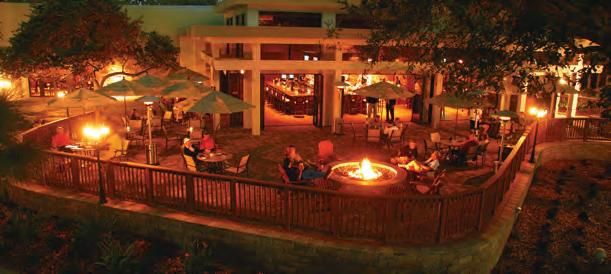


BRYAN WEBB
Bryan Webb is a principal with MAI–Marsh &Associates based in Greenwood Village, CO. www.mai-architects.com
Coloradans are known for their active outdoor lifestyle.
So, when Marsh and Associates was brought in to remodel the Country Club of the Rockies, the team focused on connecting the club to its breathtaking natural surroundings and year-round activities—bringing sustainability to the forefront.
In 2021, the clubhouse was renovated to integrate the membership’s healthy and social lifestyle by blending the indoor and outdoor dining facilities and adding a new health and fitness facility to support the array of outdoor opportunities for members, ranging from clay and hard courts, a groomed track for cross-country skiing/snowshoeing and world-class golf.
The design team focused on maintaining the existing clubhouse mountain style by better connecting the design to the surrounding environment.
The existing clubhouse design had heavy materials and minimal natural daylight. Marsh and Associates sought to brighten up the spaces by replacing the old, inefficient windows with operable glass doors. Natural daylight was not just maximized in the new dining and wellness areas but was also a part of the focus in the locker rooms and even the kitchen.
This not only connects the clubhouse to its mountain surroundings but also reduces the amount of electricity needed for day-time lighting. Additionally, the temperate mountain climate allows the club to open dining and social spaces to the outdoors for fresh air and to reduce the use of the indoor mechanical systems.
Existing building features were carefully considered by the design team to pay tribute to the tradition of the club. This maximized the construction budget while minimizing the construction schedule, which generated a lower overall carbon impact of the remodel in comparison to a new building construction.

Design elements included reusing materials from the original building, maintaining the original structure, and limiting the demolition and waste.
Sustainable upgrades:
Mechanical system
• New, high-efficiency heating, ventilating, and air conditioning units operate based on what a room needs.
• MERV filters in the HVAC system are used to promote healthy indoor air quality.
Lighting
• Ambient and decorative lighting fixtures all use LED lamps, and each space is connected to its own occupancy sensors.
• Individual and “smart” dimming controls (coupled with appropriately placed glazing) reduce the clubhouse’s reliance on artificial light.
Plumbing
• Plumbing fixtures selected are not only low flow, but also incorporate touchless sensors.
Systems and Equipment
• All the existing kitchen equipment was replaced with new high-efficiency appliances for reduced operating expenses.
By blurring the boundary between inside and out, Marsh and Associates evolved the clubhouse from a heavy, dark atmosphere to a light and relaxing retreat for members and guests.
Now, all dining spaces connect with expanded terraces, maximizing the connection to the environment. This not only flooded the interior spaces with natural light, but it also enhances operations, experiences and mobility throughout the building.
The newly reconfigured dining and lounge spaces’ operable walls have dou -
ble-glazed, low-e, tinted glazing, and covered porches to protect the intense mountain sunlight. This design strategy worked to maximize passive daylighting and ventilation and promote positive indoor air quality.
Adjacent terraces to these spaces were expanded to further promote the connection to outside. Additional shade structures were incorporated to provide necessary shade and weather protection while minimizing the reliance on the HVAC systems.
These improvements have positioned Country Club of the Rockies as one of the prominent clubhouses in the mountain region.
“The largest impact (of the renovation) was the cultural change that occurred,” said Bill Hughes, the club’s general manager. “I had members tell me that they met more members this summer than in the 20 years they were members here.”
The clubhouse renovation and addition were highly regarded by members and guests.
“Members are supporting the facility like never before to enjoy the new clubhouse,” Hughes said about the successes of the renovation and addition. A clear demonstration that the clubhouse was successfully planned and designed to naturally fit the sustainable lifestyle of the community and membership. BR




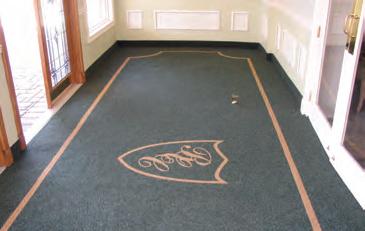



GORDON WELCH
Gordon Welch is president of the Association of Private Club Directors. For more information or to discuss your orientation, you can reach me at gordon@boardroominstitute.com or (918) 914-9050.
Have you ever entered a boardroom and felt the stress? I hope you haven’t felt stress in the boardroom, but my guess is you have. Let’s discuss some ways to relieve boardroom stress.
Collaborative governance ensures that your private club, like any business, uses sound business fundamentals; a lean, mean organizational structure; effective management systems and procedures; and open and transparent decision-making. For governance to succeed, we need structure and process. For collaborative governance to succeed, we need to clearly articulate and enforce structure.
Start with building the lean organizational structure, composed of volunteers and paid management.
1. The board (volunteers) is the spiritual leader of the club. Without a clearly articulated role, it potentially harms the club. So what is the role of the board?
It is common today for private clubs to operate in a so-called “traditional” manner where the president, perhaps the executive committee (officers), and/or the board of directors control most, if not all, the decision-making.
As previously discussed, while there may be some participation by the general manager, this is a highly centralized decision-making system controlled by the volunteer leadership. It’s a closed shop; very few members (volunteer leaders-influencers) make decisions. Their interests and priority for any decisions lasts only as long as their term in office, after which the interests and agendas of others take over.
So, in this changing landscape, defining the role of the board is an imperative where all board decisions are necessary and sustainable. This begs the need for specificity and clarity of role.
2. The board’s fundamental responsibility is to represent the membership’s long-term interest by setting policies and guidelines and ensuring that the club is operated within the guidelines.
3. A fundamental requirement of the board and its members is to be always ethical and transparent and avoid conflicts of interest.
4. It is vital for the board to maintain a clear line between policy and implementation. When the line is blurred, micromanagement, the scourge of management, occurs.
Board members often have been longtime directors who have coveted their positions, essentially becoming positions of power and empowerment for personal agendas. These kinds of boards, “old boys’ network,” manage to keep a tight fist on who gets on the board, but it’s this kind of embedded power structure that can be “tossed out” through commitment to collaborative governance. So, in outlining the philosophies, what is the role of the board?
The primary functions of the board are to:
• Enforce the club’s mission by setting the strategic direction for the club through a strategic plan

• Set, review, confirm and monitor the goals and objectives of the club’s strategic vision, with the oversight and coordination of the strategic planning committee
• Enforce the club’s bylaws, policies and procedures, and rules and regulations
• Create and oversee the club’s committees, including standing and ad hoc committees
• Select, evaluate, and assess the performance of the club’s general managers/chief operating officer on an ongoing basis
• Provide a forum for member issues.
More specifically, the club’s board of directors must:
• Represent the membership
• Establish the club’s long-range direction
• Approve management’s business plan and let management administer it
• Fulfill fiduciary responsibilities as outlined in the club’s governing documents
• Approve rules and regulations
• Approve the annual operating and capital budgets
• Ensure proper use of the club’s resources
• Fill vacancies on the board and executive committee, if necessary.
Board members must specifically:
• Represent the club membership
• Fulfill the fiduciary responsibilities as outlined in the club’s governing documents
• Be knowledgeable of the club’s bylaws and governing policies
• Be knowledgeable and prepared to discuss and act on board issues and agenda items
• Fulfill committee responsibilities, as assigned by the board of directors.
• Possess attributes, among others, that enable club members to believe board members will be ethical, transparent in their dealings and avoid conflicts of interest.
They must be willing to commit time and energy to board activities, be rational, prudent, and practical. Directors must know and honor the club’s bylaws, policies and procedures, rules, and regulations; be empathetic and tolerant; and vote with conscience and support consensus in reaching board decisions.
Board members must also honor and respect the collaborative management concept, clearly recognizing the board’s authority, advisory and oversight responsibilities of the club’s management, and the club general manager’s authority in implementing board policies and decisions.
Eliminate stress in your boardroom through the partnership of collaborative governance. BR





JONATHAN GOLD
Jonathan Gold, PGA is the Northeast regional team lead for PGA of America Career Services. He can be reached at jgold@pgahq.com
The Great Resignation is here and by all accounts is continuing to have a dramatic impact on us as a society. Increases in the cost of living and the desire of employees to work remotely are not in line with the traditional golf operating models.
While the golf industry is experiencing significant increases in rounds and participation, we have to take a moment and think about the costs. Our industry prides itself on providing platinum level service at all times under any circumstances.
Human capital is ultimately at the forefront of providing these services. The cost is the effect on you and your employees’ stress and work-life balance.
The urgency as an industry to provide data-driven metrics to those making decisions on the payroll budgets is greater than ever. While the ability to have a general conversation with decision-makers might be effective, having data to support your recommendations is what will move the needle to mitigate stress and enhance employee work-life balance.

With all that said, what if I told you there was a “golden ratio” that can determine if your golf operation is properly staffed and indicate burnout? The golf industry has a metric that gives everyone the opportunity to assess their current staffing levels and compare themselves with similar facilities. The good news is that it is easy to calculate and understand.
Similar to keeping track of covers, in the golf world our constant is rounds of golf. The question is, while rounds have increased by an average of 30 percent since 2019, has your payroll moved in a similar direction and if so, was it proportional? We have found that when comparing 2019 data to 2021 data, 75 percent of facilities have less payroll per round than they did previously.
To assess your payroll per round of golf, simply divide your total gross payroll (not including the highest-ranking golf professional) by rounds of golf.
For example, if the club in 2019 had 20,000 rounds of golf and the golf operations payroll was $200,000, the payroll per round would be equal to $10 per round.
In 2021, the same club increased payroll to $225,000 and rounds increased to 25,000 rounds, therefore, equaling $9 per round. This operation, although it increased the payroll budget, is operating under 2019 service levels and putting a lot of stress and work-life inequity on staff.
I cannot stress enough how important this metric can be to solving the work-life balance issues in the golf operation. The payroll per round metric should be under-
stood by all parties at the facility, especially those making the final decisions on budgets.
It is astonishing when engaging a club how often the decision on staffing levels, including the number of assistants, is decided on by “feel” rather than data.
For the first time, we have a simple metric that shows the burden that is being placed on staff to try and maintain service levels that the customer expects. Facilities that are operating below previously set standards are at an incredible risk of burning out staff and creating resignations and exits from the industry.
Although rare, it can be true that facilities’ budgets do not allow for increases in resources for additional staff. Regardless, the workplace is an environment where employees should feel fulfilled in their careers and have enjoyment while on the job.
Also, it is important to note that leaders set the standard for others to follow. Setting examples of work-life balance at the top will trickle down to employees. Using metrics and data to convey the importance will make the conversation easier for you and for others to follow.
Facilities are now focusing on creative ways to maintain staff, mitigate stress and enhance employees’ work-life balance. Doing so includes providing at least one weekday and a weekend day off per week if not every other week and instituting mandatory days off in peak season.
Shortening golf shop hours and changing responsibilities to align with an individual’s passion is a shift that a majority of clubs are making as well. It will take some creativity, but cross-training employees in different areas and careful scheduling are allowing for these changes to long-standing norms.
For everyone invested in the golf industry, we need to take these data points and educate all employers before it is too late. This is a critical time where not enough workers are entering the industry compared to the record amounts of demand to enjoy this wonderful game.


hanover Golf Club Ashland, VA
tot hill Farm Golf Club Asheboro, NC
1 hr from Pinehurst & Charlotte 1st Original Mike Strantz Design
Meadowlands near Greensboro, NC
• Consulting Services
Deep Creek Golf Club
Punta Gorda, FL
Near
near Atlanta, GA FAZIO Designed Course
Cobblestone park near Columbia, SC (Blythewood) Fabulous 27-Holes Golf Course

One thing that is certain about club membership is the belief that the club is a safe place, and that the members are honest people with shared values.
There is a strong expectation that the other members are part of the club for the experience and the comradery. Regrettably, sometimes new members prove to be a bad fit who actually diminish the club experience and even alienate and repel their fellow members. Sadly others join a club intentionally seeking access to existing members, often with the hope of reaping some financial gain. In worse circumstances, a new member reveals their true identity and becomes a real problem or even a threat to their fellow members, or the staff and endanger the club’s reputation. What makes matter worse yet is that these people often have predictive information of this type of behavior in their background that would have changed the club’s decision to admit them if it were known, but no one was looking.
With the advancements in information technology, the world has never had more information about people and their actions available to be used for fact checking and to find important character-based information that the applicant didn’t disclose. Kennis is in the business of finding this information, which, importantly, is simply
available and waiting to be found, not stored in some secret private locations.
The only barrier to having access to real, meaningful background data about your applicants is that collecting this information requires both specialized skills and tools. This means that a club is unlikely to be successful in finding this type of information by having an employee search for it and it is also well outside the capability of nearly all employee screening firms. The great news is that a firm like Kennis specializes in providing this exact type of information for private clubs. BR
Paul Dank is board certified expert at investigations and background checks as well as a Certified Fraud Examiner. He serves as the President of Kennis.
What do you really know about someone applying for
In truth, the traditional application process tells you very little about someone and provides no facts, yet the onus on any club and its leaders is to fully vet candidates. Until now, there were no trustworthy tools to bridge that information gap.
Kennis created an innovative, confidential, comprehensive analysis of your candidate. For the first time, clubs can make fully educated membership decisions, based on facts, and have peace of mind knowing that your latest admissions are positive ambassadors of your club.





ROBERT A. SERECI
Robert A Sereci, CCM is GM/COO of Medinah Country Club, located in Medinah, IL. He can be reached at (630) 438-6825, or via email: rsereci@medinahcc.org
I have worked in nine clubs in my club management career, five as a general manager/chief operating officer.
During that time, I have found that every club, no matter in what part of the world or at what level of prestige, possesses a certain number of incongruent members or rule-breakers.
Without question, rule-breakers exist at every club.
For some clubs, allowing even a few is entirely unacceptable, and they are managed or dealt with immediately and firmly. Other clubs allow the number of rule-breakers to reach a critical point before acting.
You may be part of a casual club community that is without a rigid culture, not uptight or stuffy.
Clubs with a strict culture can have fewer behavioral issues but perhaps less fun.
Formal clubs have black and white behavioral rules, with zero tolerance for gray areas – the line between right and wrong is firmly drawn. In such an environment, destructive and ill-mannered behavior stands out.
Generally, rule-breakers receive corrective intervention from their peers, the membership at large, rather than their board of directors. On the other hand, if your club is more relaxed than most, your environment lends itself to a proliferation of rule-breakers, bringing to mind a phrase that parents often tell their children: “It’s all fun and games until someone gets hurt.”
With that, the essential questions are: What is the population of your rule-breakers? Are they playing an active role in your current club culture?
It is likely your members are expecting that you are paying attention. The pure definition of a club is a group of likeminded individuals coming together to form a community and experience pride in belonging. Member behavior and club rule enforcement strongly contribute to establishing club pride.
Club culture is the collective behavior of a club community. Culture is contingent upon established and consistently enforced rules. Just as America is a nation of laws, your club is a community of rules. But, for various reasons, some members do not always play by the rules.
Rule-breakers can erode trust with their unrelenting opposition to rules and policies set by your board of governors
and management. Constantly challenging and questioning regulations and decisions with which individuals disagree, and encouraging others to join them, forces the hand of your governing bodies.
Because of their discontent and disenchantment with rules or decisions, rule-breakers will regularly behave conversely to those rules. To perpetuate their agenda, they will put their defiance on display, modeling this behavior to others. It is particularly troubling for new members, as the behavior of the rule-breakers may become the behavior model which new members adopt.
New members look at established members with reverence; thus, rule-breakers modeling bad behavior is akin to permitting newcomers to misbehave. Leaving this paradigm unchecked may cause a club community to reach its tipping point, causing devastating, if not irreparable, effects.
Many of us are chameleons, quickly adapting to our surroundings. As the saying goes, “When in Rome, do as the Romans do.” By effectively addressing the behaviors, removing the platforms for rule-breakers, and relegating rule-breaking behavior into the minority, you will reap the rewards, resulting in a positive, more compliant club culture.
Notably, at The Ritz Carlton Hotels, the management employs the admirable slogan “We are ladies and gentlemen, serving ladies and gentlemen.” However, if your service team regularly waits on rule-breakers, it won’t take long for your team to adopt similar behaviors.
Few members will complain about the level of your culture, which is unsurprising to most club managers, who understand that in private clubs the actual level of cultural discontent is typically higher than what is verbalized.
Rule-breakers have a way of fostering discontent and squelching those who disagree. They understand that silence can be viewed as tacit approval, and some may do their best to make sure that those who disagree with their opinions or models of behavior are silenced.
Also, a level of misbehavior may become so commonplace that it becomes the new cultural norm. Once you are accustomed to bad behavior, it becomes normalized and is no longer obvious; however, new members will immediately
recognize the ill culture, which presents them with a decision to make.
Will they leave, will they try to affect change, or will they take the path of least resistance and conform? We all have different non-negotiables and standards of decorum. The question is, what level of decorum should the club maintain?
Before you begin a conversation on enforcement, you first need to make sure that you are happy with the rules you have. The chances are that some of the rules in place, dress codes or cellphone policies, for example, may be inappropriate for your current times.
Creating rules is relatively easy compared with the efforts and risks in enforcing them. But first, you must decide who is responsible for enforcing the rules. So, what are your options?
1. Staff – Staff are rules enforcers in many clubs. Once rules are established, staff and management are authorized to enforce rules throughout the club. Management creates incident reports and shares them with the president, board, or grievance committee.
2. Members – Some clubs believe that rule enforcement is the responsibility of the members rather than the staff. The logic is that members are club owners and should hold one another responsible and accountable.
3. Both – Many clubs prefer a combination of the two. The primary responsibility for enforcement lies with the membership; however, members can also empower the staff to speak up when they witness an infraction.
Disciplinary committees typically hand out harsh or unreasonable consequences. If club boards repeatedly choose not to bring violators to the disciplinary committee, when, inevitably, someone does appear, the committee is likely to overreact with consequences disproportionate to the violation.
It is not uncommon for two different members with identical violations to receive different outcomes. Usually, it depends on who chairs the committee, the personality makeup of the committee members, and who is in trouble.
In private clubs, who committed the offense is usually taken more into consideration, rather than what was the offense. Creating a consequence matrix for committee utilization ensures that consequences are consistent and fair to all parties.
There is no easy answer. Much depends on your club community and the prevailing cultural norms and if the president and the board are willing to address the issue. I am not suggesting that you drastically change your culture, because your environment makes you special and unique.
I am saying that, as a group, you need to decide on the tolerable and absolute boundaries. It is an essential exercise. Before I leave this topic, I want to reiterate that I respect every club’s right to structure its own rules and culture, and I never endorse fixing something that isn’t broken.
Having said this, you should realize that for improvement to take place with some of your critical issues, it will be necessary to firm up the structure of your rules, as well as your enforcement and disciplinary processes.
Like everything else at the club, emotions tend to be front and center when dealing with club issues. Nowhere is this more apparent than when dealing with “problem members.”
Depending on the personality and temperament of the chairman, consequences can be either too harsh or too lax. Depending on the reputation of the errant member, committee members might have a biased view or sentiment that impacts their ability to render an appropriate correction.
For example, suppose the committee hears no cases for a long time. In that case, the very next issue is likely to receive a disproportionate amount of attention and consequence, presenting an opportunity for the chair and committee to flex their muscles and show the membership who is in control. The problem with this approach is that the president stops forwarding incidents to the disciplinary committee out of fear that the committee may act irrationally.
But the bigger issue with what I’ve described is that it is inequitable. Every member deserves the same due process and consistent consequences. Developing a matrix attempts to remove the emotions from the committee’s response and provide objective guidance to ensure equitable and consistent corrective action. The matrix advances to future chairs and committees on an ongoing basis. The board will approve the matrix before implementation.
I cannot emphasize this point enough. While it may be tempting to come out with guns blazing, I urge you to take a deep breath and start slowly. Your goal is to curb member behavior in the long term.
Depending on your culture, a quick start could yield negative results, especially if your membership is grappling with other significant issues. Remember, humans have a finite capacity to deal with change. Slow change makes for permanent and purposeful change. BR


JOHN R.
EMBREE
John Embree is CEO at the United States Professional Tennis Association and can be reached at (407) 634-3063 or via email: john.embree@uspta.org
Being environmentally friendly is more than just words. Sustainability is a catchphrase that many people talk about but really do not follow.
If a company is truly environmentally conscious and if a company truly embraces the concept of sustainability, what does that actually mean?
At United States Professional Tennis Association world headquarters in Lake Nona, FL, we live in a community that prides itself on personal health and wellness, technical innovation, and sustainable initiatives. When designing our office building, which we took occupancy in the summer of 2017, we focused on being technically savvy while also being true to our core value of being environmentally sustainable. It is a given that we recycle paper products, plastic, and glass. We also encourage our employees to recycle their gently used tennis shoes through Sneakers4Funds, a program that keeps shoes out of landfills by sending them to developing nations where entrepreneurs refurbish the shoes and sell them to make a living. Being the tennis company that we are, one should not be surprised that we recycle tennis balls as well.
In the bigger picture, we decided to reduce the amount of drywall in our building during construction. As you all probably know, drywall is toxic to the environment when it is in a landfill and gets wet. Plus, drywall is totally inflexible so if any remodeling is required down the road, it would create a horrific mess when demolition takes place. Anyone who has remodeled a club or home knows exactly what I am talking about.
Thus, we determined it would be in our best interest to install movable or modular walls throughout our complex. Not only are they incredibly attractive but the flexibility that is inherent in the design makes them ideal for changes to our office complex should that be needed. We can modify the layout of our private offices, revise the spacing of our boardroom, or flex the size of our training room through a redesign with alternative wall products.
Other features in our building include a “living wall” with plants that contribute oxygen to the office environment for our employees and low-voltage lighting throughout that only requires the power of a phone line. Therefore, our energy costs are lower than what would normally be required for traditional office lighting.
But if we really want to “walk the walk and talk the talk,” solar installation is a must, especially since we are in the
Sunshine State. Even though the payback period on the investment is longer than what I had desired (18.5 years), it is the right thing to do for the long-term health of the global environment.
I applaud the USPTA board of directors for deciding to invest in this technology. Installation will be completed by the end of Q3 when we start saving $10,000 per year on our energy costs beginning in 2023.
Our total office space is only 10,000 square feet and houses 21 employees. Even though we are not a large operation, we have made sustainability a core value. We have an expectation to do our part, as small as it may be, to contribute to the overall health of our surroundings.
Our staff understands the responsibility of supporting initiatives that will positively impact the long-term health of our world. The USPTA wants to be the shining example in the tennis industry of environmental and sustainable actions. BR


JARRETT CHIRICO
Jarrett Chirico, USPTA, PTR, PPTA, PPR, PPTR is director of racquets at Royal Oaks Country Club, Dallas, TX.

I’VE ALWAYS BELIEVED IN PROGRESS. THE IDEA IS THAT SOMETHING DONE WELL TODAY SHOULD BE EVEN BETTER TOMORROW.
It only makes sense that great coaches, players, and sports in general should continue to improve over time. The same can be said for pickleball.
Consider how pickleball has grown from 250,000 to more than six million players in just over five years. That’s an astonishing number. Consider where pickleball is today. I predict pickleball will be the most played racquet sport in the country in the next five years, and legendary golf coach Hank Haney shares the same opinion. Taking into consideration those numbers, and that most clubs in the US and around the world have clay courts, I can tell you that clay court pickleball is a key to the growth of the sport.
I started clay court pickleball at Green Valley Country Club almost a decade ago. Our indoor hard courts hosted pickleball seven days a week, and we saw on average 750-1,000 players every week. That is an insane number. I knew two things: First, we were exploding, and second, we needed to figure out what was next.
It took that long before I could get anyone to even try it. People argued how pickleball is a hard-court sport and wouldn’t work on clay. Finally, I got a group of five players on the court. The next day I had 10, and the day after that, I had 30. I went from zero to sold out in a week, and it was all from word of mouth. Pickleball on clay was finally gaining traction.
The weeks that followed led to an amazing balance at my club. We had indoor hard court and outdoor clay pickleball. People loved the clay because it was easier on their body for those who needed a lower impact sport, and it made pickleball even more athletic for those looking for a challenge.
I tested many balls and found a ball that bounced perfectly. So, I decided to take another chance and host a national clay court pickleball tournament. We had 180 players. They had a great time, and clay court pickleball was off and running.
Today, I am the director of racquets at Royal Oaks Country Club, where we have one of the most successful racquets programs in the country. We have dedicated pickleball
You can see clay court pickleball growing nationwide, and soon you will see it grow all over the world. Pickleball is not only going to be the most played racquet sport in the world one day, but it will also be played on different surfaces and at the highest levels, just like tennis. So, think outside the box and give clay court pickleball a try. Your members will love you for it.
So, I did what every young director would do: I sold my general manager on the idea of clay court pickleball and invested in an untested idea that was based on a hunch. I had no idea if the lines would work or where to get them. I had no idea if any of the balls would bounce. Yet I was convinced we could make it work.
We had tennis lines cut in half and holes put in to be basically the same as clay court tennis lines, but only an inch wide where the tennis lines are two. We laid them on top of our tennis court and spray painted them dark red. Essentially this looked like blended lines but with pickleball specifications. Then I did what I usually do; I marketed it as if it were already huge. The next month was interesting, to say the least, but I didn’t panic.
courts and programming that have fueled tennis and participation across the board.
However, I took the model of clay court pickleball and shared it with directors around the country. I can proudly say I have helped almost 100 clubs start clay court pickleball and grow their racquets programs, including the Mexican and European tennis federations.
You can see clay court pickleball growing nationwide, and soon you will see it grow all over the world. Pickleball is not only going to be the most played racquet sport in the world one day, but it will also be played on different surfaces and at the highest levels, just like tennis. So, think outside the box and give clay court pickleball a try. Your members will love you for it.
BR

“Golf,evenatitspeaklevelsofpopularity,stillcomeswith challenges.”
– Joe Steranka, former CEO of the PGA of America
Joe’s words likely echo many current boardroom discussions across the country as clubs enter into an era that might not have been foreseen a few years back – waitlists. What do waitlist prospects expect? How much would they be willing to invest into an initiation to hold their position? Can we get waitlist members on the golf course with a tee sheet that is already stressed?
Over the past several months, we have been approached by industry colleagues in search of “a bit of clarity” on what waitlist members would deem acceptable. Below, you will find data and insight on that very topic — the first of its kind within the private club space.
A survey was sent to prospective private club members who are searching for a private club and golf home. The objective was to gain their thoughts on waitlists and their overall expectations of an ideal waitlist scenario.
After completion of the study, Golf Life Navigators’ position is that clubs with a waitlist should be cautious with their assumptions about their waitlist numbers. On average, 70 percent of prospects (across all initiation ranges) do not intend to join a club that has a 12-month or longer waitlist.
In addition, an average of 50 percent of prospects said they would change directions completely and look at alternative clubs to avoid a waitlist. In short, closing the gates completely on new member applications could lead to a costly mistake as we predict waitlist dilution.
For those clubs who are not yet in a waitlist era, we implore you to broadcast the fact that you have membership availability and an open tee sheet. Issues of capacity at clubs during season months are a hot topic, not just from your members but prospects as well.
Golf Life Navigators’ partner real estate agents say their active golf clients are pivoting from an intended club to alternative clubs that have membership availability and tee time availability. Even if that means buying into another market across the state.
Here are a few more highlights from the survey, which had 550 respondents spanning five tiers of initiation ranges based on their budget for a full golf membership:
If there was a non-refundable down payment required to join a waitlist, to what percent of the initiation fee would you be comfortable committing?
$0-$10,000 initiation budget
$0, I would not put money down to join a waitlist – 52 percent I would be willing to put down 5-10 percent of initiation – 28 percent
$10,000-$25,000 initiation budget
$0, I would not put money down to join a waitlist – 40 percent
• I would be willing to put down 5-10 percent of initiation – 25 percent
$25,000-$50,000 initiation budget
• $0, I would not put money down to join a waitlist – 22 percent
• I would be willing to put down 5-10 percent of initiation – 38 percent
$50,000-$75,000 initiation budget
$0, I would not put money down to join a waitlist – 34 percent I would be willing to put down 5-10 percent of initiation – 31 percent
$75,000-plus initiation budget
• $0, I would not put money down to join a waitlist – 26 percent
• I would be willing to put down 5-10 percent of initiation – 22 percent
• I would be willing to put down 10-20 percent of initiation – 22 percent
How likely are you to purchase a home that has a full golf membership attached – or a transferable membership from the seller – to avoid a waitlist?
$0-$10,000 initiation budget
• 62 percent say “somewhat likely” to “very likely”
$10,000-$25,000 initiation budget
• 74 percent say “somewhat likely” to “very likely”
$25,000-$50,000 initiation budget
• 60 percent say “somewhat likely” to “very likely”
$50,000-$75,000 initiation budget
• 82 percent say “somewhat likely” to “very likely”
$75,000-plus initiation budget
• 88 percent say “somewhat likely” to “very likely”
The biggest takeaway from this report is that we have good problems on our hands. The demand for private golf and real estate remains at all-time highs, with no signs of slowing down. The goal for management is to think through the solutions and lead their members in the right direction with data, best practices and good ole’ gut feeling.
KRIS BUTTERFIELD
Kris Butterfield is director of membership, communications and public relations at Bethesda Country Club and president of PCMA. She can be reached at (301) 767-8252 or kris.butterfield@bethesdacountryclub.org
If membership is the lifeline of a club, then what is the value of the membership professional?
A recent surge in membership demand has several clubs with waitlists, driving membership professionals to reevaluate their focus.
The private club industry tends to be cyclical and as the market continues to change so must the performance of the membership professional. Luckily this position was established on resistance.
The path of the membership professional is ever-evolving. What began as a “membership secretary” naturally matured into a “membership director.” Membership professionals processed correspondence and maintained records before they became the keepers of the culture, the faces of their clubs, and the primary long-term revenue producers.
Their responsibilities are infinite and vary from club to club. Accomplished membership professionals have the institutional knowledge to provide clubs with real-time insight into buyers’ demographics. They drive data, assist with strategic planning, are the front line for inquiries, and maintain the culture of the club through prospective screening and onboarding.

and were recent marketing or communication graduates that were also new to the private club industry.
When did we decide that the ability to create flyers would translate into being able to retain and sell memberships? As clubs combined the membership and marketing positions, relying more heavily on marketing experience, the significance of the membership position began to deteriorate.
Membership has always focused on the three Rs: recruitment, retention, and relationships. The relationship between the overall club membership and membership professional has become more prominent as private clubs reach membership capacity. The volume of strategy, focus and fortitude involved in every task that crosses their desk is a direct correlation to the club’s bottom line.
Now is not the time to sit back and relax as there is still a lot of work to be done. While clubs build waitlists and reinvest in infrastructure, the membership professional must demonstrate the flexibility to ebb and flow. Managing a waitlist can be even more challenging for the membership professional.
Clubs will begin to feel the consequences of combining their membership with marketing and communications positions. This is the time for strategy and structure to shine.
Membership has always focused on the three Rs: recruitment, retention, and relationships. The relationship between the overall club membership and membership professional has become more prominent as private clubs reach membership capacity. The volume of strategy, focus and fortitude involved in every task that crosses their desk is a direct correlation to the club’s bottom line.
In the world of immediate gratification and constant communication, membership professionals pride themselves on responsiveness, a characteristic that is often overlooked. They rapidly become the “face” of the club, taking pleasure in creating an “instant community” for new members.
The membership professional sets the standards for club continuity by constructing a strong foundation for new members and allowing the staff to build upon it.
Recently, many clubs found themselves satisfying their frustration with poor marketing and communications by hiring someone that could promote events and simultaneously embody membership. Most of these hires “checked the box”
Many membership professionals (and clubs) will be navigating uncharted territory with a waitlist for the first time in club history. They will develop a comprehensive waitlist plan around the club’s competitive advantage.
Membership professionals with industry knowledge, market awareness, and interpersonal skills will be pursued at the most sophisticated clubs: the clubs with a separate marketing and communications position. And when the pandemic effect fades, your talented and respected membership professional will be ready to pick up where they left off, at the front door welcoming your next new member. BR

TED ROBINSON
Ted Robinson is a partner with Private Club Associates and can be reached at (478) 741-7996 or via email: tcr@privateclubassociates.com
A man with deep far-sightedness will survey both the beginning and the end of a situation and continually consider its every facet asimportant.
– Takeda Shingen
Thewaytogetstartedistoquittalkingandbegindoing.Toomany timeswekeepthinkingandtalkingthroughourgoals.Insteadwe needtolearntostarttakingaction.
– Walt Disney
Every great company knows to be successful it must understand what its customers want and how they value the services and products they purchased. The annual membership survey can serve as the primary source of that information for a private club.
Learning what your members (customers) want and how they value your service, products, facilities and programs (measuring the member experience) is the first reason to survey your membership annually. Using the survey as a management tool that provides a quantitative measure of progress toward achieving the annual goals of your department heads and club staff is the second driving factor.
This article provides and amplifies on the following key steps that when successfully accomplished will assure your club receives the maximum benefit from the annual survey:
• Survey design
• Pre-survey communication plan
• Survey launch communication plan
• Survey analysis report
• Immediate follow-up
• Action plan design
• Action plan execution.
Survey design: The design of the survey includes abundant pre-survey research. Brainstorming with the board, committees, management, staff and subpopulations of the memberships (younger members, older members, new members, high spenders, low spenders – even 7- to 12-year-olds) is an effective way to determine what your club would like to learn from your members.
Carefully craft the questions so as not to “lead the witness” and to build confidence in your club’s intelligence-gathering process. The survey should send a message to your members about the club’s commitment to inclusion and to soliciting ideas, opinions and suggestions from all members. Avoid tilting questions toward individual agendas.
Pre-survey communication plan: Tell your members what you are going to do, why you are doing it, what to expect and when and how they will receive the survey. Ask for their participation – and commit to using what they tell you.
Survey launch communication plan: Email is the most effective means to let your members know they can access the survey. Remind them every three to four days to complete the survey and to encourage other members to respond as well. Posters, message boards, reminders from staff, table tents and golf cart messaging are also important reminders.
A well-designed launch communication plan will drive the survey response rate thereby increasing confidence that the opinions expressed by the responding members accurately reflect those of the entire membership.
Survey analysis report: As soon as the response period ends, complete the report of survey findings. Include an analysis by tolerance values and isolate issues that are either rated too low or not high enough. Where are the opportunities to improve the products, services, facilities and programs?
Timely follow-up: As soon as the report is completed and digested by the board and management, share all the results, both quantified and qualified (written comments), with the membership and staff. Leave nothing out so you are not criticized for censorship.
Create and execute action plans: Prioritize the “below acceptable” ratings and design an action plan for each. Define the issue, assign ownership, determine the cost, set dates for completion, and explain how success will be measured.
Progress on these action plans must be frequently communicated to the membership (1) as soon as they are approved; (2) when progress has been made; and (3) when success has been achieved. This can be as soon as today (“There wasn’t any Gatorade at the swimming pool, but it is there now”) or over years (“We are going to construct a new fitness facility; planning will begin next Tuesday and completion is expected in 27 months”).
It may be that the club cannot do what many members want, either now – or in the future – or ever, and the members should be told what cannot be done. Continue the communication process every time something is accomplished and take your well-earned “victory lap.”
The second major benefit to the annual membership survey is its use as an HR management tool. Survey results can be effective for goal setting (improvement in a department’s performance that can be measured in next year’s survey) and performance reviews/compensation/bonus distributions. Were the action plan steps accomplished? On time? On budget?
The survey and effective pre- and post-survey communication with both members and staff can and should enhance the goals of inclusion, transparency and communication. It can and should also provide staff performance measurements, thereby magnifying the return on investment in your annual membership survey. BR
DUNCAN RENO
Duncan Reno, CCM, CCE is chief operating officer/general manager of Del Rio Country Club in Modesto, CA. He can be reached at (209) 341-2401 or via email: dreno@delriocountryclub.com

Take any major city or region in the United States and you can clearly recognize which private club rises above the rest in that area.
These clubs are considered the “premier” clubs of their areas. What makes them premier clubs?
We can identify five major elements:
1. Financial structure. These clubs have funding plans and reserves that address the three major “uses” of money: operations, asset replacement and debt reduction/planning. When you analyze their financials, you can clearly see specific allocations of dues directed toward each area. In doing so they keep their club financially sustainable.
2. Commitment asset replacement management. These clubs are committed to the upkeep of their facilities and equipment maintenance by not only funding the replacement of their assets but by providing the needed resources to keep them in top working condition. They employ quality staff to maintain the facilities daily and provide the money needed to keep things fresh and updated more frequently, such as fitness equipment, mowers, furniture, etc. It’s costly but has a high impact.
3. Leadership. Each club holds in regard the club corporate structure, from management to board leadership to committee involvement. These areas work toward a common goal to enhance the club’s value by respecting and appreciating the role each plays and never losing sight of who they benefit – the members.
4. Commitment to excellent member service and experience. At these clubs, the answer is always “yes.” This attitude or culture is evident in the staff the clubs employ. They consider their employees their number one asset. They provide the resources to develop and maintain a highly trained professional service staff where garnering positive member experiences is their top priority.
5. Member praise. Their best marketing and promotional tool is their membership’s “word-of-mouth.” Members are the best advocates for member dining, participation in member events, new memberships, and equity building. Members recognize that their role in making the club even better is to be active and to maintain a positive attitude to truly enhance membership value. It is so evident you literally feel the shift when something is unsettling.
How does your club stack up? Are you the premier club in your area? Do you define what it is to be a member of a premier club in the region? Do you define the level of quality service and products offered? Do you define the culture that is needed to benefit your members? Do you define what it takes to fund this type of club? Do other clubs look to you as the example? If not, now is the perfect time to “gain” a stronger position. The private club member is constantly being redefined, and the industry is looking to premier clubs to show how to respond effectively. BR


By William P. McMahon, Sr.

“Frank has contributed to our industry through his leadership, research, education and organizational skills and achievements. He stands out from others for his kindness, generosity, keen intelligence and valuable contributions to those he serves.”
—John Fornaro, CEO and Publisher, BoardRoom
That, in a nutshell, describes Frank Vain, recipient of BoardRoom magazine’s Lifetime Achievement Award for 2021
Frank Vain has had a distinguished career in the hospitality and club industry for almost 40 years and has been President of McMahon Group since 1988. In that role, he’s led our company as we’ve worked with many of the leading private clubs in North America and Asia, to help them develop strategies and plans for addressing both their immediate management challenges as well as the long-term lifestyle trends affecting the industry.
In his position at McMahon Group, Frank has served over a thousand top clubs of all types and
sizes throughout the world. His dedication to the industry has also included being a past president of the National Club Association and president of the Country Club of St. Albans (Mo.). He’s been a frequent speaker at the Club Management Association of America World Conferences over the years, as well as at CMAA chapters throughout the country.
He’s also an integral part of the Club Leadership Alliance, composed of McMahon Group, Kopplin Kuebler & Wallace and Club Benchmarking. The CLA is dedicated to enhancing the club industry, and the clubs within it, by promoting best practices for club success.
Personally, after working closely with Frank at McMahon Group for 34 years now, I can attest that he is not only a born leader, but also a great family man – he has been married for 40-plus years to his wonderful wife Mary, and they have raised three wonderful daughters and have seen their family grow to now include three sons-in-law and two grandchildren.
It has been great fun during that time working with Frank, and all of our manager friends, as we have always strived to make each club as good as it can be. And now, after I had the honor of receiving BoardRoom’s Lifetime Achievement Award in 2013, we are especially proud that Frank has been named its recipient for 2021, making McMahon Group the only company to ever have two of its people selected for the honor.
Not surprisingly, many within the club industry also were quick to congratulate and praise Frank after the news that he was receiving the 2021 Award was announced. Here are just some of the accolades that we heard:
“I’ve had the honor of experiencing Frank’s dedication and vision firsthand and learning from his industry knowledge through his nine years on the National Club Association Board of Directors, including his term as chair. I’ve also been lucky to work with him on Club Trends magazine and the Excellence in Club Management Awards—two industry hallmarks. This Lifetime Achievement Award is well-deserved to say the least and is a testament to Frank’s strong leadership and invaluable contributions to the private club industry and its professionals.”
—Henry Wallmeyer, President and CEO, National Club Association
“Frank Vain is truly an icon in our industry. He is a thought leader in club management, integrous, a true giver and cutting-edge with his visionary guidance. The BoardRoom Lifetime Achievement Award is

such a great honor, and it is very fitting that this award is being presented to Frank Vain, a partner, colleague and friend!”
—Crystal Thomas, MCM, CHE, CAE, Managing Director, Golden State Chapter of CMAA and CEO, Management Connection
“Frank being named the 2021 Lifetime Achievement Award recipient by BoardRoom magazine is truly well-deserved. Throughout my career Frank has been my person to go to when I needed assistance regarding private club management and governance. Not only that, for over 20 years he has been a close friend and confidant. I cherish his professionalism and friendship. Well done, Frank—I look forward to many more years of your relationship with McMahon Group, your consultation, education and most of all your friendship.”
— Bill Johnson, CCM, CCE
After I heard that Frank would be receiving the award, I told him to remember that the best part of life really begins after a Lifetime Award. But knowing Frank as I do, I never had any notion that he would now think about resting on his laurels, even after such a distinguished career.
All of us at McMahon Group are especially excited about what lies ahead for the club industry, and in a recent video interview that we included in our McMahon Report, Frank once again showed his knack for providing special insights and identifying key trends around which clubs can build successful strategies.
“I think there is a bit of a ‘Golden Age’ opportunity right now for clubs,” Frank said in the interview. “A combination of factors has come together that should play out very well for private clubs in the next five to 10 years.
“COVID has enhanced and reinforced the notion of how clubs can provide safety, security and privacy as a ‘home away from home,’” Frank added. “Demographics are favorable, with the Millennial generation of roughly 80 million now reaching the prime age when people join clubs.
“And there is plenty of capital available, both from lenders and clubs’ own reserves that have been built up by the gains they’ve made in the past two years, to freshen, modernize and reinvent facilities in ways that can make and keep clubs even more relevant.”
Clubs can take full advantage of this “Golden Age” opportunity, by “following what members want and making changes to meet their needs and desires,” Frank concluded.
So, while we congratulate Frank Vain on his well-deserved Lifetime Achievement recognition, all of us at McMahon Group are excited to join him in helping everyone in the club industry now go on to achieve much more! BR
William P. McMahon, Sr., AIA, OAA, is Chairman, McMahon Group





BoardRoom Institute gives your club board access to top experts in the private club industry.
Hundreds of years of combined experience and hundreds of thousands of dollars worth of information in over 45 educational videos.
BOARD AND CLUB BENEFITS
• 24/7 access
• Affordable
• Prevent club lawsuits
• Accountability

GM BENEFITS
• Reduce micromanagement
• Collaborative governance
• Creates a shared playbook
Until now, almost all board member education rested squarely on the shoulders of the GM/COO. This was, and continues to be, a tremendous responsibility. The good news is that this is no longer the case and help is available - The Association of Private Club Directors is here to help you.
Robert Sereci, GM/COO Medinah Country Club, Medinah IL



















Like many clubs during COVID, Champions Run in Omaha, Nebraska, needed to create alternative member engagement opportunities.
“And since our pool deck is so popular, we thought we’d offer a fun and unique fitness program that was outdoors by bringing our spin bikes to the Sand Bar (the bar by the pool),” explained Ben Lorenzen, the club’s creative director and director of aquatics and fitness.
Offered every Thursday night throughout the summer, the Spin at the Sandbar is easily one of the club’s most popular fitness classes. “It continually sells out!” Lorenzen remarked. “Demand for the class was so high we had to find a way to bring more spin bikes to the bar.”
Spin at the Sandbar is a unique 30-minute “reggae ride” that involves socializing, biking and tropical cocktails. “Spin at the Sandbar provides a unique setting where your fitness level doesn’t matter; as long as you like to have fun, you’ll enjoy the class. And halfway through the workout, the bartender serves tropical drinks for the cooldown ride,” Lorenzen continued.

Spin at the Sandbar has brought in many people who have never taken a group fitness class at the club, and the class continues to create excitement among happy members. If you’re looking to implement something similar at your club, Lorenzen suggests “Taking your members to a unique place at your club and work out there. It’s super easy to do, whether it’s at the pool, on the course or somewhere else at your club, members are always looking for unique fitness engagement.” BR


HEATHER ARIAS DE CORDOBA
Heather Arias de Cordoba is the Innovative Ideas editor, associate editor and creative director for BoardRoom magazine.
She is an award-winning and highly versatile marketing leader, writer and designer with a 25-year career in the private club industry. To submit an idea or story for this section, please email heather@studiodelmar.net


“To help members escape the malaise created by COVID lockdown and the ever-changing activity restrictions, the Farmington Country Club fitness team invited everyone to keep moving,” explained Brandon Johnson, the club manager.
“And it’s safe to say that our annual Walk/Run Program is a staple event moving forward.”
The club, located in Charlottesville, Virginia, shut its doors in March 2020, “That’s when our team hit the ground running, creating a sense of community even if we weren’t physically present at the club,” continued Johnson.
“Regardless of how fit you are, movement can bring a community together,” stated Kasey Patterson, director of fitness and aquatics. “We asked ourselves, ‘What is something everyone can do?’ We decided on walking or running and thought together each person’s movement could work toward a common goal.”
The goal? To collectively walk or run a combined total of 2,020 miles. The program allowed members to participate from anywhere, whether at the club, in their homes, at the park on a hiking trail or other places where they needed to maintain social distancing – members were walking or running towards a common goal.

“We had members compete from all over the U.S. and share photos of their walking adventures along the way,” said Patterson. “We shared the photos among the staff and members, and it truly inspired us and kept us grounded during the emotional rollercoaster of the pandemic.”
In August 2020, 120 members and staff participated together, tripling their mileage goal. In 2021 the club revamped the program, made it a competition between members and staff, and easily exceeded the 2021mile goal. The unexpected result of the program was more employees became involved in the UMotion program through United Health, where they earn money toward their HSA for more movement.
“At Farmington, we have always said, ‘take fitness outside the fitness walls,’ so this program embodies our mission, and the success of the program solidified the unity our Farmington community shares. The amount of participation from both staff and membership was just what our FCC family needed. Something constant to work towards together – it gave us all hope.” concluded Patterson.
Johnson shared, “Looking to start a similar program at your club? Keep it simple. Think of things that everyone could do and look for individuals who can be champions of your program to encourage others to participate. Promoting wellness comes from the top, so your club leaders should also be part of the program.” BR
With the successful launch of the Member App in early 2020, the team at Houston Racquet Club in Houston, Texas, implemented the HRC Insider App (employee app) to streamline employee communications during COVID.
“This idea has been on our wish list for a long time and COVID made us consider the idea as a top priority when the club shut down,” explained Lindsey O. Tafolla, the club’s director of communications and marketing. “Employees can retrieve valuable information such as schedules, paychecks, performance reviews, employee handbook and much more!”
With a short runway of three months from starting the process to implementation, management worked closely with developers to troubleshoot any issues before going live. “The HRC Insider App has been a powerful tool that gives our management team the ability to communicate digitally and provide resources to our staff,” continued Tafolla. “The convenience this tool offers is an additional amenity that has strengthened our employee benefits package and helped us stand out as a top employer in our area.”
“With multiple internal communication channels throughout the organization, the app has simplified the chain of communications by providing a central platform for staff to receive accurate and timely information. In addition, we empower the staff to use the app to stay current on club activities, utilize self-service HR resources and offer feedback to management.”
This unique tool has been instrumental and successful for communication
between supervisors and departments with just the touch of a button—especially during a pandemic!
When asked about advice to pass along to other clubs looking to implement something similar, Tafolla shared, “Treat the employee app as you would your member app. Keep information and communications consistent and current and ask your staff for feedback and input on current features and future developments.” BR


HEATHER ARIAS DE CORDOBA
Heather Arias de Cordoba is the Innovative Ideas editor, associate editor and creative director for BoardRoom magazine. She is an award-winning and highly versatile marketing leader, writer and designer with a 25-year career in the private club industry. To submit an idea or story for this section, please email heather@studiodelmar.net


How can you keep smiles on the faces of members and staff alike during a pandemic? The Country Club at Mirasol, a BoardRoom magazine Distinguished Club in Palm Beach Gardens, Florida, found a “random” but effective way.
“And how better to put a smile on someone’s face than by offering food and drink giveaways,” explained Amanda Sprenger, the club’s director of food and beverage. Inspired to engage members and staff in a positive and uplifting way during COVID, Sprenger and her team developed the Random Acts of Kindness days to delight and surprise members in all areas of the club.
“Whether we surprised members with hot cookies and milk after lunch in the clubhouse, served spiked lemonade on the tennis center patio, offered beer and pretzels and ice cream bars after the 18th hole or offered snow cones at


our family-friendly sports complex on a warm weekend day, members of all ages enjoy following us around to see where we’ll be next,” Sprenger noted. “And we’ve found a way to encourage smiles all around and pass kindness and joy onto the next person our members encounter.”
A #MirasolKindness card is included with each treat outlining simple ways to share kindness and make others smile.
Since starting the RAOK program in August 2020, management at The Country Club at Mirasol has now implemented random days of giving in the breakroom for employees. “Themed giveaways for the team show our appreciation for them,” said Sprenger, “which has also helped inspire more employee-driven engagement.”
If you are looking to implement something similar at your club, Sprenger added, “Be sure to keep the time and location of the RAOK a secret until the very last minute. Our members loved being surprised in different areas around the club!”
After all, “No act of kindness, no matter how small, is ever wasted,” Aesop. BR


Politics “done me bad!”
GREGG PATTERSON
Gregg Patterson is founder and president of Tribal Magic. He can be reached via email: GJPAir@aol.com
Lost your job recently or know someone who has? Got the axe in spite of brains, experience and a fluency in numbers, administration and operations? Failed to sell a great idea?
Chances are politics had something to do with your victories and defeats. Politics — the art of decision-making within a group or community when there are conflicting opinions about the decision to be made. Politics are needed to make things happen — and to make those “happenings” stick.
Dictators don’t need politics. Dictators say, others do. No debate. No dissent. “Do” or get chopped. But few boards and few managers are dictators and because they’re not, political skills are a “must have” to survive and flourish.
Politics is an art form driven by relationships, and relationships are fueled by emotions. If people like you, they’ll be receptive to your logic and inclined to agree. And if they don’t, they won’t. Politics is an adventure, a journey filled with risk and uncertainty. Those who survive and thrive in the political jungle do so because they fill their political toolbox with the behaviors needed to make good politics happen.
Consider these tools and do the audit.
Know “your wants” and why. Politics are goal-oriented and every encounter has a goal. Generating goodwill? Getting support for a policy or project? Know your goals.
Know your compromise positions. Have a spectrum of goals — big, medium and little. Know which one to pursue, with whom and when.
Know who you’ll need to meet. Target people and arrange “encounters” with the deciders, the influencers, the alpha dogs and the queen bees.
Know “their wants.” Identify what “the other side” wants, why those things matter, the questions they’ll ask, the facts they’ll use and the arguments they’ll deliver. Have “issue awareness.” Prepare to answer. Create a list of frequently asked questions. Ponder, envision the encounter and practice your answers. Document and inventory. Create an idea bank for future reference.
Show “like” and “be like-able.” People will listen if they like you and if they know you like them. No like, no listen. Release your “like” and signal you care. Be authentic. Don’t be what you’re not. Others will know when you are and when you’re not.
Look right. People are receptive to people who look right for the place they’re at and doing what they’re doing with whom they’re doing it. Dress, posture and grooming matter.
Be interesting. People listen to interesting people. Boring shuts down the brain and roadblocks the message. Read more, travel more, write more and meet more interesting people.
Be interested. Prime yourself to show interest in them. Know enough about them so that you can engage in good conversation with them about things that interest them — whether or not directly related to the goal.
Be entertaining. Good ideas and compelling logic can be boring. Brains turn off and ideas aren’t absorbed. Good ideas sink in when they’re delivered in an entertaining way, with enthusiasm, body language and emphasis. Be entertaining.
Be curious. People like people who ask questions and stimulate conversation. Come prepared to ask and listen.
Be a master storyteller. People remember the story and through the story understand the concept. Master the story.
Signal. Body language matters. Know what signals open and shut “the doors of receptivity.” And know their signals and the message they’re delivering.
Warm up. Before “the encounter,” get energized and release your “big happy.” Review your stuff. Take a walk. Sing to yourself. Take a shower. Talk to the barista. Drink caffeine.
Warm them up. Master the “fluff conversation” to get them talking, laughing and feeling good. Small talk is a “must do” before the big talk happens.
Master good conversation. Be focused on them. Look ‘em in the eyes, ask questions, nod your head, listen artfully, expand on their answers then ask another question.
Be respectful. People know when you value them and their ideas. You may disagree but do it respectfully.
Communicate with clarity. Keep your messaging clear and simple, easy to understand and remember.
Focus on them. Show interest in their thinking, needs, wants and expectations.
Avoid sarcasm cause it hurts. You laugh. They don’t.
Acknowledge life moments. Remember and salute birthdays, weddings, anniversaries, deaths. Be joyous, sympathetic or comforting as needed.
Welcome their questions. Ask them to ask you and signal that you want to hear their questions.
Validate their message. “I heard you and appreciate what you’re saying.” Be receptive to their message and give cre-
dence to their thinking. Doing so keeps their defenses in check and their receptivity pathways open.
Avoid corner-ing. People who are put in a “rhetorical corner” get nasty, stop listening, reject everything you say and come out fighting.
Avoid hot buttons. Know what issues, ideas and comments will agitate and enrage them and you. Negative emotions will shut down the conversation. Know your hot buttons and theirs.
Defend respectfully. Anticipate the negatives and the reasons they’ll give. Acknowledge their points and counter in a measured, reasoned way. Never attack and keep your emotions in check.
Be willing to compromise. Accept you won’t always get the optimum. Know how much you can “move” before you’ve lost everything. Prepare to negotiate. Every political encounter is a negotiation. You’ve got ideas. They’ve got ideas. Accept the “give-and-take.”
Educate without lecturing. You know what needs to be known — facts, issues, insights — and you need to convey those insights in an interactive, Socratic way. Give advice and insight without giving answers. Act like a mentor. Give them understanding and guidance, deliver the nudge, but let them find the answer.
Be balanced. Extremes offend and turn people off. Offensive emotions inhabit the extremes. Acknowledge the strength of the opposition’s position. Let them know that there’s value in their position.
Give credit. Praise the things they’ve done, said or think that deserve a salute and a “well done.”
Keep emotions in check. Don’t lose your temper because temper leads to intemperate sayings. Anticipate the worst so that when it arrives it won’t bruise you badly.
Cool passion. People hear the message when the message is delivered with enthusiasm and conviction. Enthusiasm is good. Too much is bad.
Disagree without denigration. People will bite if you take away their dignity and status. Don’t humiliate during the political journey.
Signal receptivity. Develop body language and facial expressions that let them know “you got it.”
Confidence without arrogance. People want to see that you’re quietly confident without being pushy and arrogant.
Give thanks. For the conversation, for the ideas, for their receptivity to your thinking.
Gracious loser/gracious winner. When losing, acknowledge the victor and when winning, be humble. Accept the decision graciously.
Everyone is a winner. Make sure everyone walks away from the decision with something regardless of “how much.” And remind them of what they got.
Leave no scars. Bruises are remembered when the encounter is done. And be patient. Agreement grows with time. Politics ain’t quick. Cultivate.
You’ve survived the encounter. Time to ponder. What did you do right? What did you do wrong?
Beak your mirror. Talk to your mentors. Get honest feedback. Document and inventory those insights.
Send an email, write a note or give a call to those you encountered. Affirm your thinking, acknowledge their thinking and strengthen your case. Burn no bridges. And prepare for the next encounter.
Politics are a fact of life. A necessary part of the manager’s journey. Group decisions need to be made. The deciders disagree. Managers who are armed with the political toolbox can make things happen. And survive the process. Prepare for the adventure. And enjoy the journey. BR


Robin Shelton, CCM, PGA Master Professional, is the general manager of the Newport Beach Country Club, Newport Beach, CA. He can be reached at (949) 644-9550 or via email: rshelton@newportbeachcc.com
Early in my career, my boss wanted to thank me for the contributions and impact I was making at the club, so he gave me a Chili’s gift card and movie theater tickets.
Now my wife and I don’t like Chilis and we haven’t watched a movie in a theater in years. So, he had given me a gift with no value to me and showed he didn’t take the time to truly care about me or get to know me. Instead, he showed me he was going through the motions rather than genuinely caring about what was important to my interest and objectives.
We need to know what is important to our employees in the modern leadership world. We should know how we can help them with their careers, their goals, and what loyalty looks like to them. We should know how they like to spend time off, where they like to eat and what matters to them personally – all things that might bring out the best in our employees and help retain them.
In a recent article published by Hamilton Edwards, an HR consulting company, “the things employees value most” were 1) good pay, 2) job security, 3) promotion/ growth opportunities, 4) good working conditions, and 5) loyalty to workers.
Promotion and growth opportunities seem to be important to all employees. However, I believe educational opportunities are one of the best ‘things’ for employers to consider. In addition to creating a strong culture and precedent at your club about improvement and education, it also contributes to the other items while

creating a ‘win-win’ for both the employee and the club.
In today’s competitive labor economy, retention is more important than ever – and finding what is important to our employees should be a high priority. Education and career advancement are something that should be discussed with all employers.
This past year four of my team members traveled to Florida for the BoardRoom Distinguished Clubs Summit to see great clubs and learn new ideas. In addition, five of our staff and I attended the CMAA Annual Conference. Six of our staff attended a PGA TOUR event to see what we could learn and what ideas we could apply to our PGA TOUR Champions event. A number of us also have attended local club educational events to get more connected to our industry and see local clubs.
These education trips and conferences were important to our team members – it has been important to their development and improvement. It added to a culture of improvement and education for the club and led to great conversations about trying to improve our club with multiple people rather than just one.
To our employees at Newport Beach Country Club, career growth, industry knowledge, and networking are important to them – and far more important and meaningful than a Chili’s gift card and movie theater tickets. BR
Does it make a difference if you are a manager at a Distinguished Club?
Of course, it does! Both general managers and department heads of clubs who have earned Distinguished Club status are widely recognized by Kopplin Kuebler & Wallace and boards as leaders at providing a great Member Experience. It makes you a very strong candidate for leading clubs searching for top club management.




True if you’re the only club that does this. But not so if many clubs join in. The more clubs that deploy this approach, the more the pressure is placed upon the vendors to improve their overall performance.
The bottom line: Small vertical markets tend to spawn specialized software solutions from a handful of small vendors. Those vendors generally have limited motivation to provide outstanding reliability and support.
The squeaky wheel approach is a proven way to increase your club’s chances of receiving timely attention. If adopted
from Green Committee - Straka | 62
For starters, don’t be afraid to reserve your sod right now for 2024. Most sod farmers are small businessmen and they will prove eager to lock in business now, which may save your club some money. That said, most materials agreements include clauses on delivery and transportation. Gas prices are, of course, highly variable and very important to these costs.
Beware the clause that allows for adjustments at the time of delivery. Clubs will want to hardline that detail in any
from HR Committee - Radcliff | 66
Each of our senses is powerful on its own. Now think about combining two or more senses – the stress relief is amplified. Here are some examples:
• Watch a film in your favorite genre in a dimly lit movie theater while holding hands with your loved one and eating popcorn or your favorite movie treats
from HR Committee - Lacey | 68
4. Talent quality as a compelling operational issue
Past — In the ’50s and forward into the early ’80s, talent quality tended not to be “front and center” from an operating perspective. There was an informal belief that a club could access the talent it needed and that these professionals were prepared to do the job when they joined the club.
Present — Talent quality is a sustained operational focus at all prestigious clubs and requires ideas and action from club leaders. The rhetoric about talent quality is enhanced by many actions to develop and retain a club’s professional staff.
There is far more attention to employee training and development, competitive pay practices and flexible benefit programs matching employee needs. All three HR subjects are a major focus of HR and club leadership. Talent quality has moved from “an interesting idea” to a “compelling business proposition” at successful clubs.
by many clubs, this approach can also pressure vendors to improve their overall performance.
Of course, adding new vendors to a small vertical market can create badly needed competition for customers, especially if the newcomers enter the fray with top-notch software performance and customer support.
We visited with several new companies that seemed promising at this year’s CMAA World Conference. If you’re considering a change in systems, it might be a good idea to include these new players in your evaluation process. Never hurts to learn what “the new kid on the block” is offering. BR
agreement, in advance. And do lean on your ASGCA-member architect — and your golf course contractor, if you’ve got one in the fold — for help in this regard. Either or both will prove useful advisors in effectively structuring/wording such clauses.
Finally, waiting two full years to break ground on a renovation does more than allow for more meticulous planning and procurement strategies. It will yield more accurate cost estimates. And last but never least, it will give clubs two more years to build up their course-renovation war chests. BR
• Go to your favorite cozy restaurant for the visual and acoustic ambiance, and the sight, smell and taste of your favorite dish
• Have cocktails on the beach at sunset with a loved one.
Now it’s your turn. Send me an email with your favorite de-stressing combinations of senses at pradcliff@hideawaybeachclub.org. BR
5. HR moving from a “nice to do” to a “must do”
Past — Thinking about your human resources was considered to be worth doing, and it was. But specific actions often lagged behind the thinking from the ’50s through the early ’80s.
Present — Effective HR policies and practices have become a “must do” because talent quality drives favorable results, partially captured in the overall member experience. Today they are a “must do” because selecting quality people, designing/implementing competitive compensation and benefit programs, developing your personnel and retaining your key people are priorities at the core of a successful club operation. There is no doubt about that fact.
These five themes underscore the importance of HR and its impact on a club’s operating priorities. It has been my pleasure to witness these themes and to be a constructive HR professional for managing them. I have been a positive “force” in HR’s present and I look forward to watching its future unfold. BR
and the volatility of the financial market, it’s hard to know what lies ahead.
What is your club doing to anticipate future member needs? Are you surveying members to better understand their priorities and satisfaction levels? Full membership doesn’t mean an engaged and happy membership.
What is your club doing to ensure new members become loyal, long-term members? Have you enhanced new member onboarding to make sure new members are properly engaged and indoctrinated into club culture?
Historically new members have been “at risk” of leaving the club within the first few years of membership if they didn’t feel a sense of belonging or if they weren’t using the club as much as anticipated.
Clubs must do everything possible to help new members get acclimated with the club, staff, facilities, rules, programs, and the club community. Providing effective orientation and engagement tools for new and current members will create loyal, life-long members.
Surprisingly, few clubs have an organized and dedicated orientation process. A letter welcoming new members into the club, along with a copy of the club’s bylaws, club history and 25 pages of rules and regulations doesn’t cut it.
Clubs should make the effort to create an orientation guide that includes some of the “why” of what makes your club special. While building culture is often an overused term, this is the club’s opportunity to highlight and instill various club practices, values, traditions and strengths from the beginning.
Familiarize new members with various departments and department heads and get them comfortable with how different areas of the club operate and the various amenities and services that are available.
Learning as much as possible about your new members helps you provide a level of service that members expect when joining a private club. Knowing your members’ interests and tastes can help you personalize the member experience. Do they prefer bourbon or tequila? Are they gluten-free? Where did they go to school? What pro or college sports teams do they support?
While clubs attain some of the basic information from new members during the application process, there is so much more information that directly correlates to providing an elevated member experience.
It is also important to evaluate how things have transpired at your club over the past 24 months. Has this sudden unplanned success exposed weaknesses within your club’s overall marketing and operational processes? What could your club be doing to increase brand awareness in the community?
This is the perfect time for clubs to reevaluate the fundamentals regarding their marketing plans. From making sure marketing collaterals are of the highest quality and tell the proper story to potential members, to waitlist policies, memfrom Boardroom Basics and Beyond | 18
bership classifications and offerings, and onboarding strategies for all new members, every aspect of a club’s marketing plan is critical to ensure clubs can navigate through the potential of choppy waters ahead.
While we all would rather sit back and enjoy the smooth seas, now is the time to plan for your club to sustain the potential volatility that will certainly reappear in the future. Club leaders that recognize social, political, and environmental issues and think strategically about their impact on club members and how they use the club will be better prepared for the next big storm.
Commit to frequent and transparent communication with members, employees, and the community at large. Don’t make long-term changes to club rules and bylaws based on short-term circumstances. Adjust programming and marketing initiatives to continuously engage members in all aspects of the club.
Stay focused on the future because even though the seas are smooth now, it’s the clubs that continually anticipate and adapt that ride out rough waters better than those who don’t. BR
Thomas B. Wallace III, CCM, is a partner and search executive and consultant with Kopplin Kuebler & Wallace, an industry consulting firm. Tom can be contacted at (412) 670-2021 and at tom@kkandw.com
Steve Graves is president and founder of Creative Golf Marketing. He can be reached via email: steve@creativegolfmarketing.com


• Self-study materials. Provide a list of approved off-theshelf financial planning guides and manuals that are carefully tailored to the employer’s particular benefit plans and financial planning.
• Booklets, bulletins, and newsletters. A series of concise, periodic publications that address different financial planning topics.
• Videotapes. Either online or supplied by the club.
• Individualized computer search.
Dietz suggested that “policy implementation and follow-through is dependent on strong conversation between the president, board and the COO/GM. Methods to inform, educate, and motivate individuals in turn use a trickle-down approach.”
Your capital is at risk when you invest – you can lose some or all of your money. Never risk more than you can afford to lose. BR
important to consider whether future members will use the facilities more or less.
Now comes the tricky part. Are members willing to pay more for increased access if the club limits membership to a desired level to control play? This is often where the most important question about club culture surfaces. Is the membership culture one of ownership or are members largely customers?
Those memberships that take ownership in their club (regardless of whether the membership owns it or an investor) are typically inclined to improve the club, pay for enhancements and access, have pride in their club, consider the future membership and take good care of the golf course and other facilities (replace divots, rake bunkers and fix ball marks). They are usually respectful and courteous to staff and management. Conversely, at clubs where the membership thinks more like customers, customers complain about most expenditures, resist any cost increases or assessments, care only about the impact on themselves and consistently seek to let the next generation “pay for it.” They rarely care about the elements of the club they may not use.
It doesn’t take rocket science to see that a club’s culture can impact its economics. While no-ownership culture clubs can (and often do) overspend and get into a financial hole, the customer culture can avoid even the most necessary investments to a point where (like the old “pay me now or pay me later” commercial) the club declines past the point of no re-
from Technology Committee - Coughlan | 38 from Executive Committee - Hirsh | 36
As a technology provider, Jonas Club Software focuses heavily on our security standards, implementing company-wide policies, in-depth staff training, and continually improving our data security standards.
Recently we obtained SOC 2 Type 2 Compliance, a standard developed by the American Institute of Certified Public Accountants which specifies how organizations should manage customer data.
Even with these measures in place, those with malicious intent will ensure that no security practices remain impene-
turn. This is often how clubs become housing developments.
In “The Culture of Golf – Isn’t It Just a Game?” I write: ”Historically, private clubs have been an oasis of decorum and politeness. Many clubs attempt to create a welcoming and friendly atmosphere. Others seemingly seek to establish rules and policies attempting to develop prestige that are often perceived as ‘stuffy.’ Still others, attempting to elevate their reputations foster an air of superiority while attempting to display (an often insincere) culture of warmth.
“Anyone who’s visited many private clubs can attest to what I call the ‘country club wave’ where members might acknowledge others with a wave of the hand while not even looking at them. Private clubs can be the most comfortable places and at times the most awkward. At some clubs it seems as though the goal is to make guests as uncomfortable as possible. Each club has its own unique culture.”
How important is a club’s culture? Pretty darned important. It not only determines the atmosphere and appropriate target market for a club, but also has a tremendous impact on the club’s economics and its prospects for success, often being the difference between a prospective member joining one club versus another.
The physical quality of a club is critical, but a reputation for having the wrong culture for the prospective member can be deadly. Having an independent assessment of your club’s culture can help establish the path to success and for informed and rational planning for the club’s future. BR
trable forever. The only solution for our business and yours is continuous improvement.
The sad truth is that due to the socioeconomic standing of club members, and the fact that clubs have long been slow to adopt rigorous security standards, the club industry is becoming an ever more popular target of cyberattacks.
Data security can seem overwhelming, but the alternative can be disastrous. Clubs should start by doing the small things right and, wherever possible, make security a focal point. After all, data security should be considered a member service, too. BR


Although sometimes, there may be one or two other board members who are too focused on daily management areas,” injected Dick Kopplin, principal with Kopplin Kuebler & Wallace, an industry consulting firm.
“Regardless, micromanagement is very prevalent today,” said Matthew Linderman, president, Boca West Country Club in Boca Raton, FL.
“The reality is that it becomes a disease if not properly handled and stopped early on. Micromanagement can be avoided if the board/management relationship is strong and mutually respectful.
“However, micromanagement is the unfortunate result of board members not allowing themselves to trust their COO/ general manager and staff fully. Whether it’s because of a lack of communication or that the board prefers to have a tight handle on operations, micromanagement can destroy the board/management relationship. To me, a successful board/management relationship results from a trusting partnership between individuals working towards a common goal that has been thoroughly discussed and presented to one another,” Linderman explained.
“Micromanagement means a great deal of stress, frustration, and burnout. Often clubs end up with boards that micromanage because the general manager does not speak up early or often. A general manager needs to be a leader and exude leadership skills,” exclaimed Brett Morris, general manager of The Club at Admirals Cove, Jupiter, FL.
“Boards are looking for that direction, but it opens the door to micromanagers when a GM doesn’t speak up. Unfortunately, it’s quite prevalent because many GMs are reluctant to push back and offer an opinion based on experiences.
“Most board members rest on their past laurels and success, but it’s important to remember that they lack the operational expertise needed to run a private club. I often remind my board members that they were elected to represent the greater good of the club and not their agendas. And that they don’t own every problem,” Morris added.
What are telltale signs of micromanagement?
“When someone is constantly on your back nitpicking your work. Boards micromanage when they don’t trust the management to execute their goals and objectives when they have been clearly defined,” McCarthy stated bluntly.
“Micromanagement starts when the board as a whole or individuals on the board believe that the general manager or their team are not performing correctly. Then, the board starts to question operational decisions that the GM is making or the department heads challenging ‘why’ or pushing for changes’ just because,’” explained Linderman.
“This lack of trust comes from board committee chairs and board members not being aware of situations the GM is han-
dling or broad strokes of topics being decided upon down the road. Many times, a ‘risk assessment’– shared with the board yearly – of hot topics that the GM is working on over time will show board members that there is awareness and roadmaps for addressing these topics and concerns.
“When board members are insistent on micromanaging, it becomes a disease and the club’s morale – for staff and members – plummets. Individuals begin to feel unimportant and not trusted, which results in a loss of passion for their position and costly turnover,” he explained.
“Private clubs often suffer the inefficiencies – and sometimes corrosive – effects of micromanagement when a director or group of directors seek to become unduly involved in operational matters,” DeLozier opined.
“The most common circumstances of micromanagement arise when the club manager does not keep club’s directors adequately informed about operational matters and sometimes when directors lack an understanding of established standards of board conduct.
“Many directors forget that their primary board duties are leadership, strategy, finance, and governance.”
However, DeLozier suggests several telltale signs originate in the boardroom itself when:
• Directors consider operational and tactical matters to be appropriate to the board agenda. The board chair must focus board members on the board’s primary responsibilities and steer them away from operational involvement or direct supervision of people, projects or properties.
• Directors become unduly involved with individual employees to the extent that any employee considers the director to be their supervisor. (Often, the director so involved incurs personal liability in such dealings.), and
• Directors construe or assume the authority of a management staff member.
“Sometimes boards don’t realize they’re micromanaging,” explained APCD’s Welch, “while others don’t entrust the GM to get things done. Sometimes it’s a personality problem and/or confidence and communication issue.
“Telltale signs include board members quiet communication outside of meetings; members or board members giving direction to staff members and even staff not following managements direction because they had direction from a member,” Welch added.
So, what issues arise when board or committee members insist on micromanaging?
“The cost of micromanagement is huge,” Welch emphasized. “Usually, a GM that is being micromanaged will start to look for a new job, or senior staff will take other jobs. It’s also degrading to the management team.
“Morale is damaged and the staff members gossip about the ‘lame duck’ management. As a result, management loses confidence in decision making and service and direction suffer,” he added.
“The worst effect of micromanagement is the blurring of the alignment between authority and accountability. When a director reaches beyond their authority - based upon the club’s governing documents - and assumes the role of instructing ordinary employees performing the responsibilities, the chain of command is broken and accountability is sacrificed,” DeLozier stressed.
“Board members are seldom held accountable for micromanagement, although their actions - or inactions - can adversely affect the club’s financial or operational performance. Authority is issued by the board to the manager and is rendered meaningless when a director - who has no level of accountability for the operational budget or performance - intrudes on the manager’s authority,” he opined.
“Look for the warning signs. Those include board members trying to undermine what the GM is trying to accomplish,” injected GM Morris.
“They try to create divisions amongst members and even management. They try to gain leverage over the GM instead of treating the relationship as the partnership it is supposed to be. So, when this happens, or you think it’s happening, it’s crucial to nip it in the bud.
“We all live in a feedback-rich environment; however, you can never let emotions take over. If a board member insists on micromanaging, use your data to support your decisions. Remind them why they hired you and the importance of the club’s governance to set the correct path forward. They are there for oversight, strategic planning, and supporting the GM,” Morris added.
And the effect?
“Demoralization. The insinuation that the board or individual board members believe that they could and should intrude is disappointing in the extreme. The message to the management team is clearly that they should be shopping for another job because their board members lack faith in supporting their efforts,” DeLozier emphasized.
Board members’ roles and responsibilities are another important factor.
“Volunteer leaders also tend to get into micromanaging because they clearly don’t understand their roles and responsibilities,” said Addison Reserve’s McCarthy.
“Unfortunately, over the years, I’ve seen too many volunteer leaders run for positions of authority to drive their agenda or that of their small group of friends. When this type of micromanaging occurs and the lines of authority get blurred, it usually leads to chaos in the organization.
“When micromanaging becomes an issue and not addressed, club staff and senior managers usually get very frustrated. High turnover usually results in clubs with excessive micromanaging,” McCarthy added.
“The club industry has always been challenged with recruiting and retaining top talent. There are too many opportunities for great employees. Therefore, they don’t need to accept it (the micromanaging) and they just move on. ➤
• Technology Master Planning
• Club Technology Report Cards
• Cost Reduction / Audits
• Hosted IT Solutions
• Surveillance Cameras
• Cyber Security Analysis

www.cctechplan.com | contact: noel@cctechplan.com

“When excessive micromanaging occurs at the board and committee level, it weakens the entire organization. That is the same for a paid manager that is doing it (micromanaging) within their department.
“We either trust or empower those employees to execute the club’s goals, or we don’t. In addition, I’ve witnessed very weak micromanaging boards chase away incredible paid leaders. The result usually winds up being a weak micromanaging board with a weak micromanaging leader – a disastrous result for a club. No membership deserves that,” McCarthy declared.
“Micromanaging board members can ruin your club culture and kill morale. In addition, the approach ends up alienating employees, which leads to employee burnout,” added Admirals Cove’s Morris.
“When confronted with a micromanaging board member, I pull that person aside and discuss their goals and objectives. This allows them to feel heard and then share an open dialogue where I explain the importance of the board-GM relationship. The bottom line is the number one rule, and the only rule is that the board does not manage an organization but ensures that the organization is well managed by the following:
1. Hiring the best
2. Supporting the best
3. Retaining the best
4. Holding the best accountable 5. And getting out of their way.”
“Although not often in my career, I have experienced micromanaging in the form of being questioned and second-guessed, which is common,” explained Boca West’s Linderman.
“However, when someone questions your decision or opinion for input in a positive and inquisitive tone, it can result in a positive and even better solution to a topic or a problem. When the questioning becomes constant, it will become overbearing, thus making it a crutch that can make one feel as if their professional opinion is not appreciated or, more importantly, not trusted.
“Micromanagement becomes a disease for the general manager and the club’s staff when their hard work goes unnoticed, not appreciated and ultimately they feel undervalued, which causes team members to look for employment elsewhere. The current ever-changing hospitality and club industry is difficult enough,” Linderman added.
“When a general manager tells me micromanagement is an issue, I always ask about the new board member orientation process and I want to know specific details,” Kopplin explained.
“If there isn’t a robust program for introducing board members to their roles, there will probably be some degree
of micromanagement. The new board member orientation process is the golden opportunity for every general manager to ensure that every new board member clearly understands their role as strategic partners and not operational partners.
“The process should include the typical paperwork, including past financial statements and past board minutes, and any written descriptions for board member and committee member roles. More importantly, every new board member will be introduced to each department manager and their entire team as they tour the respective areas of the club. Each department manager will have the opportunity to showcase what they do daily to serve the membership and how they report their progress to the general manager,” Kopplin added.
“Following the tour of club facilities, the general manager and club president will explain that each board member will chair a committee and the general manager will guide them through their meetings and responsibilities. The committee work can then be reported to the board on an organized and regular basis. Attendance at this orientation should be a requirement before any new board member is allowed to attend a board meeting.
“In our experience, if a club president or board member is engaged in micromanagement, there is typically one of two results: A good general manager will eventually leave the club, which is unfortunate. Or the second outcome will be a mediocre manager who tolerates that behavior and will stay. That’s an even worse outcome for the club. Either way, micromanagement is a lose/lose proposition,” Kopplin emphasized.
So, what are solutions to micromanagement?
The solution to micromanagement is ‘don’t do it’, and here are three steps, DeLozier suggests are productive for boards with members who want to micromanage:
1. Execute an ongoing board orientation and training process which emphasizes board authority and discipline. Many consultants and advisory professionals working with club boards will freely provide this type of support.
2. Develop a board policies manual, which guides board members in the proper governance of a private club. The BPM is the guiding tool that helps most private club boards.
3. Regular board-performance evaluations enable board members to self-police and guide one another in clubs where micromanagement is evident. This peer review helps keep all board members on their ‘A’ game.
“General managers must communicate to the board monthly and consistently in terms of projects that are in the works,” stressed Linderman.
“The more included that the board members feel, the more confidence they can place in their general manager’s insight and handle on operations...not getting into the ‘nitty gritty’ but from an overview and summary standpoint. When
the general manager doesn’t keep the board in the loop on certain operations, especially like construction projects, financial obstacles and even larger events that are being considered, they become worried that they need a tighter grasp on what’s going on,” he said.
“We can all relate to examples. However, our board and committee members and management at Addison Reserve are truly committed to understanding their roles and responsibilities. A responsibility matrix with clear lines of delineation defining who makes what decisions is the best tool any club can adopt,” McCarthy concluded.
Micromanagement by the board is the number one complaint from general managers. Yet, the GM could be the one to get the board members to stop. So, why don’t they?
For some GMs, it’s a fear – the fear that an informed board of directors might be a bad thing. Other GMs may have many different reasons, but what I do know, after 25 years in the private club industry, is that an informed board can reduce micromanaging.
It starts with the new board members’ orientation.
• What is the board member’s role in the club.
• What are their responsibilities? If this isn’t clear and understood, board members assume their job is to roll up their sleeves, do what they do best, and get things done.
• What are the appropriate roles and procedures with the board and staff.
Micromanaging is like a disease that comes from a few control freak board members. Micromanaging boards are not evil demons sent to make your life miserable. Board members care. They are scared, and often they don’t know what else to do.
I started BoardRoom magazine 26 years ago to replace emotion with facts and with the objective of reducing micromanaging. Your board must be informed and updated regularly about the club industry and the many challenges a GM faces in running a successful club.
Start by informing your committee members, not just the board members. Some committee members will be on the board one day, and some will become your board president. Beginning their education before they become board members means you’ll have a better-informed board once they start their tenure as board members.
BoardRoom magazine has created the digital committee version of BoardRoom magazine. Call us at (949) 715-0669 to get your entire board and committee engaged with BoardRoom magazine.
At least, that’s the way I see it. BR
John G. Fornaro, publisher





















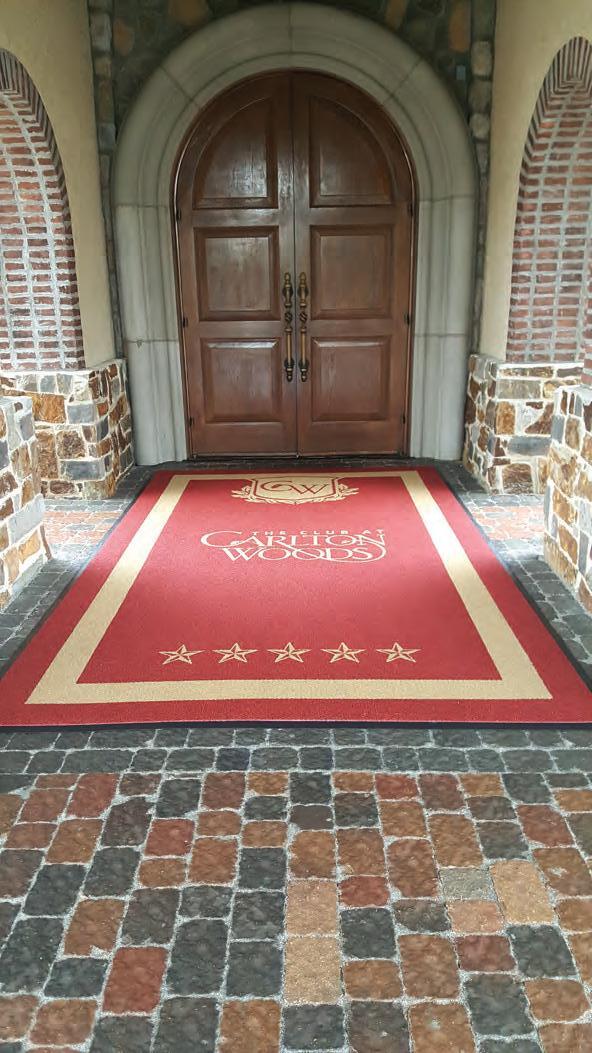













BOARDROOM
Nancy Berkley, green committee and marketing committee, Frenchman’s Creek Beach & Country Club, Palm Beach Gardens, FL
Bertrand Bouquin, director of culinary, Desert Mountain, Scottsdale, AZ
Kris Butterfield is director of membership, communications & public relations, Bethesda Country Club and president of PCMA.
Michael A. Chase, Jr., GM, Atlantic Beach Country Club, Atlantic Beach, FL
Jarrett Chirico, USPTA, PTR, PPTA, PPR, PPTR, director of racquets, Royal Oaks Country Club, Dallas, TX.
Mark Constantinou, GM, Westmoreland Country Club, Wilmette, IL
Ryan Cozzetto, GM, Wyndemere Country Club, Naples, FL
Charles “Chuck” Cramb, President, Wianno Club, Osterville, MA
Chris D. Crawshaw, President, Westmoreland Country Club, Wilmette, IL
Sheila Crump Johnson, CEO, Salamander Hotels and Resorts
Greg Devino, GM/COO, Broken Sound Club, Boca Raton, FL
Damon DiOrio, CEO, Desert Mountain, Scottsdale, AZ
Ron Drapeau, President, Wyndemere Country Club, Naples, FL
Jaime K. Eaton, President, Atlantic Beach Country Club, Atlantic Beach, FL
Brandon Johnson, club manager, Farmington Country Club, Charlottesville, VA
Dr. Bonnie Knutson, the Country Club of Lansing and the Michigan Athletic Club
Mark Krebs, GM, Wianno Club, Osterville, MA
David Lacey, two-term member of the board of governors, Philadelphia Cricket Club, Philadelphia, PA
Nancy Levenburg, member, Spring Lake Country Club, Spring Lake, MI
Ben Lorenzen, creative director and director of aquatics and fitness, Champions Run, Omaha, NE
Joseph Murray, president, Scioto Country Club, Columbus, OH
Kasey Patterson, director of fitness and aquatics, Farmington Country Club, Charlottesville, VA
Pamela Radcliff, SHRM-SCP, CAM, director of human resources, Hideaway Beach Club, Marco Island, FL
Duncan Reno CCM, CCE is the GM/COO at Del Rio Country Club
Darin Riggio, CHSP, director of sales and marketing, Innisbrook, Palm Habor, FL
Robert Sereci, GM, Medinah Country Club, Medinah, IL
Amanda Sprenger, director of food and beverage, The Country Club at Mirasol, Palm Beach Gardens, FL
Lindsey O. Tafolla, director of communications and marketing, Houston Racquet Club, Houston, TX
Greg Wolf, GM, Scioto Country Club, Columbus, OH
Check out the Golf Course Superintendents Association of America Podcast with Golf Course Management editor-in-chief Scott Hollister as he talks with some of the leading figures in the golf course management industry and tackles topics important to you.
Whether you listen on the golf course, during your daily commute or while catching a workout, make the GCSAA Podcast — presented in partnership with Bayer Environmental Science — a permanent addition to your playlist.
You can subscribe to the GCSAA Podcast on Apple Podcasts, Spotify, Stitcher or wherever you get your podcasts. You can also find episodes of the GCSAA Podcast on the GCSAA website at www.gcsaa.org/podcast.
Presented in partnership with Bayer Environmental Science.

Available on Apple Podcasts, Spotify, Stitcher, at GCSAA.org or wherever you get your podcasts.



